
After 50 years, Dassault Falcon Jet just getting started in Little Rock




For over 86% of Arkansas communities, everything we reach for was delivered by a truck.




After 50 years, Dassault Falcon Jet just getting started in Little Rock




For over 86% of Arkansas communities, everything we reach for was delivered by a truck.


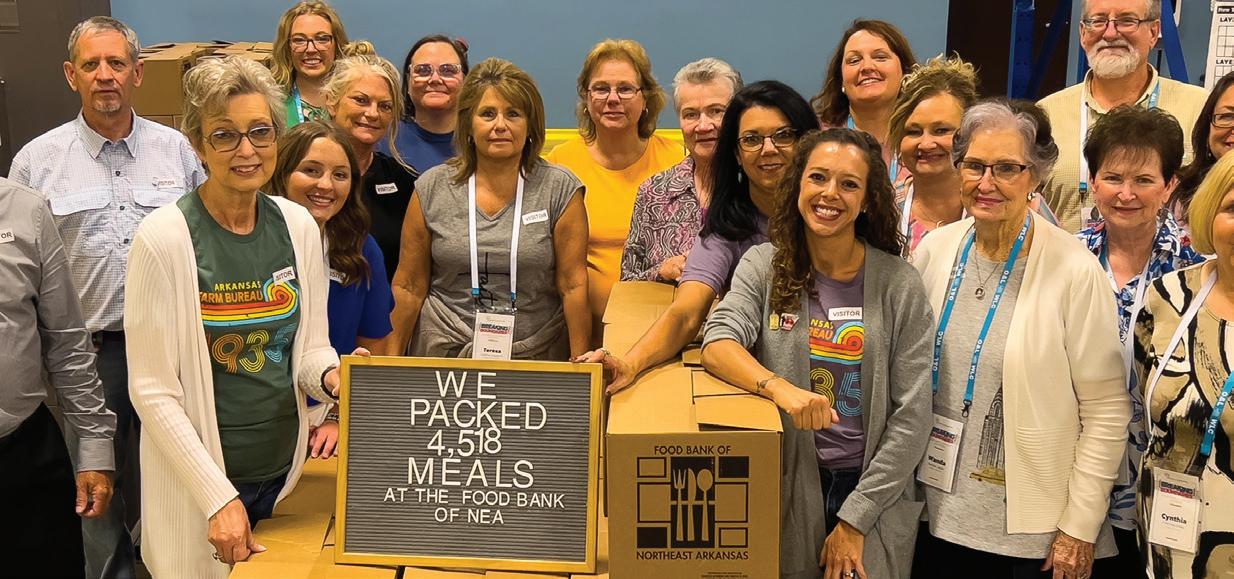
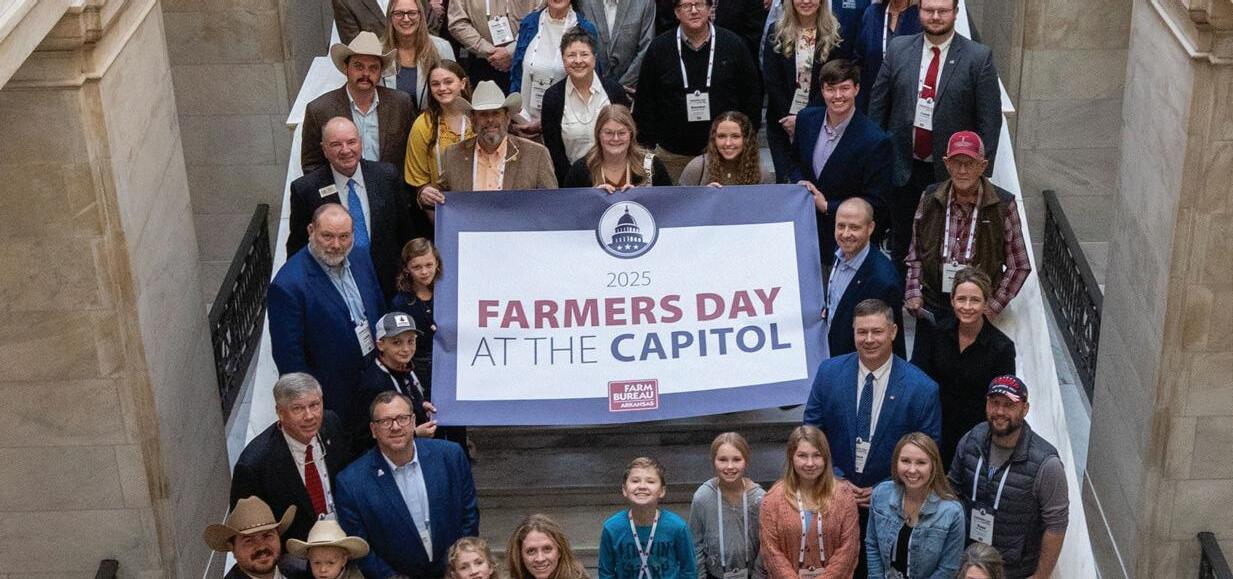


For more than 90 years, Arkansas Farm Bureau has lead the way in advocacy, leadership, rural development, community support and investment in the next generation of Arkansas agriculture. Our work is driven by the grassroots work of our members across all 75 Arkansas counties. Our work is driven by you.
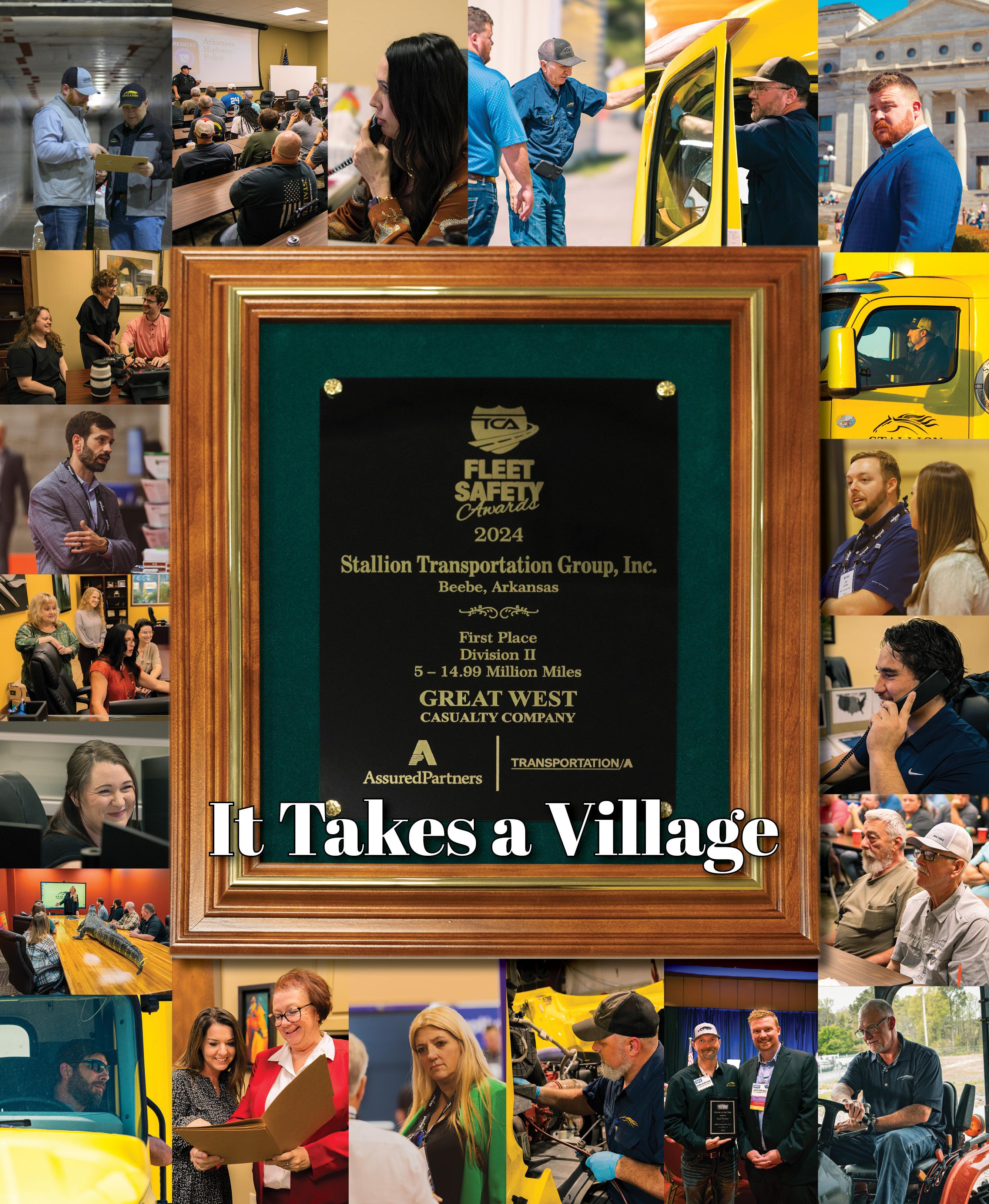

Arkansas is home to six airports that provide commercial passenger service, but smaller regional facilities deliver their own economic impact.

WOMEN IN AG
The profile of the American farmer is changing, starting with who is in the tractor driver’s seat. Women now represent nearly 40 percent of the nation’s producers.
MADE
Vince Signorelli saw an untapped market for pickleball equipment when he first learned about the sport. Now he makes pickleball equipment in Hot Springs.

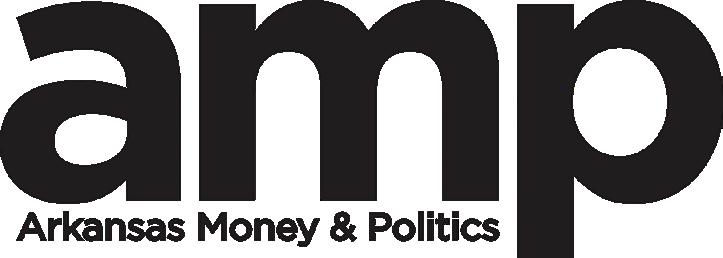
PRESIDENT & PUBLISHER
Heather Baker | hbaker@armoneyandpolitics.com
TRANSPORTATION/ AVIATION
Pulling its weight
The trucking industry in Arkansas continues to deliver the goods despite economic pressures such as driver compensation, lawsuit abuse, insurance costs and more.
Wanted: drivers and mechanics
The federal government projects 240,300 openings for truck drivers each year until 2033, along with almost 40,000 yearly openings for aircraft technicians and diesel mechanics.
Biking getting bigger
In 2022, biking contributed more than $100 million in revenue, supporting 743 jobs and generating $6.1 million in state and local taxes in NWA alone.
DVM factory?
When veterinary medicine schools open for Lyon College and Arkansas State University next year, Arkansas will have gone from no vet schools to two.
If one were to paint a true portrait of optimism, it would be of the American farmer against a backdrop of everything the family owns tied up in land, family and faith.
Rice and beans
For two of the state’s most important crops, strong 2024 yields were tempered by price pressures and politics in a trend that seems likely to continue.
Faces of Arkansas
In this special sales section, Arkansas Money & Politics recognizes many of Arkansas’ best businesses and the leaders who make them run.
The sweet sound of vinyl
Vinyl has been coming back for years, and Record Store Day annually results in lines around the block for local record stores, including those in Arkansas.
Picking Cotton’s mind
There was a time during U.S. Sen. Tom Cotton’s political career that it might have felt good to stand down. His time in Washington has paralleled the most divisive in decades.
Tim Griffin’s legacy (award)
Arkansas AG Tim Griffin will receive Junior Achievement’s Legacy Award, denoting induction into JA of Arkansas’ Hall of Fame, in recognition of his service to the youth of Arkansas.
Cue the screenplay
There is not a story in all of college baseball quite like what is happening at UAPB, where a cast of newcomers have converged with plans to spark a big turnaround.
Sober curious?
Studies say nearly half of Americans are trying to drink less alcohol in 2025. That is a 44 percent increase from 2023. Arkansas businesses are stepping up to meet the market’s needs.
EDITOR-IN-CHIEF
Dwain Hebda | dwain@armoneyandpolitics.com
SENIOR EDITOR
Mark Carter | mcarter@armoneyandpolitics.com
ASSOCIATE EDITOR
Mak Millard | mmillard@armoneyandpolitics.com
EDITORIAL COORDINATOR
Darlene Hebda | darlene@armoneyandpolitics.com
COPY EDITOR
Sarah DeClerk | sdeclerk@armoneyandpolitics.com
STAFF WRITERS
Doug Crise | dcrise@armoneyandpolitics.com
Alex Hardgrave | ahardgrave@armoneyandpolitics.com
MANAGING DIGITAL EDITOR
Kellie McAnulty | kmcanulty@armoneyandpolitics.com
ONLINE WRITER
Kilee Hall | khall@armoneyandpolitics.com
PRODUCTION MANAGER
Mike Bedgood | mbedgood@armoneyandpolitics.com
GRAPHIC DESIGNERS
Jamie Davis | jdavis@armoneyandpolitics.com
Jenna Kelley | jkelley@armoneyandpolitics.com
Lora Puls | lpuls@armoneyandpolitics.com
SENIOR ACCOUNT EXECUTIVE
Greg Churan | gchuran@armoneyandpolitics.com
ACCOUNT EXECUTIVES
Michelle Daugherty | michelle@armoneyandpolitics.com
Mary Funderburg | mary@armoneyandpolitics.com
Karen Holderfield | kholderfield@armoneyandpolitics.com
Becky McGinley | becy@armoneyandpolitics.com
Dana Rodriguez | dana@armoneyandpolitics.com
EXECUTIVE ASSISTANT
Jessica Everson | jeverson@armoneyandpolitics.com
ADVERTISING COORDINATOR
Allison Runyon | ads@armoneyandpolitics.com
CIRCULATION circulation@armoneyandpolitics.com
ADMINISTRATION billing@armoneyandpolitics.com
CEO | Vicki Vowell TO ADVERTISE call 501-244-9700 email hbaker@ armoneyandpolitics.com
TO SUBSCRIBE armoneyandpolitics.com/subscribe
CONTRIBUTORS
Sarah Oden, Kelli Reep, Jason Burt, DeWaine Duncan, Joe Jacobs, Steve Lewis, Chris Wright

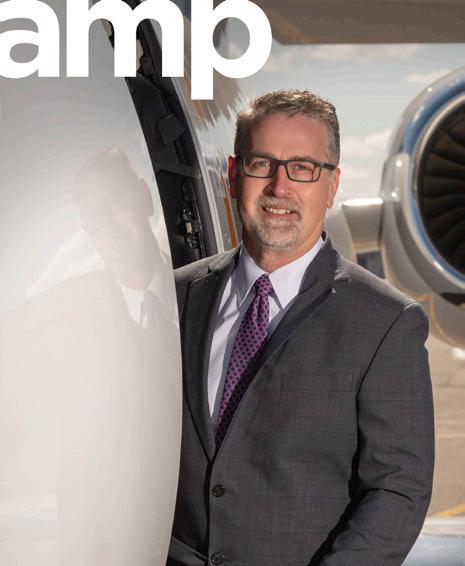
Photographer Steve Lewis photographed Mark Bremer of Dassault Falcon Jet and the Arkansas Aerospace and Defense Alliance at Dassault’s Little Rock completion center for the April cover.
See story, page 10.
GEORGE FAMILY DONATES $1M TO ARKANSAS CHILDREN’S HOSPITAL
The Georges are wonderful people. Every last one of them. I was blessed to have worked for them at one point in my career. Thank you to all.
Bob Davenport
NORM DEBRIYN TO RECEIVE LEGENDS AWARD FROM BURLSWORTH FOUNDATION
Very much deserved. Legendary leader.
Ann Owens
MASON NAMED TO RONALD MCDONALD HOUSE GLOBAL BOARD
I volunteered a few times at RMH and cooked for the residents, set and talked to the people. Absolutely amazing experience. Highly recommended.
HOSS Loudermilk
2025 AMP C-SUITE — ROB HEFLEY, MORE THAN BUSINESS AS USUAL
Great Guy!
Justin Martin
JA TO HONOR TIM GRIFFIN, RELYANCE BANK AT HALL OF FAME BUSINESS LUNCHEON
Thank you Arkansas Money & Politics for spotlighting and supporting our Hall of Fame Honorees! Junior Achievement of Arkansas
SMALL & ASSOCIATES REBRANDS AS SMALL WEALTH MANAGEMENT
Thank you for sharing! We are excited for this new chapter!
Small Wealth Management
BOWEN SCHOOL OF LAW TAPS ALUMNA MOLLY MCNULTY FOR KEY LEADERSHIP ROLE
Congratulations & best wishes, Molly! You’ll bring much enthusiasm & energy to the school, faculty, students & community in your new role!
Bill Puddephatt
March 3 — April 6
1 Arkansas Auto Dealership Wins $18M Lawsuit Against Ford
2 Arkansas Governor’s Signature Makes OTC Ivermectin a Reality
3 Mississippi Legislature Eliminates State Income Tax
4 Tom Tangles with Tucker — Cotton Clashes with Commentator
5 ICE, DOGE Efforts Reach Arkansas
6 Reports: Former Hog Great Oliver Miller — the ‘Big O’ — Dead at 54
7 Gusty Winds Cause Power Outages, Fires Across Arkansas
8 Clinton Foundation to Buy Heifer International HQ Building
9 The 67th Annual Arkansas Sports Hall of Fame Inductees
10 NLR Landmark St. Joseph Center Heavily Damaged in Fire
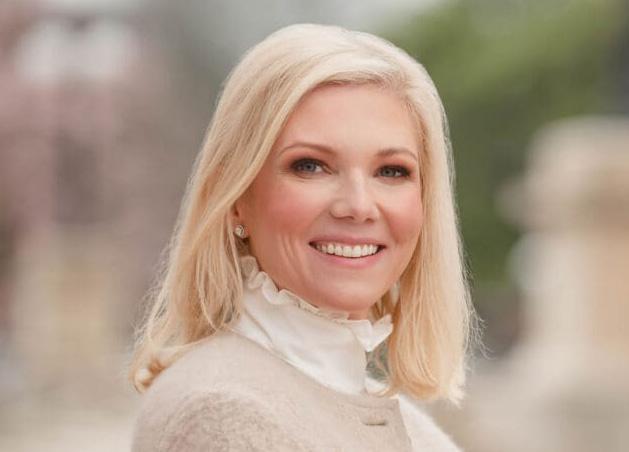

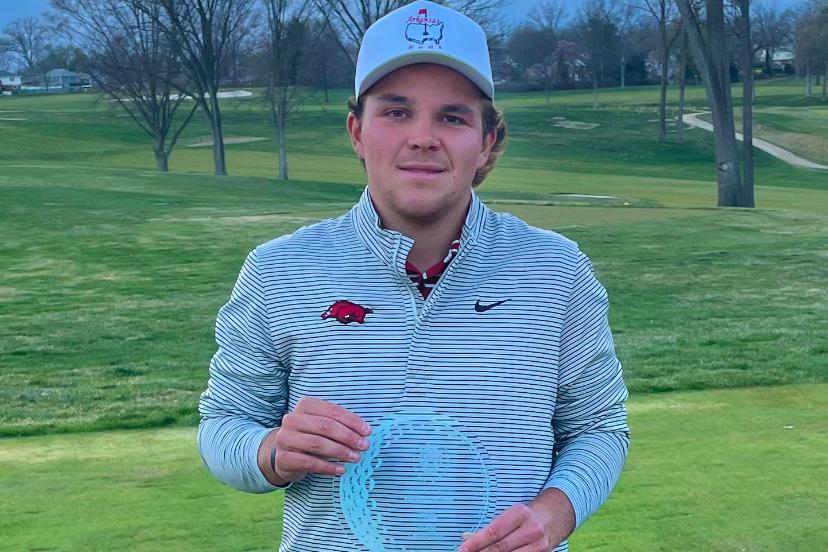
By Mark Carter
Artificial intelligence has infiltrated my email, Google now intent on giving me the option of letting its algorithms do the work for me. While that is likely preferable in my case, it makes me wonder when mankind will draw a line in the sand and remember that automation is a perilous gift and nothing truly worthwhile comes without exertion.
The concept of AI as ghostwriter made me reflect on a blog post from author Barnabas Piper in which he collected 30 pieces of writing advice from the great Christian apologist and writer C.S. Lewis.
I won’t share all 30, but here are a few good ones:
• Don’t use words too big for the subject. Don’t say “infinitely” when you mean “very.” Otherwise, you’ll have no word left when you want to talk about something really infinite.
• No man who values originality will ever be original, but try to tell the truth as you see it. Try to do any bit of work as well as it can be done for the work’s sake, and what men call “originality” will come through.
• The more abstract the subject, the more our language should avoid unnecessary abstraction.
cerning the original sporting nickname for the University of Arkansas.
As most Hog fans know (or should), the UA’s mascot was not “Razorbacks” until 1910 (Hugo Bezdek and all). Among

• Every sentence should be tested on the tongue to make sure that the sound of it has the hardness or softness, the swiftness or languor which the meaning of it calls for.
Perhaps Gemini — or Alexa, Watson or Siri (Am I missing anybody?) — tests its sentences on the digital tongue before crafting our messages. Whatever the case, any entity, biologic or otherwise, stringing together words for work or play would be wise to heed Mr. Lewis’ advice.
***
A bit of housekeeping: Recently, I finally found documented proof con-
TRazorback Nation, it was generally assumed that the previous mascot was a cardinal, but I always suspected this was not the case, and the Arkansas Alumni Association confirmed my suspicions. The university mascot/nickname prior to 1910 was the Cardinal, singular, in recognition of the school color — and not for the bird. Thank goodness UA students voted early on to adopt cardinal over heliotrope (think Kansas State’s alternate basketball unis) as the school color. So to Stanford, we say, “You’re welcome.”
By Heather Baker
hey say the older one gets, the faster time flies. Ain’t that the truth? We were just celebrating Christmas and digging ourselves out from under 10 inches of typical Arkansas February snow a couple of weeks ago, right?
Spring, however, has sprung, and April always seemed to me the perfect issue for aviation and transportation. The infinite, bright horizon of spring lends itself well to transportation — in a plane, in a car with the windows rolled down, in a boat on the lake…
Arkansas Money & Politics’ April issue features transportation and aviation, as well as agriculture, another strong Arkansas industry that lends itself well to spring and the wild blue yonder. Inside, readers will find stories about programs that train pilots and truck drivers, the economic impact of local airports, the continued rise of biking in the state and Dassault Falcon Jet’s 50 years in Little Rock. We also talk to

Arkansas trucking companies about the state of the industry.
Moving over to the farm, we visit with the Arkansas Farm Bureau, the Poultry Federation and the folks behind the amazing poultry science work being done on the hill at the University of Arkansas in Fayetteville. We also talk to the officials behind the state’s two planned new veterinary schools, as well as generational farmers and prominent women in Arkansas agriculture.
Elsewhere, we look at how one baseball coach has made a personal investment in remodeling the UAPB baseball program, how Arkansas plays an important role in the growth of pickleball and how the Forge Institute in Little Rock is helping with our nation’s defense. Plus we’ve got columnist Rex Nelson and Arkansas Attorney General Tim Griffin, U.S. Sen. Tom Cotton and U.S. Rep. French Hill. What more could one ask for?
As always, thanks for reading. Hit me up with comments or story ideas at hbaker@armoneyandpolitics.com.
By Chris Wright
Is artificial intelligence the new and not-so-secret weapon for businesses? Perhaps. What if a company is short on staff and constantly inundated with customer requests? An AI chatbot could help it field queries without additional personnel costs.
Consider a small marketing team that needs a straightforward e-newsletter graphic but lacks the bandwidth to design one. In seconds, ChatGPT could deliver a file. Or think of increasingly remote workplaces where task-management software keeps teams aligned without the headache of scheduling multiple calls. Capitalizing on readily available, often affordable AI tools seems like a no-brainer in such cases.
But should companies uniformly integrate AI technology into every internal process? Of course not. As Forbes recently shared, AI has become a “buzzword, marketing gimmick and a financial frenzy all rolled into one.” With the near-daily headlines and advertisements reiterating the technology as “revolutionary” and “transformational,” it is easy for organizations to want or feel pressured into the AI hype. However, companies should remember that the potential benefits of AI-powered tools do not always come without cybersecurity drawbacks. That is why due diligence is essential.
should focus on strategic cybersecurity risk management, ideally with the support of a third-party expert who understands industry best practices and standards. Before implementing any AI software, organizations should ask themselves, “How does using this tool align with our broader corporate ambitions?”
IBM reinforces the significance of this strategy, stating, “Having a well-defined purpose and plan will ensure that the adoption of AI aligns with the broader business goals.” In short, entities should question if they are using the tool because it is cool and innovative or because it will provide real value.

Chris Wright
Despite what the marketers might say, AI is not magic. It’s software. The public interest in the technology is undeniably reaching a near-fever pitch. Statista recently predicted that the AI market in the U.S. will likely reach nearly $223.7 billion by 2030 due to continued corporate investments. In a recent survey, PwC found a third of technology leaders said AI was now fully integrated into their products and services, and that share is only expected to grow. In the same report, however, PwC noted that “not every [AI] promise will pan out,” stressing that achieving a return on investment depends on whether the companies implementing it practice “responsible AI.”
Several years ago, the Economist boldly claimed that data should now be considered one of the world’s most valuable resources, so it should go without saying that we must practice care in handling it, including rigorously evaluating the AI software that often relies on our data to operate. If not, as Forbes pointed out, we may end up “blindly feeding personal and corporate data into systems with security weaknesses” or inputting “with zero transparency about where the data goes and how it’s being used.”
How can companies practice responsible AI? Businesses
If companies determine AI software will deliver ROI, they must thoroughly evaluate its security and data privacy requirements. That includes addressing basic questions such as “Where will the data be stored?” or “Who will have access to it, and how is it protected from possible bad actors and public use?” Equally important, businesses must educate users — from senior leadership to entrylevel employees — about the latent risks of using AI software to ensure robust cybersecurity governance. This step is increasingly vital because external stakeholders, including customers and partners, require it. As PwC says, “If AI isn’t trusted by stakeholders, if it’s subject to a cyber breach or other risk issue … your company will take a hit.”
The bottom line? Companies must demand rigorous AI security for business continuity.
If industry projections are any indication, there is no end to the growing adoption of AI in sight. Will businesses stand to gain from its advantages? There is no question, particularly when it comes to delivering workplace efficiencies, but using AI is not without cybersecurity risks.
Before jumping in headfirst and utilizing what could be unvetted platforms or tools, organizations must assess and evaluate the possible risks, educate and equip their employees to avoid threats, and, ideally, hire a trusted cybersecurity expert to help manage and oversee the process. With due diligence, companies can reap the potential benefits of AI while safeguarding their data and their businesses’ future.
Chris Wright is co-founder and partner at Sullivan Wright Technologies, an Arkansas-based firm that provides tailored cybersecurity, IT and security compliance services. Email him at chris@swtechpartners.com.
By AMP Staff
It is understandable if some view agriculture as an industry reliant mostly on sun, soil and rain — resources nature provides. Yet as the need for global food security increases and with acres of farmland disappearing, precision agriculture has become a major high-tech industry.
Agriculture is Arkansas’ single largest industry, contributing nearly $21 billion annually to the state’s economy and creating or supporting more than 235,000 jobs. Arkansas ranks first nationally for rice production, fourth for cotton and 11th in soybean production, making the state ideal for fostering the growth of precision agriculture.
What is precision agriculture? Generally, it is a term to describe farming tools based on observing, measuring and responding to within-field variability via crop management. Economically speaking, precision agriculture is an $8.5 billion industry spanning components, hardware, software and applications that has a predicted annual growth rate of 11.9 percent. As one of the nation’s primary leaders in ag production, Arkansas is uniquely positioned to leverage that growth opportunity from seed to harvest.
Examples of Arkansas research supporting precision agriculture initiatives are many. At Arkansas State University in Jonesboro, Argelia Lorence’s lab houses 310 different kinds of rice seeds. As a plant biochemist, she is attempting to locate genetic rice strains hearty enough to produce high yields amid rising nighttime temperatures — a result of climate change that can significantly reduce crop production.
Another example, at the University of Arkansas at Pine Bluff, is Rebecca Lochmann’s work to protect Arkansas’ thriving aquatic industry. Her research addresses the interaction between nutrition, growth, stress resistance, immune responses and product quality for multiple fish species of commercial importance. The intersections between lab research and agriculture present an opportunity for industry to explore precision agriculture from where the field is most fertile.

Because agriculture is such a driver of Arkansas’ economy, it is not surprising that the state’s major research institutions and its large agricultural, food and forestry value chain are focusing on increasingly smart and data-driven approaches to optimizing agricultural production and processing. Modern farmers and agricultural producers are adopting precision agriculture technologies and approaches on a macro level to address food security, environmental sustainability and climate resilience, food quality concerns and market competitiveness. At the same time, farmers are driven on a micro level to enhance profitability and market competitiveness and address workforce and talent shortages on their own farms.
Therefore, it is no coincidence that Arkansas has a large and leading base of crop, animal and timber production industries that can and should leverage precision agriculture technologies. As of March 1, several ag-biosciences companies are advancing innovations in crop sciences in Arkansas, generating new intellectual property in the form of patent awards that include at least one Arkansas inventor. The companies include Syngenta, Bayer Crop Science, Mertec and BASF Agriculture Solutions.
To learn more about the Arkansas growth opportunity, see the latest report from TEConomy Partners, Enabling an Innovation-Led Future for Arkansas: University Research Competencies Aligned with Industry Growth Opportunities, which outlines the growth opportunity in detail. The report is available free to download at aralliance.org/resources.
By Sarah DeClerk

CELEBRATING 50 YEARS, DASSAULT FALCON JET LOOKS TO STAY ON LEADING EDGE OF AVIATION INDUSTRY

Situated on an immense campus at the Bill and Hillary Clinton National Airport in Little Rock is Dassault Falcon Jet. At 1.25 million square feet, the facility is one of the largest Dassault sites in the world, and it is the company’s only completion center.
Now celebrating its 50th anniversary, the facility is entering a new chapter as it prepares for the arrival of the first Falcon 10X and the untold number of challenges and opportunities the future may bring.
“It’s amazing what we’ve done, the products that we have today, the history that we have,” said Mark Bremer, vice president of industrial programs at Dassault Falcon Jet in Little Rock and president of the Arkansas Aerospace & Defense Alliance. “It’s going to be exciting what happens in the next 50 years.”
The history of Dassault stretches back to the early 1900s, when founder Marcel Bloch invented the Éclair propeller in France. When the country was occupied by Germany during World War II, Bloch refused to cooperate with Nazis and was sent to a concentration camp. When he was released, he received his wallet and found he had left in it a four-leaf clover.
“That became his talisman,” Bremer said. “If you look at our logo, you see it’s shaped like an airplane. It has the opening in the bottom for new ideas to flow in and out of our company, and it has his talisman, the four-leaf clover.”
Bloch changed his last name to Dassault after the war.
The Falcon debuted more than 60 years ago. Then called the Mystère 20, it became the aircraft of choice for Pan Am after Charles Lindbergh saw the plane in Paris and famously said, “I’ve found our bird.”
Over the past 50 years, Dassault has delivered more than 2,600 Falcons, most of which were finished at the Little Rock site.
“What we do here in Little Rock is really give the aircraft its personality,” Bremer said. “We give it the exterior paint. We do all the cabinetry work, all the interior, all the soft goods, all the specification the customer wants inside the aircraft.”
Dassault purchased the facility in 1975, but the site has been used for aviation since the
1960s, when financier Jackson T. Stephens Sr., tired of traveling to the Kansas City area to have his plane serviced, founded Little Rock Aeromotive at the location. FedEx also got its start at the facility and utilized the Falcon 20.
Bremer noted the legacy of aircraft completion activity in Little Rock, where companies such as Arkansas Modification, Mid-Coast Aviation, Central Flying Service and Little Rock Aeromotive bought green, or unfinished, aircraft from not just Dassault but Gulfstream, Bombardier and others to complete in Little Rock.
The Dassault Falcon Jet completes the Falcon 2000, Falcon 900 and Falcon 8X and delivered the first Falcon 6X last year. In December 2023, the company announced an expansion to accommodate the forthcoming Falcon 10X.
“It’s becoming a real airplane, and we’re excited by it,” Bremer said.
In addition to the Falcon, Dassault Falcon Jet’s parent company, Dassault Aviation, also produces the military aircraft Rafale, the technology of which is integrated into the Falcon.
“Our aircraft take the benefit of the DNA that’s in the Rafale to make our business aircraft the first to have digital flight controls and the first to have heads-up display,” he said. “That technology really makes our aircraft technically advanced.”
In addition, like the fighter plane, the Falcon is flown using a sidestick, rather than a yoke. All the screens and avionics are digital and utilize a mouse-type controller to
— Mark Bremer, Dassault Falcon Jet “
It’s amazing what we’ve done, the products that we have today, the history that we have. It’s going to be exciting what happens in the next 50 years.

High-tech features of the facility include a laser system that allows customers to see the exterior graphics of the plane before it is painted and computer numerical control machining centers that run “lights out,” meaning workers can preprogram machines to produce parts overnight and on the weekends.
make inputs to functions and changes to displays.
“Having digital flight controls, having the ability to make inputs by clicking on the screen really makes the load on the pilots much easier and much safer,” Bremer said, “and we have heads-up display, which folds down, and they can see through headsup all the instrumentation without looking down into the cockpit.”
High-tech features of the facility include a laser system that allows customers to see the exterior graphics of the plane before it is painted and computer numerical control machining centers that run “lights out,” meaning workers can preprogram machines to produce parts overnight and on the weekends.
Dassault Group even has its own software company, Dassault Systèmes, that produces CATIA, the software used to design Dassault aircraft.
Coupled with that technol-
ogy is the skilled labor that transforms leather hides and wood veneer into the luxurious upholstery and cabinets that furnish the Falcon.
“You can have all the technology you want, but at the end of the day, it gets down to the people doing the work,” Bremer said. “We combine technology with the skills of our craftsmen and artisans to produce our world-class aircraft.”
He noted the interplay between the advanced technology and natural materials used to manufacture the Falcon interiors. Dassault Falcon Jet imports the leather for its upholstery from Europe, where the hides are of higher quality because cattle are not exposed to branding, barbed-wire fences and insects. The company only uses bull hides because bulls are larger and cows may have stretch marks from calving.
Even then, the hides have imperfections that are marked by workers before the leather is placed onto a CNC machine, which cuts around the marks when making patterns. The cut leather is sewn together at the facility to craft seats, divans and other furnishings unlike any most commercial airline customers have ever experienced.
“It’s just beautiful,” Bremer said. “The stitching, the way everything’s shaped, the way our artisans craft our seats is world class.”
The same attention to detail goes into the cabinetry of the aircraft, starting with the wood, which is sourced from around the world.
“Every tree is like you and me. It’s unique. It’s a living thing that grows,” Bremer said. “Depending on where it grows in the world, it can be the same species, but it grows in one area versus another, and the minerals in those soils are different, and those minerals come up into the trees, and so those are some of the things we must evaluate.”
Although the finished cabinets look and feel as solid as any one might find in an executive boardroom, they are made using high-tech materials that are designed for flight and use an aluminum honeycomb design that is both strong and featherlight.
Even more surprising is the unseen network of electric, plumbing and ventilation systems crisscrossing the back of the cabinets.
The cabinets are built on a fixture that slides into a mock-up of an aircraft known as a cabinet-integrated bench, or CIB, which
Falcon Jet is planning numerous activities to celebrate its anniversary, including a company-wide competition to design the 50-year logo, as well as various internal events and external promotions.
allows workers to ensure a good fit prior to installation in the aircraft. There are about 16,000 individual parts that go into a set of cabinets for a Falcon 8X, Bremer said.
After the aircraft are finished, a flight test team “cold soaks” the planes by taking them on a five-hour test flight to ensure everything works properly at altitude and after returning to the ground.
The finished product is luxurious to say the least, offering a roomy cabin with high-end cabinetry and seating for 10 to 14 passengers. The 10X is set to be larger than the 6X, boasting a 110-foot wingspan, and it is designed to imitate the feeling of a home, providing more defined spaces for kitchen, dining, recreation and sleeping.
“A lot of people think our customers are wealthy people who are just using it for their own pleasure. That’s not true,” Bremer said. “Our aircraft are business aircraft, and they’re used for many different types of corporations around the world, heads of state and individuals. I don’t know if you’ve flown lately, but it’s difficult to get anywhere anymore, especially a direct flight out of Little Rock.”
He added that flying from Little Rock to Wichita, Kansas, which is 450 miles away, could take six or seven hours using commercial airlines.
“Our customers can leave here and get there within an hour, hour and a half and be doing business,” he said. “Not only that; they can be doing business while they’re flying because we have satellite communication. They have connectivity, they have internet access, everything they need to run their business, so it’s really a tool.”
Furthermore, he said, because Falcons are among the quietest aircraft in the industry and have a highly sophisticated pressurization system, travelers are not as tired when they land and can get to work immediately.
Company loyalty runs high, he said, adding that the some 1,800 Little Rock team members take pride in their work at Dassault Falcon Jet.
“We say we’re part of the Falcon family, and that’s true,” he said. “We work together. A lot of people are friends here outside of work. It’s a family-owned business still today. It’s owned by the Dassault family, and it’s remarkable how much pride our people have in what they do, so you’ll see people outside of work wearing their Falcon hats and their T-shirts and all that out in the community, and I think that we’re good stewards of the community.”
Dassault Falcon Jet is planning numerous activities to celebrate
its anniversary, including a company-wide competition to design the 50-year logo, as well as various internal events and external promotions.
The company receives plenty of support from the community, the state and city chambers of commerce, and the Arkansas governor’s office, he said, adding that the state has a business-friendly environment.
He noted that aerospace and defense is the state’s largest export, and there are 200 aerospace and defense companies in Arkansas.
“Our aircraft touch the globe, coming out of Arkansas,” he said. “At any given time, there’s a piece of Arkansas flying around the world on all the various continents, so that’s a huge impact.”
Bremer added that he is excited about the industry’s next 50 years, especially given advancements in drone technology, electric vertical takeoff and landing, private aircraft, space travel and more.
“It’s changing so dramatically,” he said. “For us, we have our fighter technology, which drives a lot of our technology. We have the 6X that we just started delivering last year. We have the 10X coming, so I’m just excited about what that’s bringing and how that’s changing what we offer in both the technologies and just an amazing aircraft that we’re going to produce.”
To meet the workforce needs of the future, the state has provided industry-led grants to support aerospace programs at the University of Arkansas-Pulaski Technical College in North Little Rock, Arkansas State University Three Rivers in Malvern and Southern Arkansas University Tech in Camden.
Equally important, Bremer said, is ensuring young people are aware of the opportunities available to them if they pursue skilled trades. Dassault has a number of entry-level jobs that allow employees to grow within the company, he said.
“Yes, we need pilots, we need the engineers, we need leadership people that have degrees and advanced education, but there’s a huge amount of jobs ... that don’t require that, but they do require high-tech knowledge and hightech training to be able to do what they do. In return, they’re paid well for that,” he said. “Companies like us and others have great benefits, and so it’s not just you’re going to work for somebody as a job; this is a career, and it’s an amazing career. I mean, what’s cooler than making airplanes?”

Whether for business or pleasure, local airports pack economic punch
By Mark Carter
Arkansas is home to 98 public airports, eight with commercial passenger service. The rest are considered “general aviation” airports and include all aspects of civilian flying outside of scheduled commercial flights. GA airports support a wide range of activity, including business and recreational travel, aerial firefighting, air medical flights, air cargo flights, agricultural support, law enforcement operations and disaster relief.
The airstrips play an important role in the state and national economies and provide critical access to remote communities otherwise cumbersome to reach. In Arkansas, they account for an estimated annual economic boost of $468 million, the National Business Aviation Association states.
Nationally, general aviation delivers an estimated $246 billion impact and 1.1 million jobs, while business aviation at smaller, local airports contributes roughly $150 billion to the U.S. economy and an estimated 1.2 million jobs.
Dave Krutsch, airport manager at Rogers Executive Airport, said GA airports not only have a positive economic impact, but they represent an integral component to airport systems across the state, region and country.
“Many prospective economic site consultants view the availability of safe and efficient airports and air transportation facilities as a top 10 criteria when evaluating potential development sites,” he said. “We are blessed in northwest Arkansas with several great airports, and this has no doubt played an important part of the region’s growth.”
The National Plan of Integrated Airport Systems lists 3,287 airports in the United States. Just 11 percent — 390 of them — support scheduled commercial passenger service. Arkansas is home to two “national” airports with multiple direct flights to cities across the U.S. — Bill and Hillary Clinton National in Little Rock and Northwest Arkansas National in Bentonville — and six regional airports that offer commuter flights to neighboring hubs — Fort Smith Regional, Texarkana Regional, Boone County Regional in Harrison, Hot Springs Memorial Field, Jonesboro Municipal and South Arkansas Regional in El Dorado.
Both Clinton and XNA saw more than 2 million total passengers in 2024, back up to pre-COVID-19 levels, but it is the smaller strips like Rogers Executive that play a crucial role in their communities.
“Business aviation helps companies increase efficiency and productivity, gain a competitive advantage, provide time-critical access to key remote locations, and, ultimately, to improve their bottom lines,” Krutsch said.
Local airports serve as key gateways to commerce, opportunity and global connectivity, said Jerry Chism, director of the division of aeronautics at the Arkansas Department of Commerce.
“Their economic impact is immense and cannot be overstated,” he said. “In the past, communities competed on a local scale
to attract and retain businesses. Today, that competition has expanded to a global stage, making access to international markets and opportunities more important than ever.”
Like many in the industry, Chism likes to remind listeners of the old quip, cliched but true: “While a mile of highway takes you a mile down the road, a mile of runway can take you anywhere in the world.”
Chism said smaller GA airports are important links in the global travel chain, providing access to the world and economic growth through tourism, recreation and commerce.
“Arkansas is home to 90 public airports, each making a positive economic impact in its community,” he said. “These airports support economic growth by facilitating commerce and tourism, strengthening local businesses, and enhancing regional development. Their impact extends far beyond the runway, helping Arkansas thrive in an increasingly interconnected world.”
Chism’s job is to guide his team in the development and enhancement of the state’s airports. The division of aeronautics oversees the State Airport Aid Program, which distributes grants to support vital infrastructure improvements.
“Arkansas’ airports are among the best in the nation, and we take great pride in their success,” he said. “The program plays a vital role in maintaining their excellence, helping to strengthen our aviation network and support the state’s growth.”
This time of year, traffic starts to pick up at Heber Springs Municipal Airport. Manager Charlie Evans said activity picks up in the warmer months as vacationers and outdoors enthusiasts fly in from across the state and region to recreate at Greers Ferry Lake or the Little Red River, which is world famous for its trout fishing.

GA airports like Rogers Executive Airport, above, represent an integral component to airport systems across the state, region and country. (Photo courtesy of Rogers Executive Airport)
“We’re an easy commute for a small airplane,” he said. “It’s less than an hour from Memphis and about an hour and a half from Dallas or St. Louis.”
The Heber Springs airport is a certified Federal Aviation Administration repair station with jet and aviation fuel available 24/7. Its roughly 4,000-foot runway accommodates single and multiengine planes, which Evans noted are almost all American made.
“There are few planes foreign built anymore,” he said.
The city-owned airport has seen recent improvements, he added, including runway and taxiway expansion, the addition of LED lights, and GPS approaches for each end of the runway.
Down in Jefferson County, Doug Hale’s journey to managing Pine Bluff Regional — the historic Grider Field — 20 years ago was one of the full-circle variety. His father a pilot, Hale grew up at the airfield. He remembers riding his dirt bike on the grounds and being run off by one of the former airport managers.
Pine Bluff enjoyed commercial air service from 1947 to the late 1980s or early 1990s, Hale said. These days, business revolves around private, corporate and military flights. Often, Pine Bluff serves as a way station for travelers flying long distances in smaller planes or jets or pilots simply dodging bad weather.
“We’re a perfect fuel stop, and we receive visitors who stay overnight,” he said. “Our primary purpose is business. Union Pacific and both paper mills [global producers Suzano and American Kraft], they all use our airport. We keep a courtesy vehicle at the airport. You never know who’s going to fall out of the sky.”
Over the years, “falling stars” who touched down in Pine Bluff have included Elvis Presley, Hillary and Bill Clinton, Jerry Jones, Michelle Obama, Reese Witherspoon and Ashley Judd. One falling preacher fell out of the sky into the woods a few miles south of the airport in February. He was flying his 1981 twin-prop Beechcraft 58P back home to Texarkana from an engagement in North Carolina. He walked away without a scratch, but the plane was totaled.
Hale was one of the first officials on the scene the night the plane went down and then, again, the morning after. He said the Pine Bluff staff tries to focus on good customer service, and Hale led by example. He said the exceptional service extends to the acclaimed Grider Field Restaurant, which he called “the best of any airport.”
Grider Field was commissioned in 1941 as a primary World War II training base. Hale said more than 10,000 war pilots received their wings at Grider, which boasts a 6,000-foot-long runway. These days, the airport still plays host to some military traffic, but it mostly sees business-related traffic, followed by recreational. The airport also plays host to formation flying clinics, Black Pilots of America clinics and women’s Air Race Classic events.
Hale called it unfortunate that smaller airports can sometimes be looked upon as “a playground for the rich with their toys” and stressed that nothing could be further from the truth.
“We are contributing to the local tax base,” he said. “A runway is like an interstate or a highway. It has all kinds of uses. Local airports serve their communities in many ways.”
In Rogers, the airport is not a haven for executives as its name suggests, though many C-suiters pass through its terminal. It serves the city in multiple ways, as well. Krutsch said it is a dynamic GA airport that serves the domestic and international air transportation needs of the city and region. In a metropolitan area home to multiple Fortune 500 companies and their global vendors, the services provided at Rogers Executive Airport are in high demand.
“While business aviation accounts for the majority of the airport’s activity, Rogers Executive Airport is also the gateway for many visitors to area attractions,” Krutsch said. “The airport pro-

vides support for important community services such as aeromedical flights, search and rescue missions, recreational travel and tourism, and occasional support for military, law enforcement and emergency response.”
Infrastructure catch-up is the name of the game in northwest Arkansas, which remains one of the nation’s fastest growing metros after experiencing hypergrowth for the last three decades. The U.S. Census Bureau even projected that the NWA metro, which had an estimated population of 600,000 in 2023, would surpass central Arkansas, which has roughly 750,000 people, in population by 2050.
Krutsch said the Rogers airport is not immune from the need to stay ahead of the game. Accelerated expansion plans are in the works, he said.
“The Rogers Executive Airport remains focused on accelerating expansion plans to accommodate the region’s growth, including the growing demand for aircraft storage capacity,” he said. “A number of new hangars have recently been completed or are in some stage of design and/or construction.”
Back at the state’s division of aeronautics, Chism said Arkansas’ smaller commercial airports and GAs will continue to play a vital role by helping bridge the gap between rural areas and the rest of the world and showcasing the state as a place to do business.
“This connection not only enhances accessibility but also fosters business growth, particularly in regions without direct access to major commercial air service,” he said. “Airports play a crucial role in driving economic growth for our state, acting as the front door to cities — and you never get a second chance to make a first impression.”
Chism said local communities must have well-maintained, accessible airports to attract new companies or support the growth of existing ones.
“When corporate executives visit a community to consider a location there, they’re not coming on a Greyhound bus — they’re flying in,” he said. “A strong airport system is absolutely critical to attracting and retaining businesses that will help ensure a strong Arkansas economy and our role in the worldwide marketplace.”
By Mak Millard
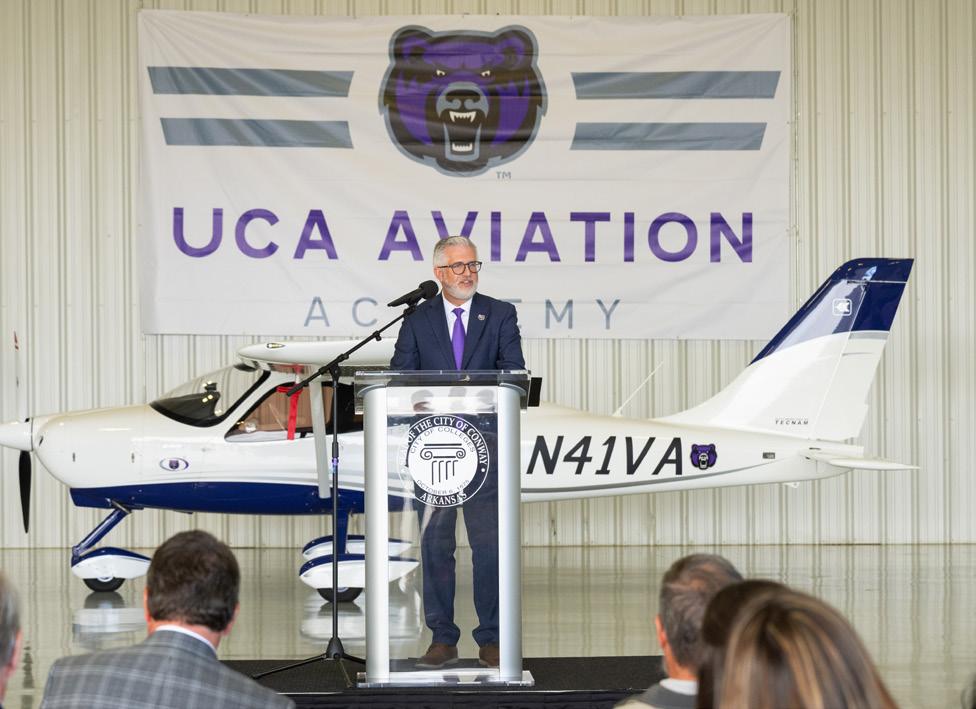
While only officially announced in 2023 and launched March 2024, the new Aviation Academy at the University of Central Arkansas in Conway is several years in the making.
“We talked about an aviation program at UCA for probably a decade, and anytime whichever president we had at the time would say something about aviation, they would pull me in because I was the pilot on campus,” said Brad Teague, who served for 17 years as the university’s athletic director before becoming full-time director of the Aviation Academy last year. “I was involved in the discussions every time.”
The UCA Aviation Academy could hardly arrive at a better moment. The U.S. Bureau of Labor Statistics projects about 18,500 openings for airline and commercial pilots each year on average from 2023 to 2033. Facing a favorable mix of post-COVID-19 pilot shortage and growing interest in four-year degree alternatives, the program’s early success has been further helped by major airlines dropping degree requirements.
“Little did they know that aviation and flying would come back greater than it was prior to COVID,” Teague said of the airlines. “That’s what happened. The retirement age is 65 for commercial airline pilots, and they were doing incentives to get people to retire early. Now, all of a sudden, it’s 2022, people
are flying more than they did in 2019, and there are not enough pilots.”
The UCA Aviation Academy is housed at the Conway Regional Airport and partners with Little Rock’s Central Flying Service for instruction. The academy offers multiple licensure options for students, both private and commercial, although Teague estimated 95 percent of the academy’s registrants plan to work all the way up to being a commercial airline pilot.
“They want to know how they can get there the quickest, and our program offers a lot of flexibility and really offers the fastest way to get to being available to be a commercial airline pilot,” Teague said. “That last license is called the airline transport pilot license, the ATP. Since we’re not a degree program, you can get it done a good bit quicker — really, two years versus four years — and then you start building that time to get the minimum requirements to sit for the ATP exam.”
Unsure of what to expect from the first year, the university hoped to attract 10 to 15 students. The inaugural class started in March 2024 with a cohort of 15. Another class was added for June. Then September. Then January. The program hit 50 students before its first anniversary. The latest class started April 1, and there is a waiting list of 300. Teague said there will be a new cohort every three months.
“I guess we didn’t realize that there’d be quite this much demand,” he said. “What we found out is that these students love that we are not requiring them to also get a college degree.”
Teague highlighted the flexibility Arkansas students have with the addition of the UCA program. Between the UCA Aviation Academy and offerings at Henderson State University in Arkadelphia and Ozarka College in Melbourne, students can pursue a four- or two-year degree in aviation, pursue licensure without a degree, and even obtain a completely different degree while earning their pilot credentials.
The Aviation Academy has also received the backing of the state; Gov. Sarah Huckabee Sanders announced $750,000 in support at the groundbreaking of a new hangar in January. The funding will go toward the completion of the hangar and the purchase of flight simulators and other equipment. Of the hangar’s 10,000 square feet, 2,000 will be used as education space.
“Basically, there will be areas for our instructors and our students to gather and do their additional ground school and other instruction,” Teague said. “All of the technology needed in there is what this grant will be used for. … That’s been a big help for us for sure.”
As a nondegree program, students of the aviation academy do not have access to many of the usual Arkansas scholarships or funding opportunities. The university has been working to secure private scholarships and also wants to expand its options through fundraising, Teague said. Last fall’s vote to extend Arkansas Academic Challenge Scholarship funds to vocational programs is a promising development.
“We’re getting clarity on that matter, but certainly, for the folks who enroll in the fall, we hope that’s an option for them,” he said. “It sounds like it will be.”
Teague also pointed to opportunities on the horizon through current and future partnerships. Central Flying Service is looking to institute an accelerated track to take students from beginner to ATP license in 12 months and at a competitive price compared to similar programs. The Air Force is also looking at using the site as part of a summer cadet program. All things considered, it seems the sky is the limit going forward.
“It’s not limitless or unlimited, but I think there are a lot of opportunities in aviation right now,” Teague said. “We just want to make sure that we’re thinking outside the box to make sure we’re delivering this educational piece to as many as we can in Arkansas.”
Atlanta (ATL)
Charlotte (CLT)
Chicago (ORD)
Dallas (DFW and DAL)
Denver (DEN)
Destin (VPS)
Houston (IAH)
Las Vegas (LAS)
Los Angeles (LAX)
Miami (MIA)
New York City (LGA)
Orlando (SFB)
Phoenix (PHX)
Saint Louis (STL)
Atlanta (ATL)
Charlotte (CLT)
Chicago (ORD)
Dallas (DFW)
Denver (DEN)
Destin (VPS)
Fort Lauderdale (FLL)
Gulf Shores (GUF)
Houston (IAH)
Las Vegas (LAS)
Los Angeles (LAX)
Miami (MIA)
Minneapolis (MSP)
Nashville (BNA)
New Orleans (MSY)
New York City (LGA)
Orlando (MCO and SFB)
Philadelphia (PHL)
Phoenix (PHX and AZA)
Saint Petersburg (PIE)
Salt Lake City (SLC)
Tampa (TPA)
Washington, D.C. (DCA)






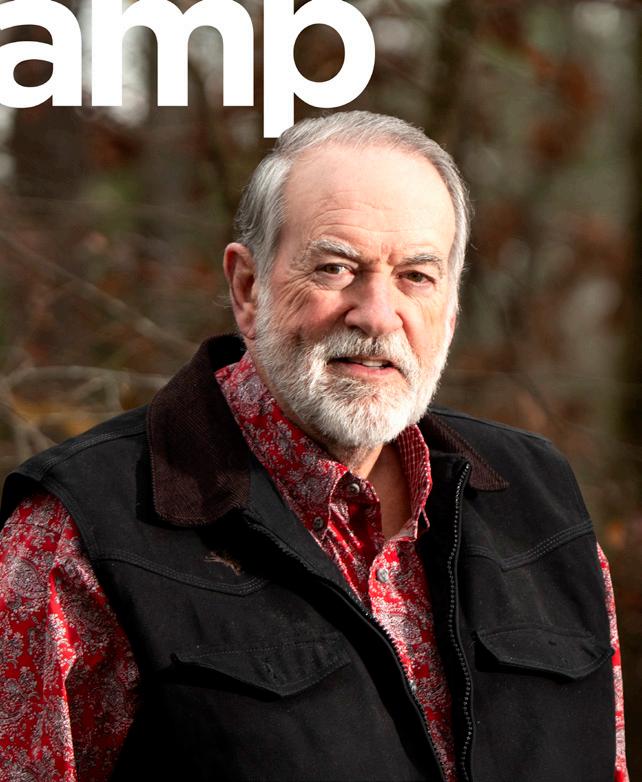



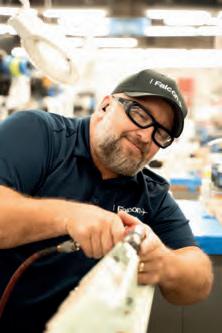




The trucking industry is a rocky road, and there are many complicated issues pervasive in the ever-changing industry. Currently, trucking is experiencing a difficult period in Arkansas and across the country when it comes to economic pressures.
A study released by the American Transportation Research Institute identified the top 10 critical issues in the trucking industry based on 2024 data. After polling trucking companies, drivers and other professionals with stake in the industry, such as law enforcement, the top issues identified were the following: economy; truck parking; lawsuit abuse reform; insurance cost/ availability; driver compensation; battery electric vehicles; compliance, safety and accountability; detention/delays; driver shortage; and driver distraction.
Trucking saw a significant boom in 2020 due to people being stuck at home and having some excess cash at the time, said Shannon Newton, president of the Arkansas Trucking Associa-
By Alex Hardgrave
tion. However, now that the surge has reversed, the sector has been grappling with a downturn that has lasted more than a year.
According to the ATRI study, that is not in tune with the overall economy.
“Real gross domestic product increased at an annual rate of 3 percent in Q2 of 2024, consumer inflation cooled to an annual rate of 2.5 percent in August, and income gains continued to outpace inflation,” the study states.
However, many factors that affect trucking’s bottom line, “such as domestic manufacturing output and residential housing starts, generally trended flat,” the ATRI states.
With economic uncertainty and fluctuating demand, trucking companies have been forced to adapt to the landscape.
Seth Runser, president of ArcBest in Fort Smith, said the company is currently contending with the “soft” freight environment, which he attributed to industrial weakness and an

overall slowdown in economic activity.
Butch Rice, president and CEO of Stallion Transportation Group in Beebe, echoed those concerns, saying he hopes manufacturing picks back up soon, which would increase the need for freight transport. He said drivers see what is going on, and they are concerned, as well.
Despite the downturn, good news could be on the horizon. Industry leaders noted a slight uptick in activity late last year going into January, which could signal a turning point.
“We do eventually expect the markets to recover, and there are some indicators out there,” Runser said.
However, Newton cautioned that some will depend on policy decisions regarding trade and tariffs.
“We’re optimistic that there are opportunities that will exist for stabilization,” Newton said. “It will be about making sure that it’s not stifled by any unforeseen or drastic change in the international trade.”
One strategy that the ATRI study suggests is to help ease the financial burden of the economy in the industry, including “identify and promote reforming/repealing ineffective and burdensome regulations that increase industry costs without providing benefits.”
That intertwines with another issue on the top 10 list, which is battery electric vehicles.
There have been “aggressive” timelines for transitioning cars and trucks to zero-emission vehicles, but the cost of infrastructure needed to power electric trucks is $1 trillion, and the cost of purchasing battery electric trucks to replace Class 8 trucks is estimated to cost more than $116 billion.
Industry players are also calling for the renewal of the 2017 federal income and corporate tax cuts set to expire this year. Among its provisions, the Tax Cuts and Jobs Act, signed into
law by President Donald Trump, reduced tax rates from 39 to 21 percent.
The second-highest industry concern, according to the study, is truck parking. Truck drivers are struggling with a chronic shortage of parking spaces. Newton said for every 11 trucks on the road, there is only one available parking spot.
“A place to rest is obviously very important,” she said. “We have a capacity issue when it comes to access to safe, flat, well-lit facilities — all of those things you would want if you were going to take an eight-hour rest.”
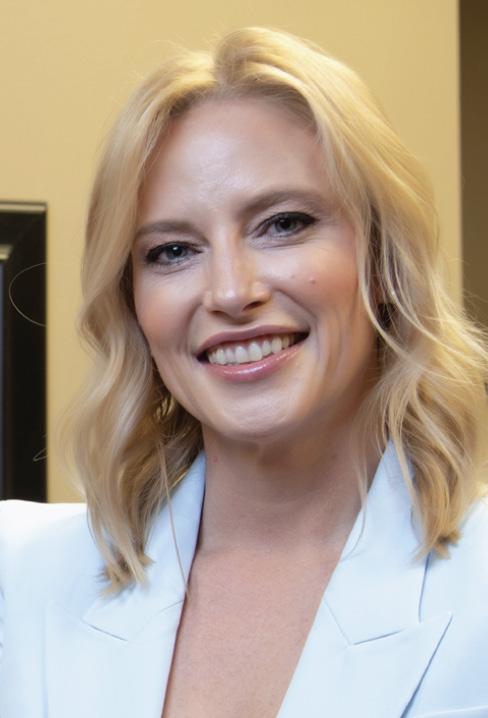
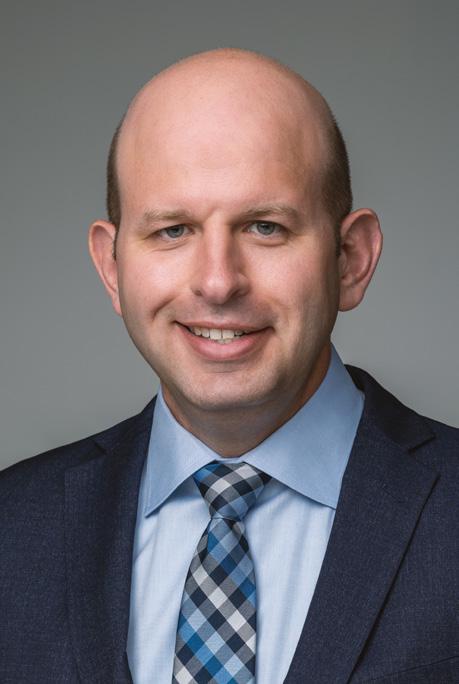
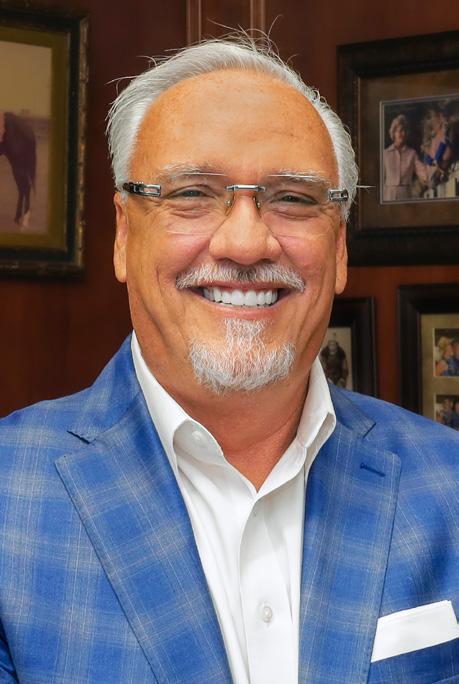
The Arkansas Trucking Association has been actively working to address that issue through legislative efforts and public education. Recently, ATA assisted with a project that added 84 truck parking spots in the state. Additionally, the organization is collaborating with the Arkansas Department of Transportation to ensure that truck parking is considered in future interstate projects.
Beyond parking concerns, supply chain complexities are also creating challenges for trucking companies. Runser noted that disruptions have become the norm, requiring companies to take a more integrated approach to logistics. ArcBest has been working closely with customers to manage supply chains from start to finish, helping them overcome logistical challenges.
There is an ongoing driver shortage of about 60,000 operators needed, but that number will increase as freight demand returns and as aging drivers retire.
Working as an integrated logistics company has allowed ArcBest to see growth even when the trucking industry is slow, Runser said.
Another issue facing trucking are ever-rising insurance prices. Stallion, which received an award for safety last year, still saw a 10 percent increase in insurance rates.
“That’s an ouch,” Rice said.
The issue ranked third in the ATRI study. Insurance costs rose 12.5 percent in 2023 and continued to rise in 2024, the study states.
Some remedies suggested in the study include “developing a framework for potential up-front insurance premium reductions when drivers and carriers adopt proven safety technologies.”
The industry already spends about $14 billion annually to improve the safety of trucks, including investments in technology and training, but does not yet receive better insurance rates as a result.
Another way to work to lower insurance costs for trucking is to educate the public on the role of lawsuit abuse in increasing consumer prices and insurance costs. Trucking lawsuit abuse is a phenomenon whereby truckers are sued frivolously or lawsuits against them are exaggerated. There are arguments that lawsuits are filed even when there is no clear evidence for negligence or driver violations.
Despite all the pressures trucking faces, ArcBest is forging ahead with new technologies, for which it has 600 developers and data scientists on its staff. The company recently released Vaux Vision, which uses 3D technology to capture freight measurements and images directly from forklifts.
The company also uses artificial intelligence to help optimize routes trucks can take, which is in line with increased AI usage in the industry as a whole. Runser said the use of AI has helped the company save $25 million. That cost reduction allows ArcBest to improve service for customers by being more efficient.
“Customers want to do business with someone they trust,” he said.
Stallion, too, has embraced new technologies, upgrading software and equipping its trucks with cameras to increase safety.
There is also an ongoing driver shortage of about 60,000 operators needed, and that number will increase as freight demand returns and as aging drivers retire.

to regulations on the age people can get a commercial drivers license, which right now is 21. Thus, people just graduating from high school cannot go straight into the field.
There are various ways the industry is looking to recruit drivers. One way is working with under-represented populations, including “military veterans, inner-city youth, young adults aging out of foster care and formerly incarcerated individuals, among others,” the study states.
Another is advocating for expanding interstate CDL eligibility to 18- to 20-year-old drivers. In 2021, the DRIVE Safe Act was signed and included a national pilot test allowing up to 3,000 18- to 20-year-olds to operate trucks in interstate freight commerce. The apprenticeship program has struggled to get participants, however, due, in part, to “highly stringent requirements for participating motor carriers,” the study states. The program did announce a lessening of the requirements in 2024.
While these are undeniably challenging times for the industry, between needed reforms and economic hardship, Arkansas’ trucking companies continue to push forward. Stallion, which has existed since 1992, has seen its fair share of “peaks and valleys,” Rice said. He added that he hopes to see steady, continued growth in the future.
“We want to keep going like we’ve been going,” he said. “This is just part of business.”
Newton said she hopes the public will gain a greater appreciation for the vital role truckers play in daily life.
“We pick up our phones and we order something that we want delivered tomorrow, and we think that that just happens,” Newton said. “There is an entire distribution system, supply chain, and men and women who are making a living making our lives convenient, and so I wish, perhaps, people would think of that when they see a truck on the road.”



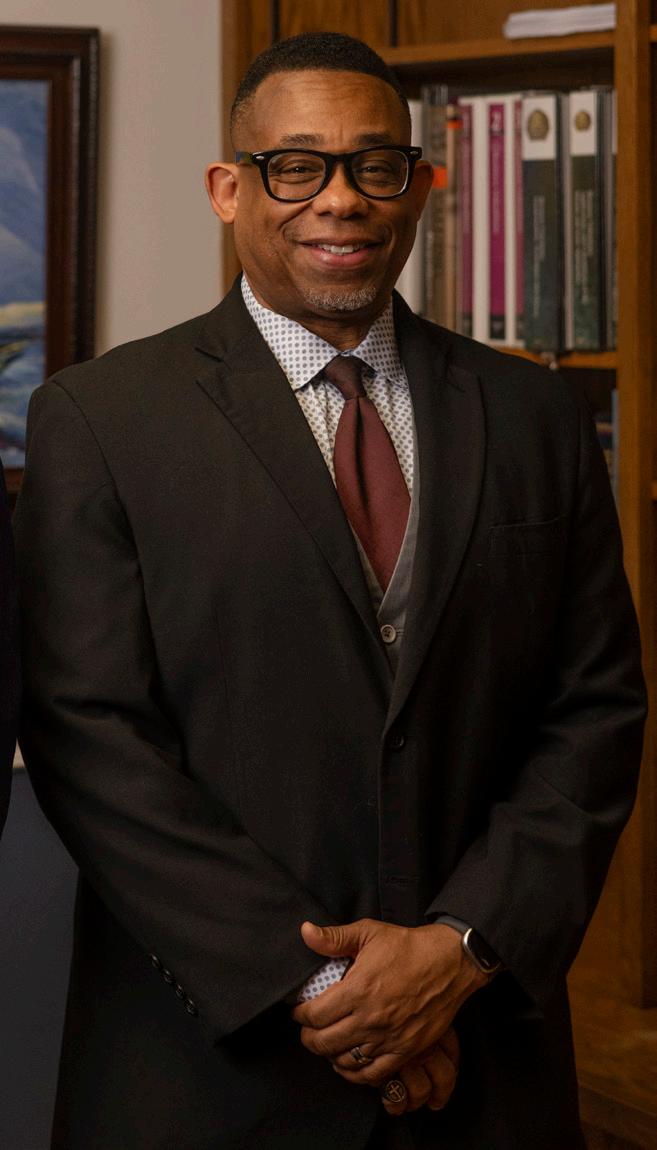

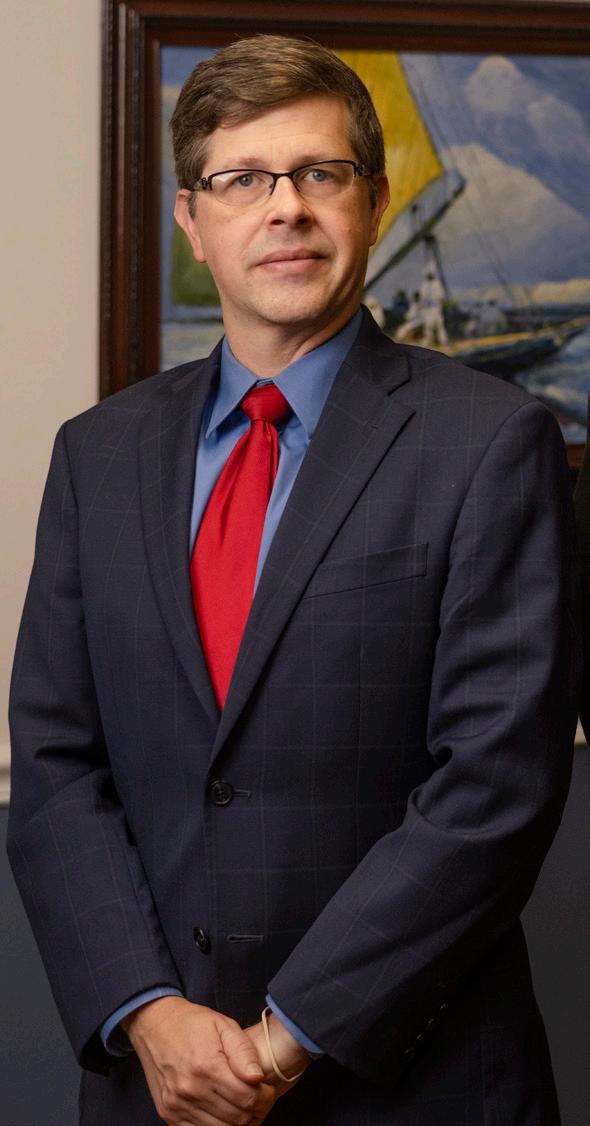

3 Rivers Logistics
AAA Cooper Transportation
ArcBest
Bowerman Trucking
Brent Higgins Trucking
Brew Crew Transportation
Bruce Oakley
CalArk
Carman
CC Jones Trucking
CCS Transportation
Celo Transport
Central Hauling Co.
Convoy Logistics
Dedicated Logistics
Diamond State Trucking
Distribution Solutions
DMT Services
Truckload and less-than-truckload brokerage services for both refrigerated and dry loads, along with flatbed, hotshot, bulk and intermodal brokerage services.
Less than truckload, truckload, dedicated contract carriage, brokerage and fleet maintenance.
Intermodal and international shipping, less-than-truckoad, trade show shipping, time-critical, flatbed and temperaturecontrolled services.
Nationwide dry-van freight transportation.
Refrigerated and frozen products.
Gillett
Fort Smith, Jonesboro, Little Rock
Fort Smith
Searcy
Mulberry
Steel transport crew offering flatbed services. Farmington
Dry bulk transportation.
North Little Rock
Dry-van trucking services in addition to temperaturecontrolled warehouse and distribution. Little Rock
Freight shipping and trucking. Fort Smith
Heavy hauling and specialty transport; produce. North Little Rock
Truckload dry van and refrigerated van services. Conway
Expedited hot shot, point-to-point delivery, less than truckload, long distance, critical delivery and secure delivery. Springdale
Dry-box full-truckload carrier.
Mabelvale
Full truckload, less than truckload, intermodal, drayage, cross dock and warehousing. Crossett
Nonhazardous freight carrier and trucking brokerage. Crossett
Flatbed, van and conestoga trailer services. Malvern
Full truckload, less than truckload, dry van, temperature controlled, long haul and regional shuttle. Harrison
Dry-van plate trailers for ground transportation. Siloam Springs, Van Buren
EOS Transportation services. North Little Rock
FedEx Freight
Glory Transportation
J.B. Hunt
JD & Billy Hines Trucking
JM Bozeman Enterprises
Keen Transport
Less-than-truckoad services for shipments weighing 150 to 20,000 pounds. Little Rock
Temperature-controlled carrier with trucking brokerage. Fayetteville
Intermodal, dedicated, final-mile, refrigerated, full-truckload, less-than-truckload, flatbed, expedited and single-source services. Lowell
Customized services to move wood chips to paper mills, in addition to flatbed trailers. Prescott
Dry-van truckload carrier and logistics. Malvern
Heavy-haul logistics and transportation for the construction, mining and agriculture equipment markets.
North Little Rock
Laubach Freight
Lew Thompson & Son Trucking
Loggins Logistics
MAGS Trucking
Maverick Transportation
MC Express
McSheer Truck’in
Morris Transportation
Old Dominion Freight Line
PAM Transport
Rich Logistics
Southland Transport Service
Specialized Services Transportation
Stallion Transportation Group
Full truckload, less than truckload, intermodal deliveries, hot shot, flatbed, conestoga flatbed and interplant shuttle. Paragould
Regional and dedicated truckload services. Huntsville
Flatbed services in nearly 30 states.
Jonesboro
Dry van. Cabot
Flatbed, dedicated, glass and brokerage services.
Irregular route carrier with trailer leasing and dedicated service.
Truckload transportation, dedicated routes and full-service brokerage.
North Little Rock
Jonesboro
Rose Bud
Long-haul, regional, short-haul and local services. Hamburg
Less-than-truckload freight leader with air-expedited transportation, brokerage services, warehousing, supply chain consulting and container drayage.
Dry-van truckload, expedited truckload, intermodal and logistics for manufacturing, retail and automotive industries.
Scheduled truckload, expedited freight and door-to-door services.
Fort Smith, Jonesboro, North Little Rock
North Little Rock, Tontitown
North Little Rock
Hopper-bottom freight, dry-van freight and temperaturecontrol freight. Stuttgart
Temperature-sensitive freight, dry goods and pharmaceuticals.
North Little Rock, Stuttgart
Long-haul, regional and dedicated trucking services. Beebe
Star Transportation Delivers petroleum products to more than 15 states.
Transco Lines
Truckload, less-than-truckload, drayage and specialized services.
Jonesboro
North Little Rock, Russellville
Tri-City Transport Dry and refrigerated transportation services. Rogers
Twin City Transportation
USA Truck
Wayne Smith Trucking
Woodfield
XPO Logistics
Third-party logistics and trucking brokerage company that offers air ride dry van trailers and flatbed services. Little Rock, Prescott
Dedicated, dry-van, expedited, flatbed, intermodal, less-than-truckload, over-dimensional and temperaturecontrolled operations.
Ground transportation services.
Van Buren
Morrilton
Dry-van truckload services. Camden
Less-than-truckload transportation, truck brokerage, last-mile logistics, intermodal, drayage, contract logistics, ground and air expedite, global forwarding and managed transportation.
Fort Smith, Jonesboro, Little Rock, Springdale
Source: American Trucking Association

From the highway to the hangar, transportation trades training is in demand
By Mak Millard
The numbers do not lie — it is a good time to make a living behind the wheel or under the hood. The U.S. Bureau of Labor Statistics projects 240,300 openings for heavy and tractor-trailer truck drivers each year until 2033, along with 13,400 yearly openings for aircraft technicians and 25,600 for diesel mechanics over the same timeframe.
National Public Radio recently highlighted what one respondent dubbed the “toolbelt generation,” noting the growing number of young people opting for vocational schools and on-the-job training over a traditional college degree. One likely motivation is purely economic: less confident about the return on investment, students are seeking career pathways that do not involve several-figure debt in pursuit of a diploma.
“We had a stint where we said you’ve got to have a bachelor of arts in order to be able to earn a living,” said Summer DeProw, chancellor at the University of Arkansas-Pulaski Technical College in North Little Rock. “In today’s world, with the generational shift, the higher-tech skill set, it’s just not true.”
For passengers flying out of Bill and Hillary Clinton National Airport in Little Rock, chances are their plane has been worked on by a UA-PTC grad. Between manufacturing and maintenance, the college also fields frequent calls from local employers such as Dassault Falcon Jet, Lockheed Martin and Arcturus Aerospace in search of skilled employees. The most recent career fair even included Walmart and Dillard’s, the respective corporate jet fleets for which need a steady supply of maintenance techs. Many students have a job lined up before they graduate.
“It’s an employee’s market in this context because American Airlines and FedEx and the Dillard’s CEO are not going to slow down on their flying,” DeProw said. “Everybody is poaching individuals from different companies, and the price tag just keeps ticking up with their pay.”
Employer conversations have also led to the renaissance of the PTC avionics program, which covers the manifold electronic systems used on aircraft for functions such as
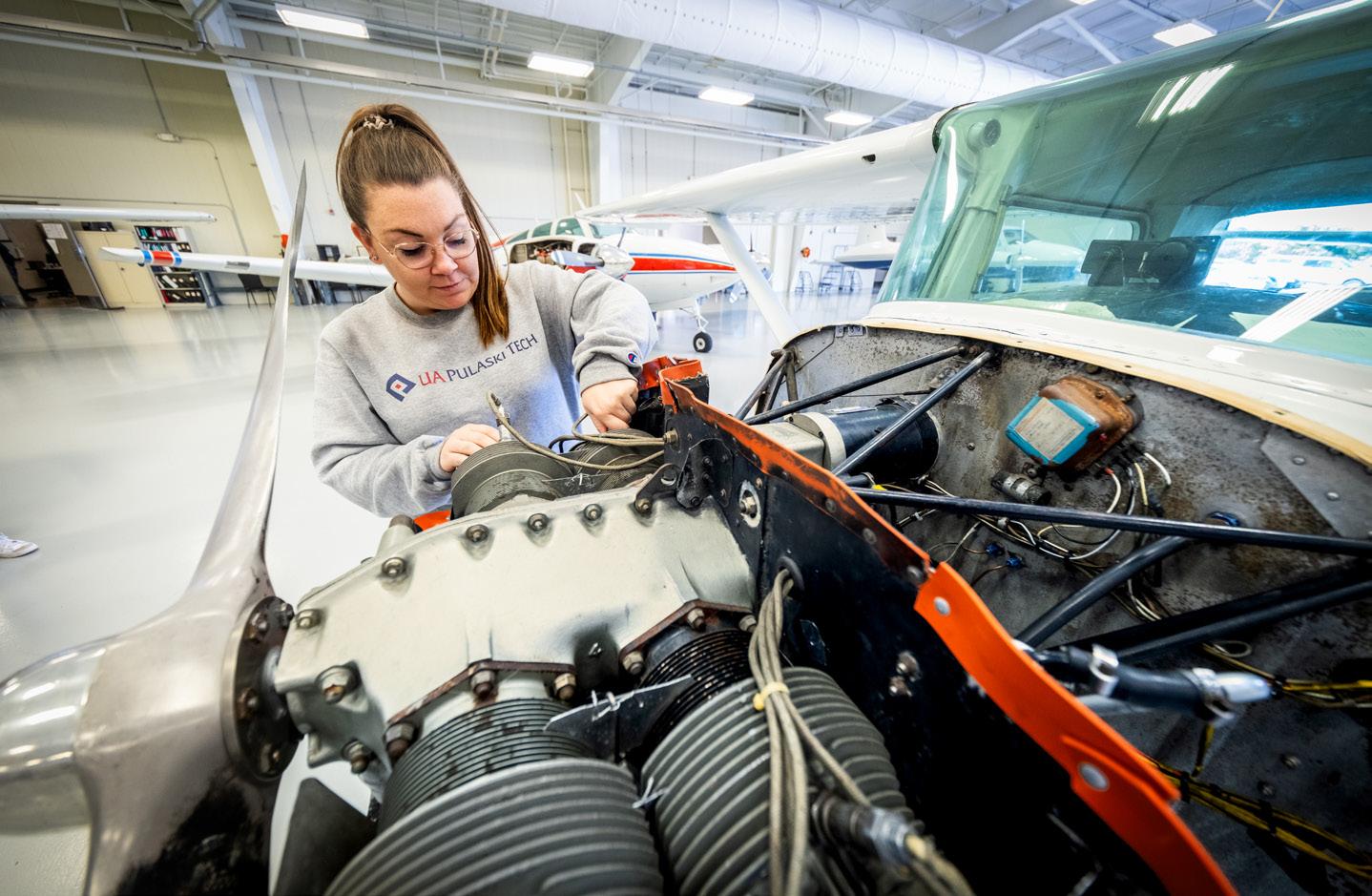
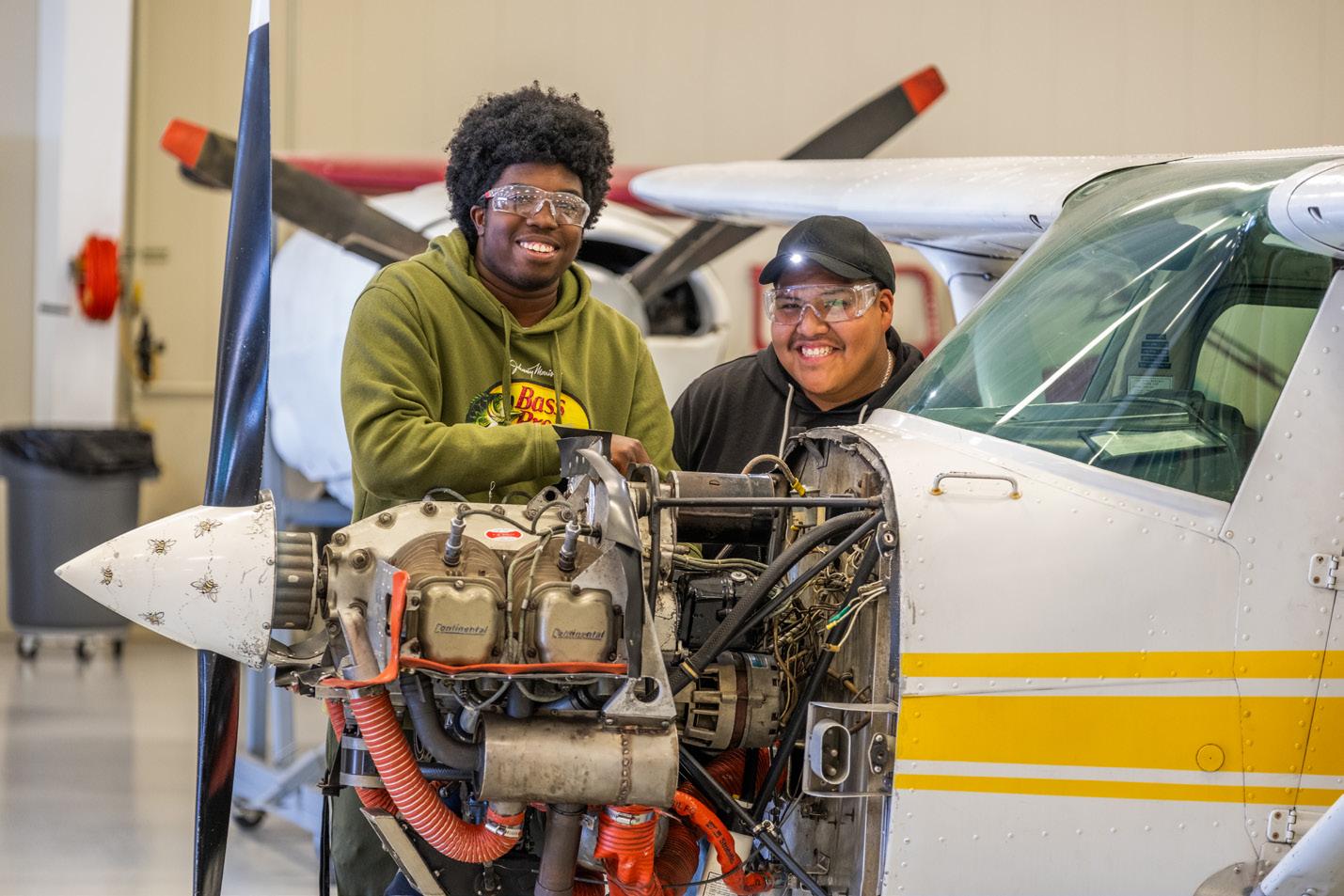
communications and navigation. The original course was phased out over a decade ago, but a recent spike in demand for avionics professionals prompted companies to push for a revival. Once launched, it will be the only one in the state.
“West Memphis has an airframe and powerplant mechanic program because FedEx is right across the river,” DeProw said. “There’s a little bit of this going on in northwest Arkansas, but not like this, not with this kind of square footage and these assets and this many instructors and three
Conversations with local employers led Pulaski Tech to bring back its avionics program. (Photos courtesy of UA-PTC)
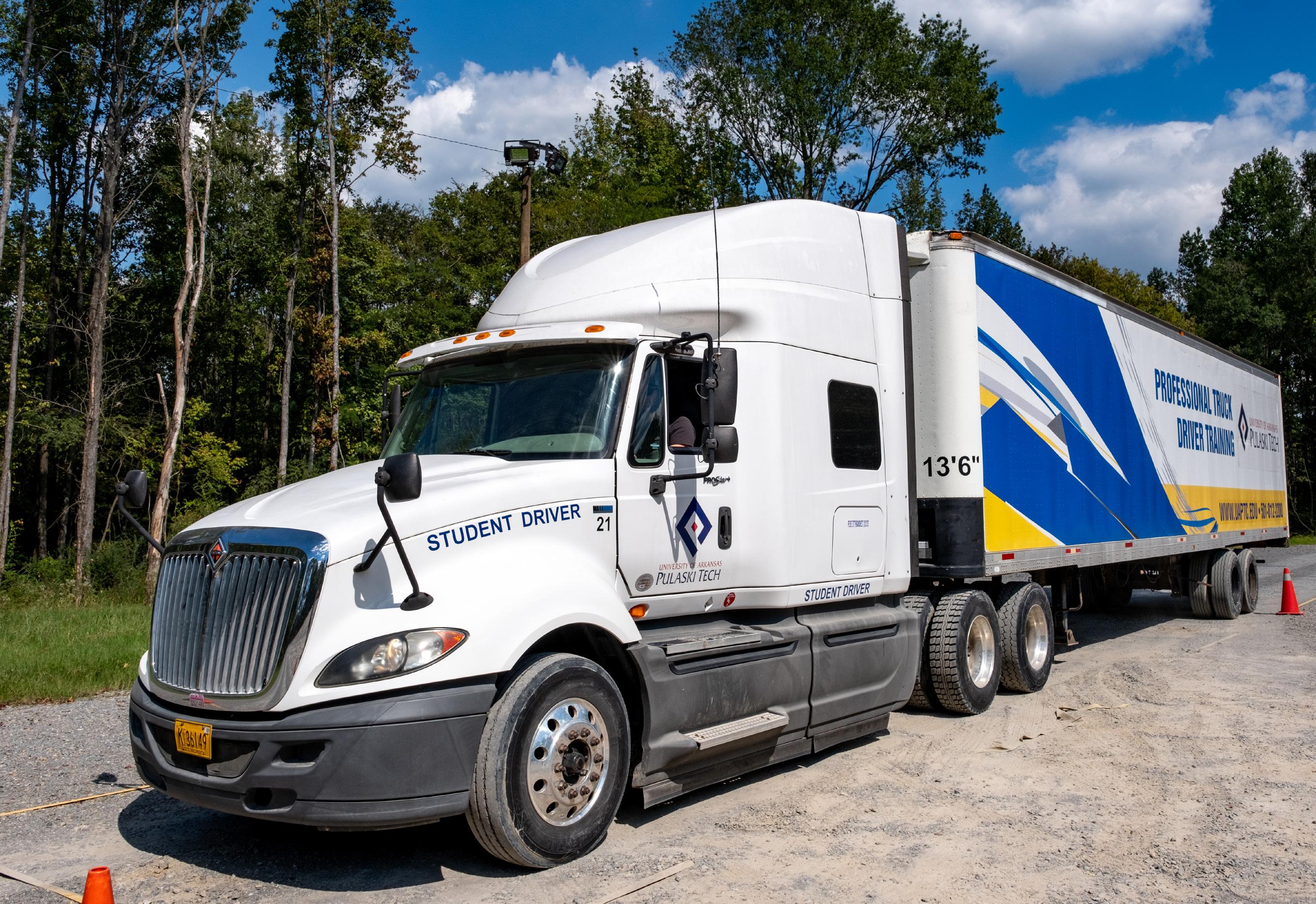
cohorts running simultaneously.”
The college is in the process of increasing its cohort size from around 16 students to 20 with the purchase of more equipment. Federal Aviation Administration guidelines limit the number of students who can work on a single piece of machinery, such as a jet engine, at a time, so the program is constantly rotating between beginner, intermediate and advanced students on the pieces it does have. Hands-on training is only one portion of the overall setup, however.
“They also have to take applied math and applied physics as a part of this program,” DeProw said. “It’s not just, ‘How do you turn a wrench?’ It’s literally, ‘How does it get in the air?’”
Students learn the ins and outs of a variety of plane makes and models, and that versatility reflects the wide array of potential job settings they will have access to after graduation.
The avionics comeback adds yet another dimension to students’ marketability.
“You may have somebody with, say, a 1985 model crop duster,” DeProw said. “They need to know how to work on that, as well, because they could work in agriculture. They could work in the private jets. They could do helicopters for EMT, paramedic companies.”
Based out of the college’s south campus in Little Rock, Pulaski Tech’s one-semester commercial driver’s license course has seen interest swell and is currently sitting at 50 applications for just 16 seats. Like the aviation tech program, students often find no shortage of available jobs open to them by the time they are ready to hit the road. The diesel technology program, meanwhile, draws crowds thanks to its advantageous position in central Arkansas.

“Given we’re a hub of logistics north, south, east and west across the country, there’s a lot of pressure on us to produce really high-quality mechanics,” DeProw said.
While those pursuing a career in truck driving have a wealth of training options, college-based programs benefit from the higher scrutiny that accreditation brings and can provide students with a level of quality assurance not offered by a for-profit course.
“This is an 89-credithour program,” DeProw said. “For a two-year college, that’s a huge amount of time. What if I close this program a year after a student started? They still can’t go to work, but they’ve spent all that money. For-profits who are not pursuing that level of accreditation, they can do whatever they want. The scary part is that they can close up shop anytime.”
For some programs, employers in particularly urgent need will utilize an apprenticeship model where new hires alternate between on-the-job training and classes at UA-PTC. For transportation and logistics industries, however, the setup is a less-apt fit for understandable reasons — while a manufacturing mishap is unfortunate, a misstep behind the wheel of a big rig or in the engine of a plane is likely to spell catastrophe.
“Airframe and powerplant, you just can’t work on a plane until you’ve had the education,” DeProw said. “They’re just not going to let you. There’s no warming up to it. Same goes for truck driving. I’m not going to hire you as a truck driver. I might send you off for schooling, but what if you hate it? What if you’re terrible at it?”
There are also logistical reasons these programs are less suited for the “hire first, teach
later” approach. Smaller companies might not have the budget to gamble on a new hire not working out in training. In that case, something like an internship might be more appropriate. Meanwhile, would-be CDL holders have an array of screenings, tests and checks to go through before they are ever allowed in the driver’s seat, making it harder to justify hiring someone who has yet to clear those hurdles.
Higher education leaders such as DeProw have another talent challenge to contend with — finding and retaining educators, especially as wages in truck driving, aviation maintenance and diesel technology continue to rise. The high demand making it essential to hire talented teachers is the same force that could just as easily pull them back into the private sector. Navigating the tradeoff requires a bit of negotiation with employers, who are reluctant to lose seasoned staff.
“We’re starting to get them warmed up to the idea of loan us your incredible employees,” DeProw said. “Let us pay them to teach one or two classes a semester in a regular rotation. We’ll teach them how to teach. Let’s share because otherwise when I gain, you lose, [and] when they gain, we lose. Then we all lose because we can’t produce enough in the context of the supply-and-demand conundrum.”
The other piece of the educator puzzle is ensuring teachers’ skills stay up to date with advancements in the industry. Upskilling and reskilling is vital for making sure teachers are preparing students for the reality of their soon-to-be professions, whether it is advancements in engines and electronic flight systems or learning to use the latest cameras and sensors instead of mirrors on a heavy truck. Those “externships,” DeProw said, allow Pulaski Tech to stay hyperconnected to the industries it is trying to provide labor for.
“We need to skill people. We need to upskill. We need to reskill,” DeProw said. “Pulaski’s got to get right up on the edge of all of that. Our industry partners have to be very generous with their time, and we get it.”
“
Given we’re a hub of logistics north, south, east and west across the country, there’s a lot of pressure on us to produce really high-quality mechanics.
— Summer DeProw,
chancellor, University of Arkansas-Pulaski Technical College
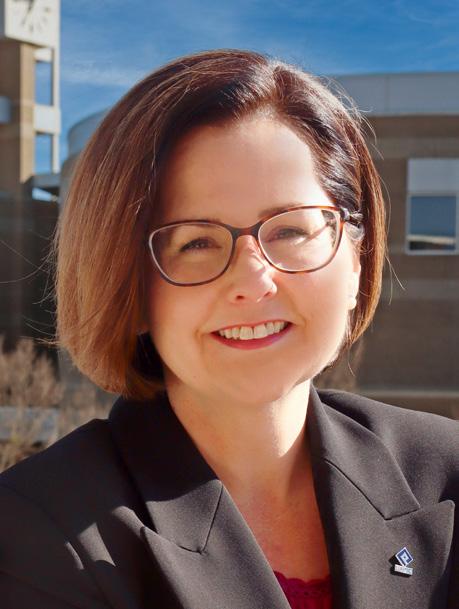

By Joe Jacobs
Afew years ago, my wife and I caught the real estate bug, dreaming of a property that could serve double duty: generating a reliable rental income and providing a personal vacation escape. Bella Vista quickly rose to the top of our list.
It was not just a whim. My work frequently landed me in the region, offering an ideal excuse for regular check-ins on our investment.
Plus the seed of future retirement plans had been planted. But let’s be honest, the real lure? The buzz about those brand-new mountain bike trails carving through the landscape.
We scoured the market, and when we stumbled upon a cozy home with a freshly minted trail practically in its backyard, it was game

over. Sold! Fast forward three years, and life threw us a curveball, prompting a sale.
What we did not expect is that our little investment had doubled in value, proving that following the trail does not just lead to adventure — it can lead to incredible returns.
Arkansas has quickly become a cycling mecca where both mountain biking and gravel cycling are thriving, resulting in a surge of tourism dollars and an improved quality of life for local communities. From new trail systems in smaller towns to major projects such as the OZ Trails Bike Park in Bella Vista and the Mena area trails expansion, Arkansas is proving that outdoor recreation can be a game changer for the state’s economy and culture.
— U.S. Bureau of Economic Analysis

The economic impact of cycling in northwest Arkansas alone is impressive. A 2022 study by the center for business and economic research at the University of Arkansas in Fayetteville found that cycling generated a total economic impact of $159 million, driven by tourism, local employment and tax revenue.
Biking businesses contributed more than $100 million in revenue, supporting 743 jobs and generating $6.1 million in state and local taxes. Additionally, biking tourism brought in $59 million and created 587 jobs. Major events such as the Walmart UCI Cyclo-Cross World Championship added another $9.9 million to the local economy
“According to the Bureau of Economic Analysis, Arkansas ranks sixth nationally in cycling growth as a share of [gross domestic product] since 2012,” said Katherine Andrews, director of the Arkansas Office of Outdoor Recreation. “This includes company growth and the tourism component of cycling in the state. This analysis further confirms what we’ve known all along — Arkansas is growing as a powerhouse in cycling across the U.S. and the globe.”
The Arkansas Global Cycling Accelerator, based in Bentonville, is further fueling the state’s cycling economy by launching its first cohort of 10 global startups focused on cycling innovation.

The pre-Series A companies are advancing cycling technology, components and mobility solutions, aligning with Arkansas’ growing reputation as a cycling powerhouse.
The program offers virtual mentorship, industry connections and resources, followed by an in-person residency. It culminates in a public demo night on May 20 at the Ledger in Bentonville coinciding with Bentonville Bike Fest.
Communities across Arkansas are investing in shorter mountain bike trails, making the sport more accessible to both residents and visitors. The smaller projects may not make headlines like the OZ Trails or Coler Mountain Bike Preserve in Bentonville, but they are creating ripples of positive change in their towns.
For example, the new trail system near Ward Lake in Mena offers riders a family-friendly option that still provides a challenge for seasoned cyclists. Similarly, Searcy County is currently constructing its first mountain bike trail near the Searcy County “Buffalo River” Airport in Marshall, adding another gem to the region’s growing network of trails.
Central Arkansas is also expanding its mountain bike offerings as Boyle Park and the trails under construction at Allsopp Park, both in Little Rock, continue to attract riders eager for technical terrain and flowing singletrack.
While shorter trails are popping up across the state, larger projects are making Arkansas a destination for serious riders. The Mena project, which has recently gained approval, is expected to deliver a premier mountain biking experience featuring miles of diverse trails that wind through the Ouachita Mountains. The expansion complements the new trail system at Ward Lake, solidifying Mena’s status as a mountain biking hub.
In northwest Arkansas, OZ Trails Bike Park is making waves as the state’s first chairlift-served mountain bike park. Riders can enjoy gravity-fed downhill trails without the grueling climbs, offering a thrill-seeking experience that rivals top destinations in Colorado and Utah. This addition strengthens northwest Arkansas’ reputation as one of the best places in the country for mountain biking.
Gravel cycling is also booming in Arkansas as new routes and events draw riders eager to explore the state’s diverse terrain. The Crowley’s Ridge Gravel Trail between Helena and Missouri offers riders a scenic journey through one of the state’s most unique geological formations, while the Delta Heritage Trail near Helena is making significant progress as a premier gravel route through the Arkansas Delta.
studioDRIFT, a local adventure recreation company, is helping transform the Delta into a destination for outdoor enthusiasts by promoting gravel riding and paddling opportunities. The initiatives not only attract tourists but also boost local economies by encouraging riders to explore rural towns and spend money along the way.
Arkansas is also home to a growing number of cycling events that draw participants from across the country. The Fat Tire Festival in Eureka Springs recently relaunched with an expanded lineup of enduro and downhill races, solidifying its place as a staple event for mountain bikers.
On the gravel side, the Arkansas Graveler, a fiveday cycling event from Mena to Russellville, has introduced exciting route changes for 2025, promising to offer even more scenic and challenging terrain for participants. Additionally, Jonesboro is set to host the inaugural Skirmish: A Delta Gravel Festival in May, which will showcase Delta’s gravel potential while providing a fun and competitive atmosphere for riders of all levels.
The surge in mountain biking and gravel cycling does not just boost tourism — it improves quality of life for Arkansans. Communities that invest in trail infrastructure reap immediate benefits, including increased economic activity and healthier, more engaged residents.
Mountain biking and gravel cycling attract adventure-seeking tourists who spend money on lodging, dining and other local services. In turn, that revenue helps fund further trail development and maintenance, creating a cycle of growth and sustainability.
The benefits go beyond dollars and cents, however. Access to well-maintained trails encourages residents to adopt an active lifestyle, fostering a culture of health and wellness. Trails also provide a safe and enjoyable space for families to explore the outdoors together, strengthening community bonds and enhancing the overall quality of life.
Adding to the excitement, the Ouachita and Ozark-St. Francis national forests have opened some of their International Mountain Bicycling Association Epic mountain bike trails to e-bikes, making the rugged terrains more accessible to a broader audience. Riders who may have been hesitant to tackle long, technical trails can now explore Arkansas’s backcountry with confidence.
The surge in mountain biking and gravel cycling does not just boost tourism — it improves quality of life for Arkansans.
As Arkansas continues to invest in trail infrastructure and promote cycling events, the future looks bright for mountain biking and gravel cycling in the state. With projects such as the Mena area trails expansion and OZ Trails Bike Park leading the charge and gravel initiatives like the Delta Heritage Trail connecting communities in the Delta, Arkansas is well on its way to becoming a premier destination for cyclists of all kinds.
Whether a seasoned rider looking for the next adventure or a newcomer eager to explore the trails, Arkansas has something for everyone, making it easy to grab a bike, hit the trails and experience firsthand how cycling is transforming the Natural State.
Joe Jacobs is the owner and editor of ArkansasOutside.com.
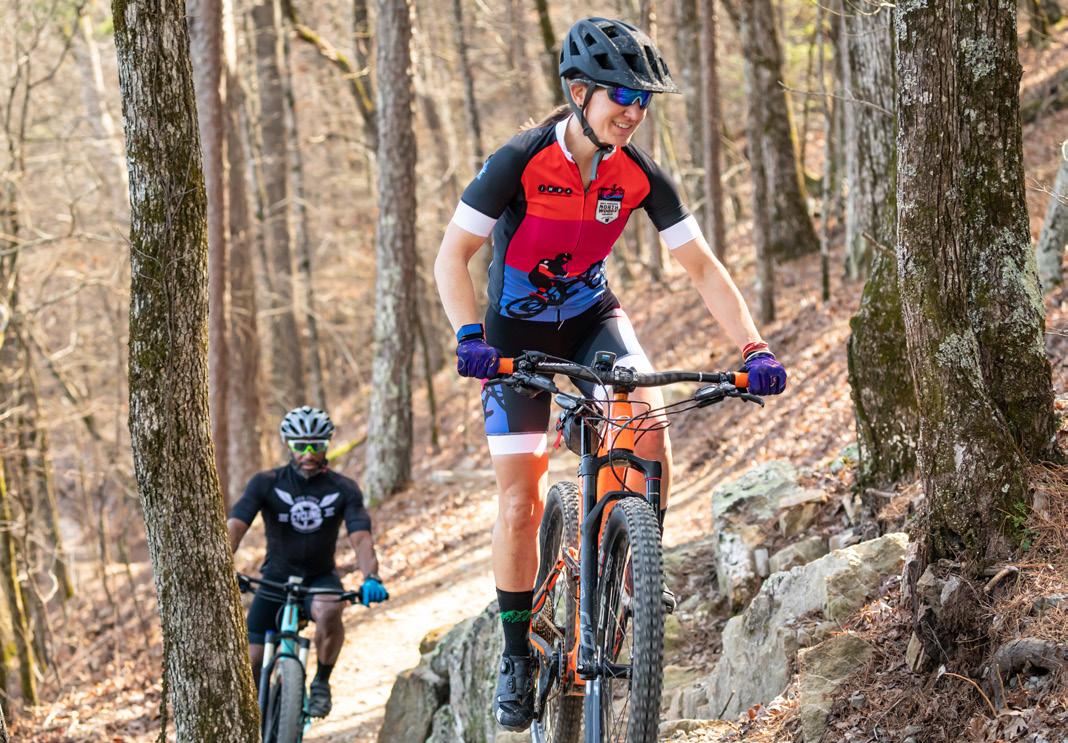




By Dwain Hebda
vintage bumper sticker people of a certain age may remember, especially in the rural reaches of America, succinctly and effectively sums up the importance of agriculture to society.
It reads, “If you complain about America’s farmers, don’t talk with your mouth full.”
While no truer words may have ever been spoken, the statement actually does not go far enough. Agriculture not only feeds the world, but it also clothes a good portion of it and, thanks to the miracle of bio-based manufacturing, helps create many of the items that power modern life, from ethanol fuel to a wide range items made with soybean by-products and derivatives.
Yet, as has been the case for much of the post-industrialized era, some decades worse than others, life on the farm is a risky proposition. Few people outside of agriculture realize just how expensive it is to run a farming operation with overhead and annual costs that dwarf that of many small businesses.
An article in Successful Farming last fall broke down the current outlay required for farmers to operate. Drawing from statistics by Iowa State University that measured 2024 operating costs, the magazine reported seed and chemicals sufficient to produce 202 bushels of corn per acre ran an estimated $385 per acre. Over a relatively modest 750 acres of ground, that comes to $289,000, a figure that does not include one drop of water applied or one drop of fuel to run the pump.
It should also be noted that the ground upon which those crops grow is also rising in cost at a breakneck rate. The U.S. Department of Agriculture reported in 2024 the average price per acre of cropland nationwide was more than $5,500 per acre, up almost 5 percent from the previous year. In Arkansas, cropland averaged $3,600 per acre, up 4 percent year over year, meaning the 750 acres referenced above costs $2.7 million to purchase.
Throw in $300,000 tractors, $600,000 combines and assorted other machinery, including the aforementioned irrigation systems, plus fuel and upkeep on all of the above and it is quickly apparent that every producer has a lot invested in their operations.
(Note that we have not even addressed the rancher’s cost of livestock, feed and medicines to get animals to market.)
Even more anxiety inducing are the risks the agricultural industry takes as routine, risks that go far beyond an individual’s control and therefore are almost impossible to mitigate. Crops are, of course, grown outside, where they are subject to the whims of Mother Nature. While science has helped many farmers control the scourge of crop-consuming insects, there is no spray that protects against hailstorms, destructive winds, torrential rainfall and drought.
Then there is disease among animals; with all the advancements in veterinary medicine, disease can still take down a herd with shocking speed, a fact which any poultry farmer nervously watching the 3-year-old bird flu spread to counties in all 50 states is well aware.
To get a better handle of the situation on the ground with agriculture in the Natural State, Arkansas Money & Politics sat down with Dan Wright, a Scott County poultry grower and president of Arkansas Farm Bureau. In Part 1 of that conversation, which follows, Wright discusses the current economics of farming and the imperative of getting a new federal Farm Bill passed before financial conditions cut the arteries that carry the lifeblood of a nation.
AMP: What grade do you currently give the state of Arkansas agriculture and why?
Wright: As a producer, I give our productivity an “A.” I give our economy part of it a “D.” We’re in a position now where the net income on the farm is getting to the levels that are actually becoming unsustainable. As a poultry producer in western Arkansas, I’ve seen my input increase 20 percent to 35 percent over the last two years, and my revenue’s staying about the same. I mean, things have gone up so much. Fuel kind of leveled out a little bit, but parts for our tractors, our equipment, our labor, if you can get labor, it’s really difficult right now.
It’s just gotten to the point that there are some folks who have been in business for a long time wondering do we stay in business another year or not, or can we stay in business another year or not?
We’ve seen the best yields, and we’ve broken records for yields over the past four years, but the amount of money [producers] are getting for those yields has been the worst that we’ve seen in the last four years. I don’t care how much yield you got; farming is an expensive business.
AMP: What has that done to the numbers of farmers and ranchers in the state?
Wright: It just seems to be going down and down. It’s heartbreaking because we’re relying on that new generation to come in and take over for people like me who are looking to retire in the next few years. Who’s going to supply the food supply?
We’ve got farmers and ranchers that are just getting started, and our new generation is having problems just staying in a business unless they inherited a farm. If they’re having to buy into this thing, if they’ve got loans out there, with interest rates doing what they’ve been doing, they are struggling just to keep those loans paid up.
AMP: The average consumer sees prices at the grocery store, and many think everyone in the food business is doing pretty well. Can you unpack for me the financial realities producers are actually facing and what’s working against them in terms of costs and profitability?
Wright: As far as the producer goes, it begins when you go to the bank to start planning for that next year. When you start working on those operating loans that you’re going to need to get that crop in the ground and to harvest that crop, first thing you look at is your interest rates. What are they going to be? That’s an input cost.
Then go to buying seed, buying fuel for the equipment, which, as you probably know, it takes an incredible amount of fuel to run this equipment that we have. You’ve got tractors. You’ve got combines. You’ve got irrigation systems. Then you’ve got to have labor to work with them. By the time you’ve got that seed in the ground, you’ve already got a major amount of money tied up in this crop.
Then you nurture that crop all summer, spraying and watering and all that to bring it to maturity, which costs money. By the time you come in there and harvest it, you have all this money invested that you’ve not recouped yet. When you take it to the mill or take it to the elevators and you get the price that you get, it’s just disheartening. The price is terrible; we’re looking at prices that would’ve worked five, six years ago, but they do not work now.
AMP: What changed?
Wright: A lot of this was stuff we saw during COVID-19. COVID changed a lot of our input costs. On the western side of the state, which is where I live, there were a couple years there, from 2000 to 2022, where input costs went up 40 percent. That’s come down a little bit, but the producer has taken the brunt of it, and at the end of the harvest, he or she is not getting the payoff they should be getting.
AMP: Correct me if I am oversimplifying that point, but it sounds like a sad irony that the better farmers and ranchers are at their job of producing commodities, the worse off the market becomes. In effect, they’re lowering their own pay, correct?
Wright: If the supply was down, prices would be up, exactly. However, because the Arkansas farmer is so good at what he or she does, it’s causing that price to go down because there’s an overabundance of that commodity, yes.
AMP: How much does the lack of a fiscally sound and reasonable Farm Bill at the federal level exacerbate the situation?
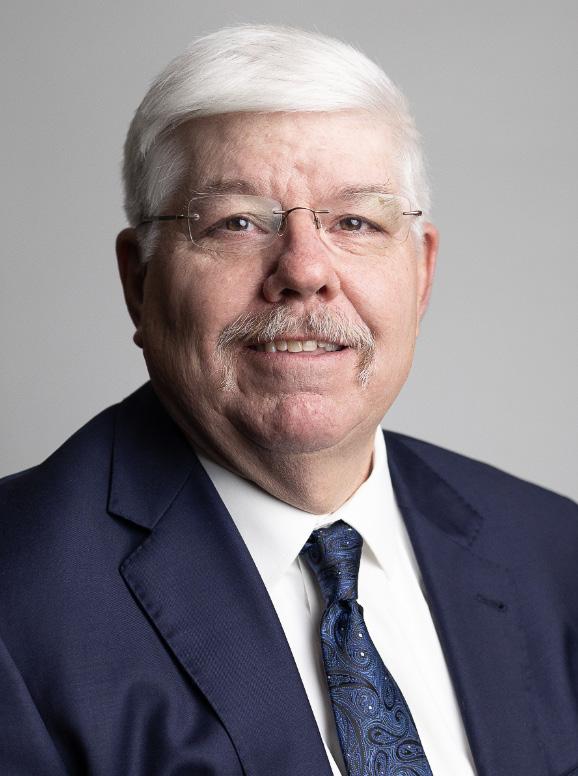
Wright: It is on everybody’s mind right now. It is the No. 1 factor in whether we move forward or not. The fact that we’ve not had a Farm Bill in the last two years pushes everything down the road another year. If we came up with a Farm Bill today, it wouldn’t help our farmers until September, so they would put a whole crop on the ground, and that Farm Bill would not do them any good. [Congress] should have had this thing done back in September to keep things going. The banks look at that Farm Bill because we have reference prices. There are programs within the Farm Bill that if we see exactly what we’re seeing now, a drop in revenue, a drop in commodity prices, there’s a program that kicks in called Price Loss Coverage, and those are reference prices that are what we would’ve seen back in 2018 or 2015. Those are nowhere near where they should be now. They’re just so out of date.
So to get a Farm Bill done as soon as possible is the No. 1 focus of Arkansas Farm Bureau. I also sit on the board of directors of American Farm Bureau, and I can assure you this is the No. 1 factor that we’re looking on American Farm Bureau also.
AMP: What have you sensed in terms of getting the attention of individual lawmakers with the onset of a new administration? What’s it like in Washington?
Wright: One thing we have the advantage of here in Arkansas is we have a U.S. senator named John Boozman [chairman of the Senate Agriculture, Nutrition and Forestry Committee]. He has always been a friend of Farm Bureau, and he understands what we do. I’ve been able to talk to him personally about issues farmers are suffering under here, and he has been instrumental in getting things going. He understands the plight that the farmer is in right now, so we’re very confident he’s going to get us [a Farm Bill] and, more than that, get us a good one.
We want one that’s going to be good for the next five years to eight years. I know we don’t have a crystal ball, and no one saw COVID coming. No one saw input costs go up 50 percent. Nobody could have foreseen that, but there has to be some changes where we can adapt even in the middle of a Farm Bill season to be able to put some changes in.
Sen. Boozman knows that, and we’re working very closely with him to try to get something going. In fact, it has made me very popular nationally. People who wouldn’t ordinarily talk to me seek me out because they know Sen. Boozman’s from Arkansas, and they want to have his ear.

By Doug Crise
Arkansas poultry industry navigates bird flu and builds futures for next generation
Blake Rollins hit the ground running, but then again, he did not have much of a choice.
The newly-minted executive vice president of the Poultry Federation barely had time to move into his new Little Rock office before he headed to Hot Springs for the federation’s Food Safety Conference.
“You had food safety professionals, academics, leaders and trade associations all across the country come together to try to learn from each other how to do even better,” Rollins said. “When you think about today’s consumer and the need to make progress, it was very impressive.”
Rollins soaked up as much as he could and shook as many hands as he could, and then he got to work. There is a sense of urgency around the Arkansas poultry industry these days, and for good reason. There are more than 6,500 poultry farms in Arkansas, and together, they process a staggering 20 million chickens a week. According to the Arkansas Farm Bureau, agriculture is the state’s top industry, and poultry is right at the top of that category, along with rice and soybeans.
There is big money involved in poultry, and there is plenty at stake. For some, it might be just a source of food, but for many, it is a source of income. Anything that threatens to disrupt the production of poultry carries a huge price tag for the industry and the state as a whole.
Don’t believe it? Try buying some eggs.
The average price of a dozen Grade A eggs in Arkansas has shot up to $4.95, according to the Consumer Price Index, and the average price nationwide has shot up to $5.90. While some have attempted to politicize the situation, poultry experts in Arkansas say nothing could be further from the truth.
“The main cause is avian influenza,” said Marvin Childers, president of the Poultry Federation. “Avian influenza has been very active again in egg-layer communities.”
It is a simple problem but a difficult one to crack. When bird flu hits an egg-laying popu-
lation, the only solution is what Childers calls “depopulation.” Every chicken in the facility, symptomatic or not, must be euthanized. The disease is that contagious.
“Avian flu is so highly pathogenic you can transmit it just by stepping in a chicken house,” Childers said.
The biggest enemy is time. Farmers cannot just replace an egg-laying population. Poultry producers have to go through a rigorous cleaning and disinfecting process before bringing in new chickens, and even then, it is a 22- to 25-week wait until they are mature enough to lay eggs.
“Any disease that impacts poultry is always a threat,” said Michael Kidd, director of the poultry science department at the University of Arkansas in Fayetteville and a professor of poultry nutrition.
Kidd said biosecurity has increased on Arkansas farms and that the university itself offers education and outreach on biosecurity through its extension department. However, the in-state reach only goes so far.
“With reference to avian flu, I don’t know of any research that’s being done in Arkansas,” Kidd said. “Virus research requires specific facilities, and they are not only specialized but also limited.”
For now, the industry is in a kind of holding pattern. As of March, more than 35 million chickens have been euthanized nationwide.
“And there’s 330 million total chickens nationwide,” Rollins said.
Thanks to its southern location, Arkansas’ poultry producers have been hit especially hard.
“It comes in cycles,” Childers said. “The main carrier for avian flu is wild birds. They migrate south, and they stop here. That’s where it’s spreading from.”
For now, poultry producers are looking for help where they can. The U.S. Department of Agriculture rolled out its “Defend the Flock” initiative in 2024, offering tips, support and resources to beef up biosecurity. The USDA is also backing up its efforts with a proposed
Poultry is the most consumed livestock commodity in the United States. It’s the most efficient. Egg prices notwithstanding, it’s the most affordable protein. It’s got great nutritional content, and it’s very delicious.
— Blake Rollins, Poultry Federation
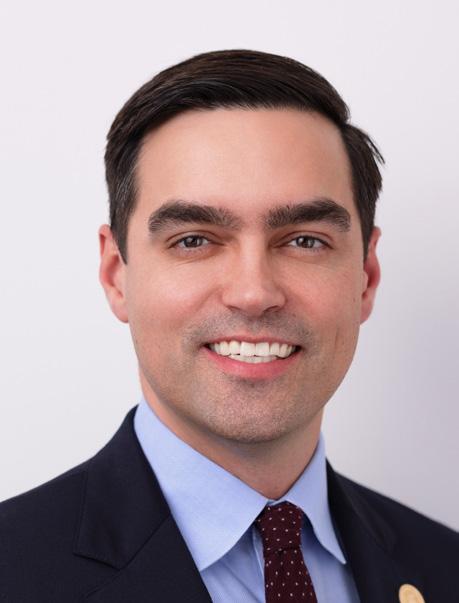
Michael Kidd of the UA’s poultry science department said any disease that impacts poultry is a threat.
(Photos courtesy of the Poultry Federation)
$500 million investment to promote best practices on poultry farms.
“There’s some efforts going on that are going to bear fruit in that space,” Rollins said, “and traditionally, the warmer temperatures improve the situation. This year has been a tough one.”
Just like the USDA, the Poultry Federation offers an extensive selection of educational resources. As part of the “All In, All Gone” campaign, the federation provides producers with a best-practices booklet, information packets in both English and Spanish, a waterfowl migration map, and biosecurity training materials.
However, all that only goes so far. The Poultry Federation is a nonprofit trade organization that exists to promote and support the poultry industry in Arkansas, Missouri and Oklahoma. The organization does not
draft regulations or propose laws.
“We are trying to remain loyal to the poultry companies,” said Holly Duval, director of marketing and business development at the federation. “We allow them to be the voice, and that’s something we do on any major issue.”
The Poultry Federation’s membership list includes industry giants such as Tyson Foods, Butterball and Cargill. It is they, Duval said, who implement their own biosecurity practices — and given the threat avian flu poses for their profits, they are devoting plenty of time, funding and resources.
“Essentially, if you’re a grower who’s raising birds for Tyson, they’re going to have their own set of rules and guidelines related to biosecurity that they want their growers to implement,” Duval said.
Kidd said the fight against avian flu has become a two-pronged approach. Poultry
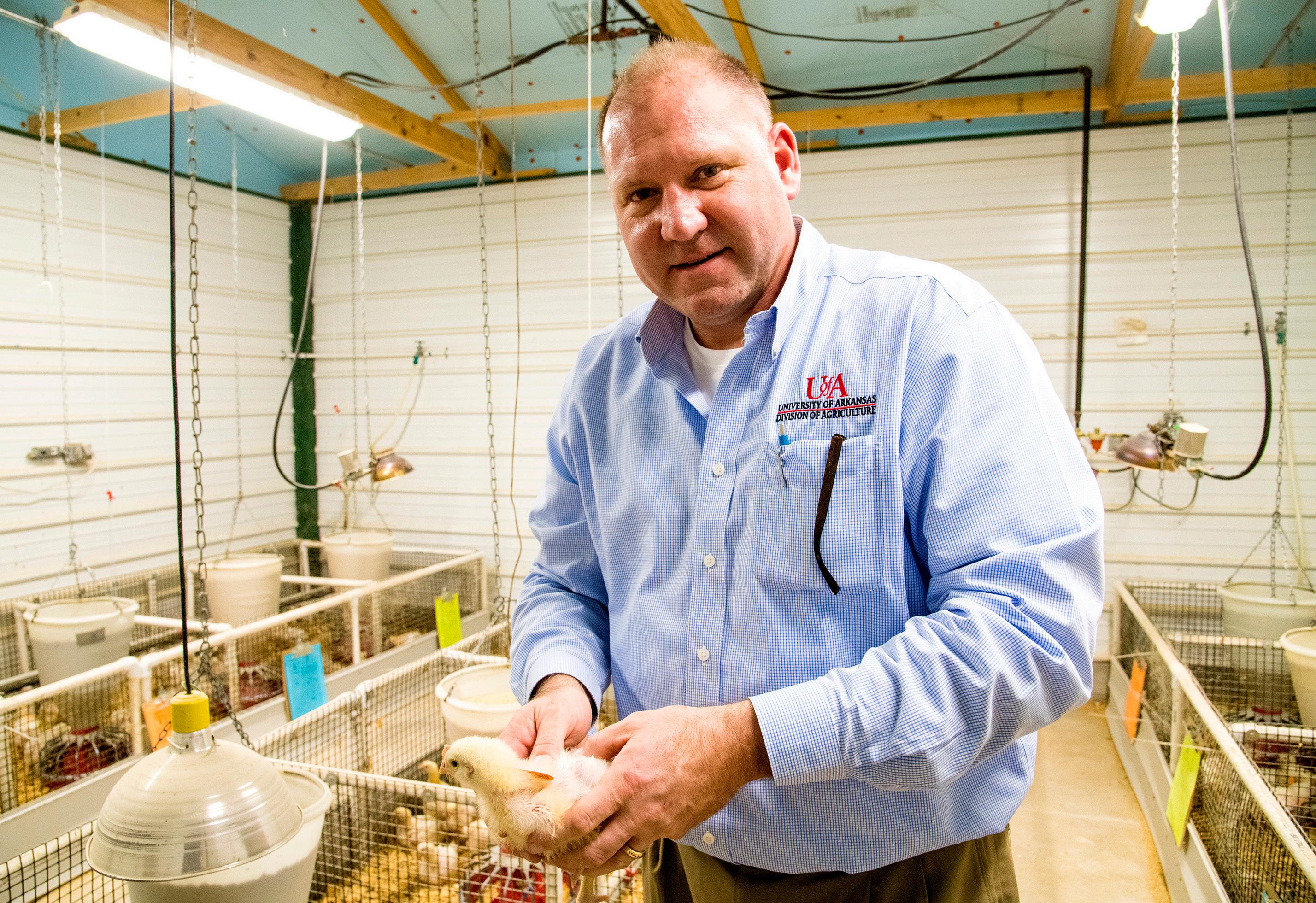
companies are revising and extending their safety practices, while poultry science departments in the academic realm work for solutions in areas such as nutrition, genetics and vaccines.
“Research, teaching and extension programs are multifaceted, covering many areas, from the basic sciences to operations within the business model of production and processing,” Kidd said. “Faculty work in areas such as poultry health, immunology, molecular biology, microbiology and neurobiology. Basic sciences impact industry.”

Yet there is more to the poultry business than just science and farming, and the Poultry Federation wants to make sure Arkansas students know that. The federation annually teams up with the Arkansas Community Foundation to award scholarship money to students looking to break into the poultry industry. Over the last school year, the Federation awarded more than $147,000 in scholarships to 21 undergraduates and nine graduate students. In total, since implementing the program, the Poultry Federation has awarded more than $2 million to more than 600 students.
There are more roads to that scholarship money than people think. Bring up the poultry industry, and some might have a less-than-appealing mental picture of working in a chicken house or cutting up chickens on an assembly line. Duval wants students to know there is way, way more to the industry than that.
“We’re trying to share with students that there are so many opportunities in this industry,” Duval said. “You could be a scientist who is developing the next vaccine. You could be a nutritionist who is trying to determine the best way to feed birds so they’re healthy. You could be an engineer trying to help develop the ways a processing plant is structured so that it runs very efficiently.”
The scholarship opportunities also apply to disciplines such as accounting, marketing, business development and finance. With larger companies such as Tyson starting to offer on-site daycare for employees with families, even students studying elementary
education are eligible to apply — and 90 percent of all applications end with some form of financial reward.
“Over 150,000 jobs in Arkansas are tied to the poultry industry,” Rollins said. “If you want to live in Arkansas and be a part of the community, the poultry industry has a lot of opportunity.”
In fact, as the industry continues to develop, the next generation of producers will get in on the ground floor of what is becoming a technological revolution.
“Another thing is the whole implementation of robotics,” Duval said. “You have a whole element of engineering that is more and more a way of having a consistent workforce in and outside of the plant. It’s everything from how the product is handled, meaning the eggs and meat part of the bird, to the efficiency when it comes to how the bird is cut for different uses. There’s a lot of innovation from that side of the industry.”
Innovation combined with continued education and professional development will keep poultry near the top when it comes to Arkansas’ industrial profile.
“Poultry is the most consumed livestock commodity in the United States,” Rollins said. “It’s the most efficient. Egg prices notwithstanding, it’s the most affordable protein. It’s got great nutritional content, and it’s very delicious. We’ve got a great industry to work with. There’s always innovation going on in the industry. They’re always coming up with a new product or new thought.”
Avian flu is so highly pathogenic you can transmit it just by stepping in a chicken house.
— Marvin Childers, Poultry Federation
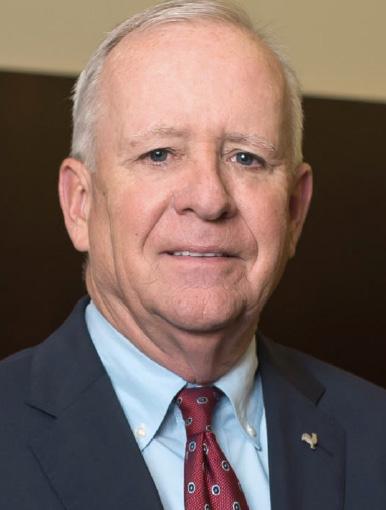

By KD Reep
or years, Arkansas has faced a pressing shortage of veterinarians, leaving animal owners, farmers and communities in dire need of veterinary care. For a rural, agricultural state like Arkansas, the lack of an in-state veterinary school seemed like a missing piece to a puzzle.
That is about to change with the planned opening of two new veterinary schools, one public and one private — the Arkansas State University College of Veterinary Medicine in Jonesboro and the Lyon College School of Veterinary Medicine in Cabot. The schools represent a monumental step toward filling the veterinary gap in the state while offering aspiring veterinarians the opportunity to train closer to home.
Arkansas currently ranks among the lowest in the country for the number of veterinarians per capita. According to Dr. Brian Barron, a practicing veterinarian and owner of Shackleford Road Veterinary Clinic in Little Rock, the shortage has made it difficult for clinics to find qualified professionals.
“When I put out a job posting for a veterinarian, I never get more than one applicant,” Barron said. “We absolutely

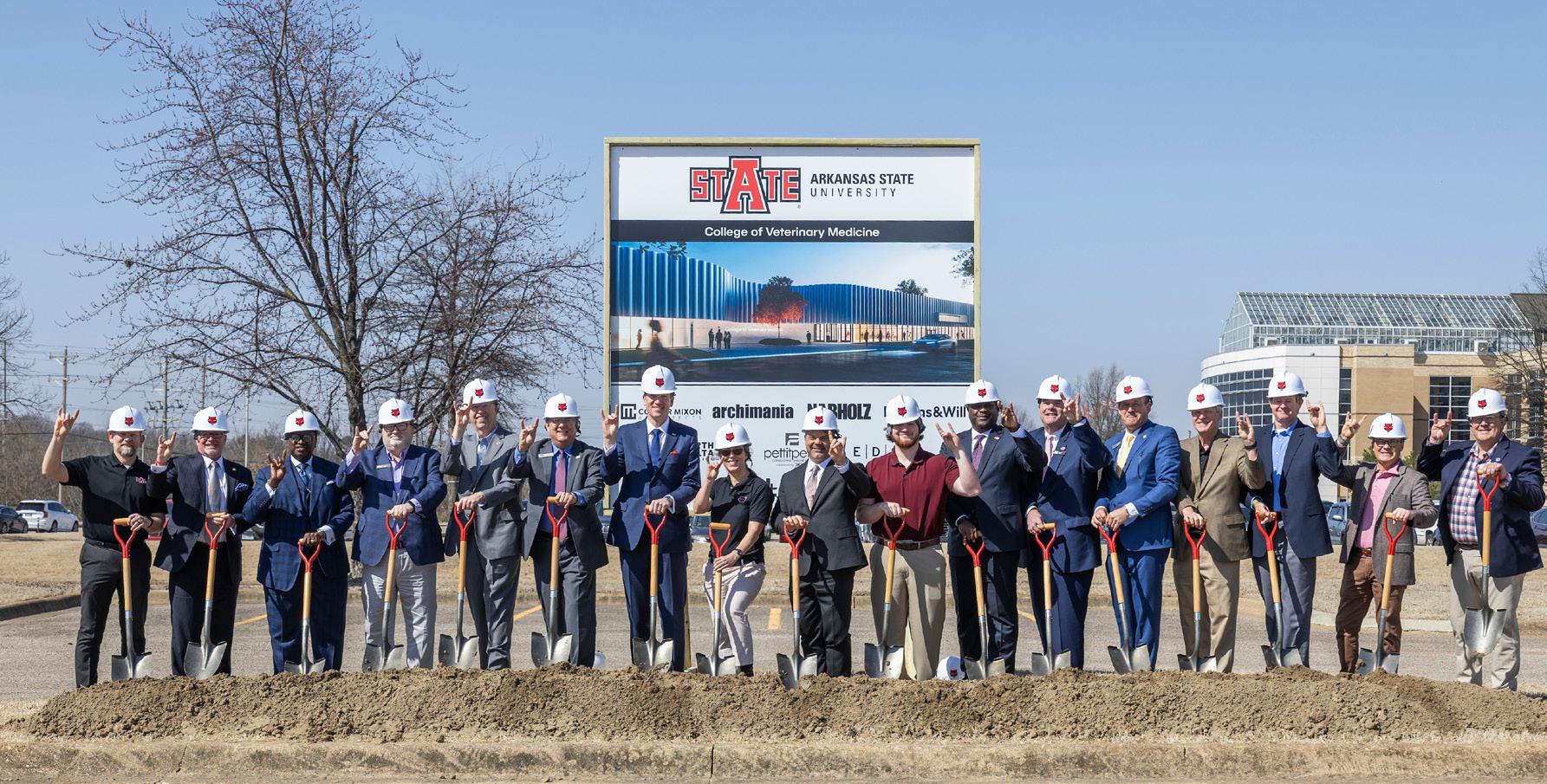
needed at least one veterinary school, so having two is a huge step forward.”
One major reason for the shortage is that Arkansas students who pursue veterinary medicine must attend out-of-state schools, and many do not return. With two in-state schools now opening, more students are likely to remain in Arkansas, helping to address the gap in veterinary services, particularly for rural and agricultural communities.
The Arkansas State University College of Veterinary Medicine slated to open in fall of 2026 is designed to provide hands-on training through a distributive model. Students will spend their first three years on the ASU campus, followed by a full year of clinical training at affiliated veterinary practices throughout the state. Dr. Heidi Banse, dean of the school, highlighted the advantages of the model.
“Students tend to stay where they are trained,” Banse said. “By embedding them in Arkansas veterinary practices during their clinical year, we are increasing the likelihood that they will build careers here.”
ASU’s veterinary school will be housed in a state-of-theart, 56,000-square-foot facility featuring anatomy and surgical labs, clinical skills training areas and flexible-use classrooms. Additionally, ASU has established partnerships with the Northeast Arkansas Humane Society, the Arkansas Biosciences Institute and the University of Arkansas System Division of Agriculture to enhance students’ hands-on experiences.
Lyon College’s veterinary school, which is also expected to welcome its first class in 2026, is taking a slightly different approach. As a private institution, it has greater flexibility when implementing innovative education methods. Dr. Eleanor Green, founding dean, said the ability to adapt quickly is a key advantage.
“At Lyon, we have the freedom to be nimble and innovative in ways that traditional public institutions sometimes cannot,” Green said. “We’re building a program that will set new standards in veterinary education.”
The school will share its new facility with Cabot Animal Support Services and feature a veterinary teaching hospital on-site. LCSVM places a special emphasis on shelter medicine, a field in high demand due to the increasing number of animals in need of medical care.
While both schools aim to increase the number of veterinarians in Arkansas, their focuses vary. ASU has a strong emphasis on creating veterinarians that are day-one ready and will provide training across the breadth of species, including large animals such as horses and livestock. ASU is building a curriculum, designed to be on the cutting edge of veterinary medical education, ensuring students are prepared for entry into practice. As a public institution, ASU has also committed to reduced tuition for Arkansas students.
Lyon College, on the other hand, is expected to concentrate more on companion animal medicine and shelter medicine, reflecting the growing demand for pet health care in urban and suburban areas.
Barron, who has signed up to be one of the clinical training sites for students, sees benefits in both models.
“ASU will likely lean more toward large-animal and production medicine, which Arkansas really needs,” he said. “Lyon, being private, will probably focus more on small-animal medicine and innovative care models. We need both.”
The impact of these new veterinary schools goes beyond filling job vacancies. Both institutions are expected to contribute significantly to Arkansas’ economy by attracting students, creating jobs, and supporting local agriculture and pet industries.
Green emphasized the broader benefits of LCSVM.
“Veterinary schools don’t just train doctors; they also create research opportunities, improve public health and boost local economies by fostering small businesses,” she said.
Similarly, Banse said ASU’s program is deeply community focused.
“Our program is supported by veterinary practices and organizations across the state, and, in turn, we will be graduating veterinarians who are ready to serve their communities from day one,” she said.
While the opening of these schools is an exciting development, challenges remain. It will take at least four years before the first graduates enter the workforce, meaning the current shortage will persist for a few more years. Additionally, ensuring that both
schools have adequate faculty, funding and clinical training sites will be crucial to their success.
“There will be a learning curve,” Barron cautioned. “When you go from having no veterinary schools to two, it’s important to make sure resources aren’t stretched too thin, but overall, this is a major win for Arkansas.”
With veterinary medicine playing a critical role in public health, agriculture and pet care, the establishment of these two schools marks a transformative moment for Arkansas. They will not only educate the next generation of veterinarians but also ensure that more Arkansans have access to essential veterinary services.
Green summed up the significance of these developments succinctly: “This is an investment in the future of Arkansas — its youth, its economy, its communities and, of course, its animals.”











By Dwain Hebda
If one were to paint a portrait of optimism beyond all rational argument, it would be of the American farmer or rancher against a backdrop of everything the family owns tied up in land, family and faith. Between sky-high materials costs, vagaries of weather and animal health, a shriveling labor force, and wide swings in commodities prices, there are few professions this side of working a bomb squad that are riskier than being a farmer. Farming is hard, physical work played out over long hours in all kinds of conditions and demands a dizzying range of skills, aptitude and plain old grit and gristle to see each year through.
It would stand to reason that a profession solely responsible for providing that which keeps the planet fed, clothed and enjoying many of the products of modern life would be protected at all costs, but such is not the case — and has never really been the case. For nearly 100 years, the number of farmers in the U.S. has been on the wane, and for roughly half of that time, the industry has been in real trouble. What the Great Depression did not kill off, the Great Farm Crisis of the 1980s nearly finished as millions of family farms cracked under debt and depressed market prices.
True to form, the farming community fought back time and again, holding operations together with baling wire and a spot weld even as children of the farm grew up and moved away to seek literal greener pastures, but

staunching the bleeding goes only so far. The U.S. Department of Agriculture reported in March the number of U.S. farms slipped to 1.88 million in 2024, down from 2.04 million in 2017 and a 90-year march from the industry’s high point of 6.8 million farms in 1935.
The number of acres in production is also shrinking, down to 876 million total acres last year. The average farm size in the U.S. was 466 acres in 2024, slightly larger than the 440-acre average of the early 1970s, while the U.S. and world populations have increased 139 million and 4.5 billion, respectively, over that same span. That alone testifies to the miracles of innovation and efficiency that typify American agriculture, where far fewer producers feed far more people from working roughly the same sized patch of ground.
About 9.8 out of 10 farms today are of the family-owned variety, and when asked, 8 out of 10 current producers are clear about what they would like as a legacy for their operation — to pass it down to the next generation. Fewer and fewer are realizing that dream, so for the ones that do, it is a real accomplishment.
Arkansas Money & Politics, with the help of Arkansas Farm Bureau, tracked down some of the more fortunate ones in Arkansas, families that have worked the same ground, fed the same world and felt the same pride for generations. We salute them all for their work and sacrifice in service to the rest of America.
To the uninitiated, the cattle that Dennis Broadwater and his daughter Laura Keller tend to on the family farm look like any other bovine, but they are not. The bloodlines of the cattle trace back to Broadwater’s grandparents’ herd, making them — as much as the pasture on which they graze, the ground where Broadwater grows his own hay and the people who make it all work — part of the family story played out season after season.
“Well, I’d say for the most part, we’re pretty traditional,” Keller said. “A lot of the things that I do on the farm, I’ve learned from either my grandpa or my dad, but a few things, we’ve added. We’ve put in some embryos this last spring, so that’s sort of a new avenue we’re taking to improve our genetics. I sort of had a hand in that, I guess.”
The 470 acres of land outside of Batesville has seen great change over six generations of family ownership. Established by the late John T. and Annie Holmes Broadwater, Dennis great-grandparents, it was continued by the late John Robert and Mabel Hodges Broadwater, who Dennis recalls farming the White River bottoms with mules to raise corn and cotton, as well as some cattle.
Broadwater’s parents introduced a trucking company into the family mix, as well as a poultry operation that would eventually grow to 20,000 laying hens for producing broilers. Changing times and changing market dynamics led the family into focusing strictly on cattle while looking elsewhere to diversify revenue streams. Both Broadwater and Keller have master’s degrees, another element that stands in sharp contrast to previous generations.
Dennis Broadwater and Laura Keller
Independence County
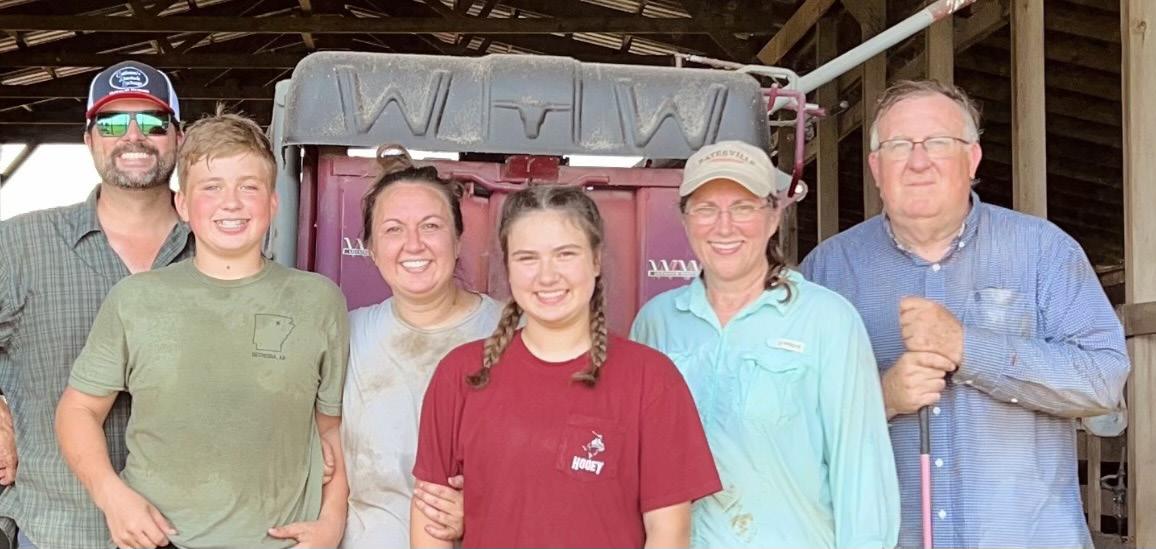
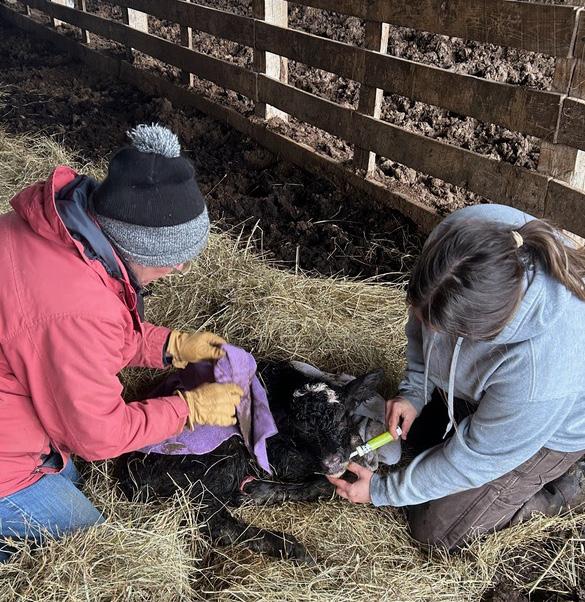
“I’ve taught at the community college for years. I was the director of the student success center here, and I helped all the students with tutoring,” he said. “I really wouldn’t say I applied my education to farming, but it helped me keep a job outside of farming to keep the farming going in the hard times. Right now, cattle prices are really high, and we’re doing well, but we’ve had a lot of lean years that if I hadn’t had my job, I wouldn’t have been able to keep the farm going.”
Keller, who attended Harding University in Searcy on a basketball scholarship, has long since started her kids in the family traditions in hopes that one of them will

embrace the line of work and take the farm into the future as she has chosen to do.
“I just feel so blessed to get to raise them here and for them to have the foundation of growing up on a farm,” she said. “I really feel like there’s no better way to raise your kids. There’s so many life lessons that they learn. I would love for them to come back here one day, but really, I just want them to follow their dreams. If that meant coming back here, of course, I would be happy, but I’ll just support them in whatever they want to do.”
additional acres and inspired his sons, Roy Jr. and Randall, who followed their father into the family business.
In 1972, the elder Roy Coleman died suddenly of a heart attack, just days after helping get Randall set up with a loan to continue the family legacy, which he has done with the help of his son, Mark.
“My dad was 64 years old and wanted to retire,” Randall said. “My brother had started farming, and Dad had helped him. My brother talked to Dad, and he came me and said, ‘I heard you wanted to farm.’ I said, ‘Well, I thought about it, Dad.’ He had a game plan. He put together how to get me started in farming, but he actually died before he ever signed the loan. After he died, I wondered if I could even get a loan, so I went to the bank and talked to them and told them what my game plan was.

The Coleman family epitomizes the kind of familial commitment and perseverance that the farming community is known for. Robert “Roy” Coleman arrived in Arkansas from Missouri in the 1950s with $1,500 hard-earned dollars he used to purchase 80 acres. That act of faith staked the family ground that led Roy to eventually accumulate
“I remember my loan officer going back to talk to the president of the bank. He was coming down the hall, and he walked up and talked to him. Guy was a big fella, 6-2 or so, and he looked at me and nodded his head, and the loan officer turned around and gave me the crop loan.”
The Colemans have done that act of faith proud ever since, successfully growing the family farm into 1,900 acres of rice and soybeans. The journey has been anything but easy, and the challenges have continued right through to the present day.
“When I started, you could make a living farming 300 acres,” Randall said. “Now you’ve got to farm such a large volume to pay for the equipment, and there’s a lot more pressure because you’re handling several thousand dollars now. Before, when I started farming, I borrowed $11,000 the first year, and I got, I think, three tractors. Now that don’t even begin to touch the interest on a crop.”
Despite the stiff challenges, Mark never doubted he would take up the family business.
“I just enjoyed working on a farm when I was a kid,” he said. “I knew it was hard work and everything, but I just enjoyed it and thought that was the lifestyle I wanted to get to eventually.”
Mark said while there is much about farming that has changed, there is at least as much or more that remains the same from his father and grandfather’s eras.
“Now you’ve got a lot bigger equipment and a little bit more technology, but the bookkeeping and finances are still critical,” he said. “Dad was always real particular on bookkeeping and finances, where other guys went out there and spent whatever they had as soon as they did it. Being efficient in how much you spend and when you sell things is as important as ever.”
Like many young producers, brothers Joseph and William Mencer have their hands full getting a crop in, be it cotton, corn, rice or soybeans, all of which they produce over several thousand acres outside of Lake Village. Unlike many of their peers, however, the duo does not have to look very far for inspiration or advice. Their father, Joe, has been a critical link between his sons and the progressive ideas of the two generations before him.
“Our great-grandfather was somebody that believed in new technology out here, even in the 1930s,” William said. “A lot of this land still had timber on it, swamps, and he was one of the first ones out here to put a saw in the front of his tractor. He would help clear his own land and his landlord’s and his neighbors’. My grandfather kind of did the same thing in his own way, and Dad was always an adopter of new technology.”
“Today, ag technology includes artificial intelligence, big data, autonomous tractors, drone technology — that kind of stuff,” Joseph said. “That’s the future, and William and I have our finger on the pulse of that. We’re trying to implement some of that. It’s in our DNA to adapt and use technology to see where it’s heading and be on the cutting edge of it.”
Joe, Will and Joseph Mencer Chicot County

The ongoing family philosophy not only pays off in the field but in landing the best price possible for the crops produced. In 2022, Joe was recognized by ICE Futures, formerly the New York Cotton Exchange, and BASF with the Joseph J. O’Neill Cotton Marketer of the Year award. He said the secret of the family’s success lies in cooperation.
“I’d say as far as us working together, we’ve done a good job of everybody kind of knowing their role and everybody having that sense of accountability,” he said. “There is a sense of you standing on your own two feet, and we have that mutual respect, but we also lean on each other, you know? There is a sense of accountability and being independent and carrying out your work, and I think that’s one
thing that helps us all work well together.”
One of Joe’s specific strengths has been in advocacy work, which he has done through the Arkansas Boll Weevil Eradication Foundation, where he has served as chairman, as well as the USA Rice Council and others, service that would not be possible without family to manage dayto-day farming operations.
“I’m very proud to have them out here with me as I was with my father and for me to be here with them,” Joe said. “I think every generation of our family has looked at it the same way, that you’re very fortunate to be able to work with your family and keep something and continue to grow it. Every generation has a place out here, and it takes every generation to keep it going and keep it together.”
Mark Morgan Johnson County
Describing the history of his family’s turkey, cattle and peach-growing operation near Clarksville and Lamar, Mark Morgan shared a tidbit of family lore that is exceptional on several levels.
“We’ve got a receipt in the family Bible that goes back to 1890, when they first bought peach trees,” he said. “Commercially, it started in the early 1900s, around 1910 or so.”
The tidbit is telling not only of the family’s longevity but of its faith, given the history recorded in the Good Book. Farming is daunting enough, as Morgan is quick to agree; farming without faith is damn near impossible.
“I’ve always been one that’s like, ‘Hey, deal the cards, and I’ll play however they’re dealt,’” he said. “It’s like, here, you’ve got these circumstances. Make the best of it. That’s the way I was wired.”
In fact, had Morgan’s original hand played the way he had envisioned, he likely would not have come home to the family operation at all.
When Morgan returned, he joined forces with his father, Steve. That arrangement does not work in all father-son relationships, but the duo found a mutual respect that allowed the wisdom of the elder to blend with the new ideas of the junior. The combination worked so well that in 2016, they were honored as Arkansas Farm Bureau’s Farm Family of the Year.
“I was very fortunate,” Mark Morgan said. “My dad and

“When I went to college, I went to U of A, and my major was ag business, animal science. I did not want to come back to the farm,” he said. “Even when I graduated with my undergrad degree and it was coming up time to look for a job I didn’t want to come back to the farm then. I got a master’s degree, and I traveled a lot, working in animal science, and during that job, that’s really when I realized, you know, the pathway to the farm was still there.
“The way my personality is, I had to go do something else before I realized what I missed, and you know what? It drew me back. I came back to the farm in 2009.”
my grandpa ran this operation for a long time, and it really takes two or more people to manage it. When my grandpa got sick and passed away in the late ’90s, Dad held on to all three things, peaches, cattle and turkey, so it was there for me to come back to and be very useful.
“Dad was always great in that anytime I had an idea or wanted to try something, he was open to that. I know a lot of people that grew up in the, ‘We’ve always done it this way; that’s how we’re going to do it,’ mentality. You know, a lot of the things we still do like we have been doing forever because that’s the best way to do it, but he was always open to new ideas, which is a credit to him.”
As proud as he has been of his family’s multigenerational legacy of farming in White County, David Martin said he never had any expectations of his daughter, Dana Stewart, to carry it on.
“It’s hard to maintain our farm family and farm life here,” he said. “I let her make that decision on her own.”
Of course, Martin was not exactly hands off when it came to exposing Stewart to farm life, largely out of necessity.
“From the standpoint of getting the kids involved when they were little, they were all involved. We had them involved from the time they could walk,” he said. “I think Dana actually showed her first calf at the fair when she was 3 years old.”
Whatever it was, it took hold, and today, Stewart said there is no doubt she is doing the work she was born to do.
“It’s part of my family legacy,” she said. “A lot of people talk about farming being in their DNA, and for me, that’s very true. My parents gave me opportunities on the farm, and I fell in love with the work. I fell in love with every season, getting to see a new batch of baby calves being born, the seasons on the farm. I just really fell in love with that.”
David Martin and Dana Stewart White County
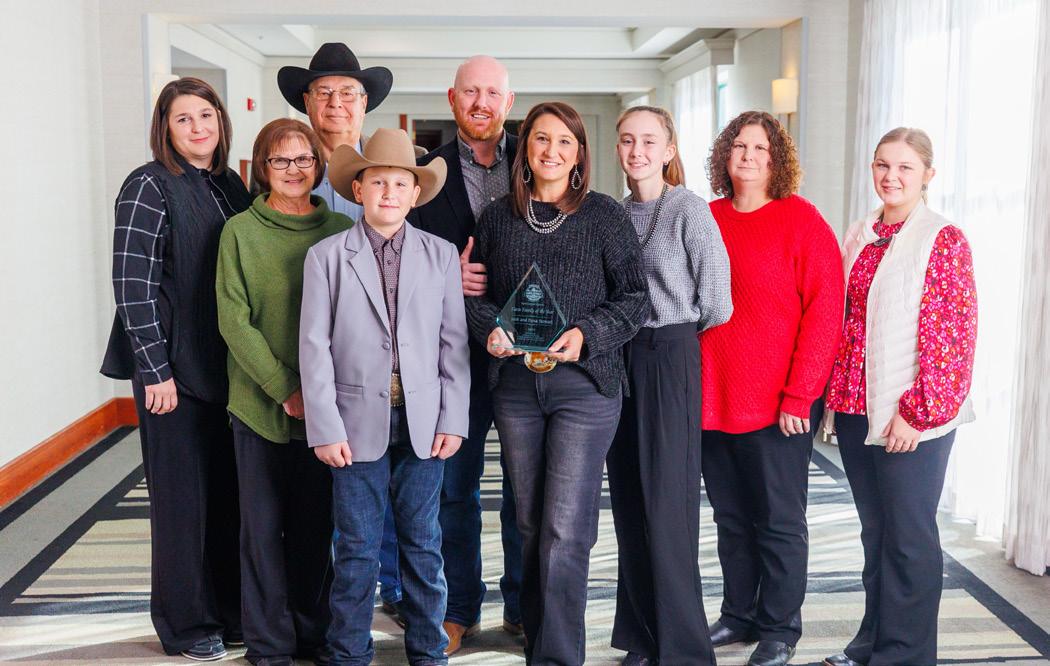

Martin Cattle Co. deals primary in raising and selling bulls to other producers. The outfit has about 125 head of cows with calves at side and, in addition to selling 30 to 40 bulls per year, sells bred heifers as they are replaced from among their own stock.
More recently, the operation branched into meat goats, quickly growing a 50-head herd. The animals share 350 acres with hayfields, which the family grows for its own use with the livestock.
In addition to expanding into different species, the farm has also harnessed new technology to market its products.
“When we first started to DNA our bulls, that was one of the things that I took on to learn more about and help implement,” Stewart said. “When we started raising goats, that was one of the things that I really took charge of, as well, to learn about this new commodity, this new livestock project that we had.”
Martin said he knows little about such newfangled inventions specifically but has always advocated keeping up with the times.
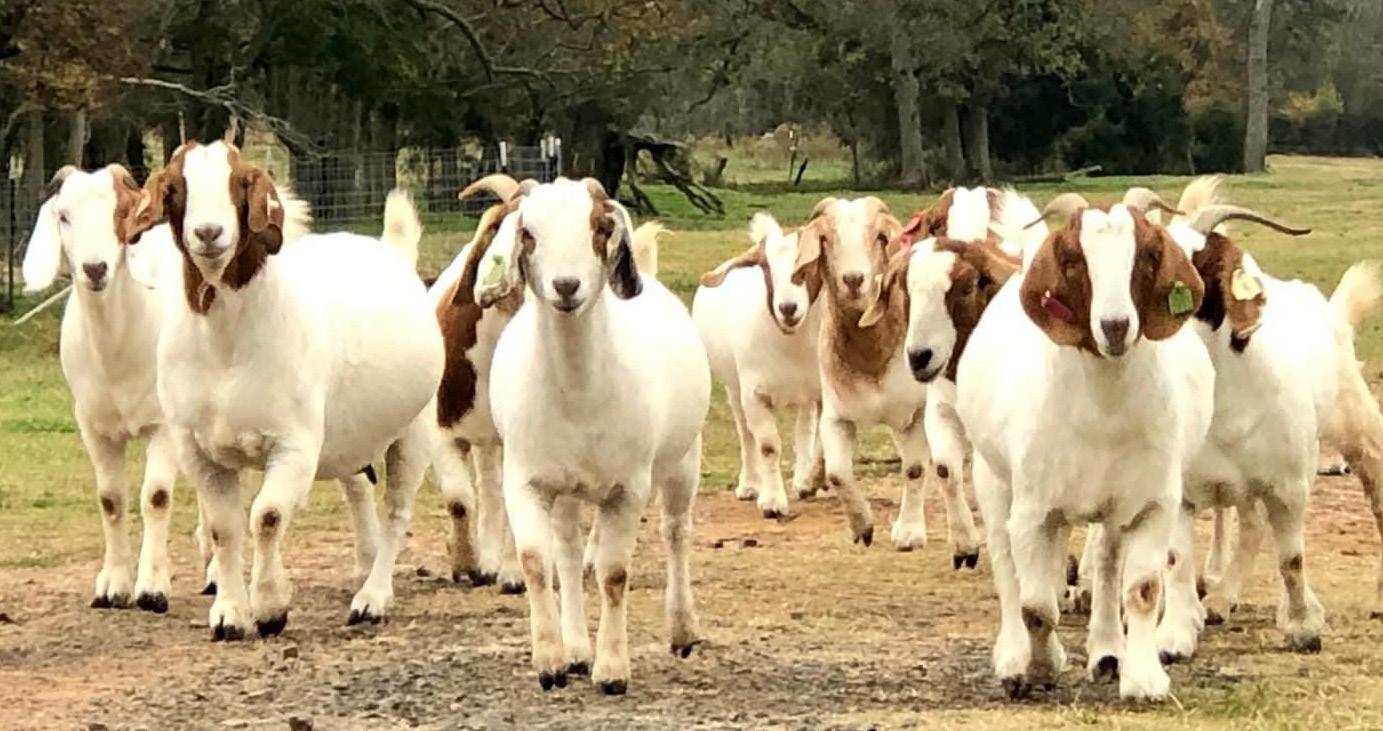
“The key is we need to stay away from what I call the farmer mentality of the past where we’ve got to keep doing the same thing we’ve done over and over that doesn’t work,” Martin said. “We cannot maintain the farmer mentality and be successful.”
Whatever future turns the operation takes, Martin takes great pride in seeing the family ground in good hands.
“It makes me feel proud,” he said. “[Dana] talks about the legacy, and our farm has had a lot of generations pass that legacy down from generation to generation. It makes me very proud to see that this farm is going to go on after I’m gone.”
By Dwain Hebda
It has been a decade since Rep. French Hill traded a successful corporate career in the Natural State for the jungles of Washington, D.C., politics, and the ninth-generation Arkansan has made the time count. Representing the Second District since 2015, Hill currently serves as chairman of the House Financial Services Committee and, last session, also sat on the Permanent Select Committee on Intelligence and the House Foreign Affairs Committee.
Despite the lofty titles, Hill has never forgotten where he came from, as evidenced by his recent legislative activity aimed squarely at preserving greater swaths of forest land in Arkansas and his ongoing concern for the state’s farmland and the people who work it.

For the former issue, Hill reintroduced legislation in February that would bring more than 2,200 acres of the Flatside Wilderness Area in the Ouachita National Forest under U.S. Forest Service management. During an interview with Arkansas Money & Politics, Hill outlined the rationale for the measure and the benefits its passage would bring to the state.
“I believe this is a major positive for Gov. [Sarah Huckabee] Sanders’ goal for greater outdoor recreation and tourism in the state,” he said. “The 2,200 acres within the bill I reintroduced [represents] the most accessible wilderness area to the Little Rock/North Little Rock/Conway metro area. You can be standing in it in less than an hour’s drive from Little Rock.”
Hill said the measure, if passed, would collect on a decades-long land debt the Feds have owed the state since the 1980s. Under the Ronald Reagan presidential administration, there was a push on to set aside such areas coast to coast, an effort spurred by the 20th anniversary of the Wilderness Act of 1964.
“Flatside’s original proposal is what we are correcting this year,” Hill said. “In that 1984 act, the Flatside acreage was severely cut back from the original proposal by conservation groups and the U.S. Forest Service. Over the past decade that I’ve been in Congress, I’ve worked to correct that and reclaim that acreage.”
This is not the first time Hill has gone to bat for the cause, clawing back 600 acres in 2019. He expressed confidence in the newest effort, pointing to its heavy-hitting lineup of diverse supporters, including Sanders, Pulaski County Judge Barry Hyde, Perry County Judge Larry Blackmon, the Wilderness Society, the National Wildlife Federation and the Arkansas Game and Fish Commission.
Hill said he was not surprised by the disparate coalition, saying Arkansas constituencies have always put aside differences when it comes to the environment.
“I’ve always believed that we have a very solid partnership between federal resource managers, like the National Park Service at the Buffalo River, the forest supervisors for the Ouachita National Forest, which is headquartered in Hot Springs, and the Ozark-St. Francis National Forest that’s headquartered in Russellville,” Hill said.
“We also have a great partnership between the federal land managers, the local land managers, and the conservation groups across the state. I think it’s a model for how that should be done around the country.”
Land use of another kind is also on the congressman’s radar, that being the state of agriculture producers. Hill has added his voice to a growing chorus from rural states calling for a comprehensive Farm Bill to assist the nation’s struggling farmers.
“An agriculture reauthorization bill’s very, very important to Arkansas farmers,” he said. “American agriculture has had three very difficult years brought about by the war in Ukraine and Biden-Harris inflation. Those items have really driven up significantly fertilizer costs, seed costs, labor costs, and global markets have been soft in a number of categories. It’s been a tough income year for farmers. Calendar year 2025 is still projected to be modestly down in total farm income, so the agriculture bill is very, very important.
“This is the time of year that farmers renew their operating lines for the new farming year. For 15 years, I was an agricultural lender in the state of Arkansas, so I know the industry quite well, particularly in rice, soybeans, corn and cotton. February and March are absolutely critical moments for Arkansas farmers to renew their financing.”
Hill expressed optimism that unlike during past sessions of Congress, passage of a sensible Farm Bill is imminent, especially given the familiar faces leading the charge.
“I’m so glad that we have [Sen.] John Boozman at the helm of the Senate Agriculture Committee, my good friend [Rep.] GT Thompson [of Pennsylvania], who chairs the House Agriculture Committee, and strong participation by our own [Rep.] Rick Crawford in the House. I’m optimistic that we will get a Farm Bill in these next few months.”
Hill also weighed in on other commercial land issues, most notably the promise of lithium production in south Arkansas, which has raised environmental concerns in some circles. He said he is satisfied that a unique convergence of factors is
minimizing those potential threats.
“One of the appealing features of the south Arkansas lithium opportunity is the distillation of the lithium from the brine fields under the surface in the south Arkansas oil fields,” he said. “In my judgment, it seems a lot more environmentally prudent and sensitive to distill lithium from brine pumped up to the surface rather than by strip mining, which is how lithium is generally derived around the world.
“I think the opportunity in south Arkansas is really interesting, and I believe it could be a successful strategic mineral site for our country done in a way that is, at the margin at least, more environmentally sensitive than operating a strip mine.”
As for garnering the needed support to move those and other measures into law, Hill, a Republican, said the recent behavior by a select few Democratic lawmakers is not generally indicative of the whole when it comes to the tedious and oftenunglamorous work of lawmaking.
“Every day, I see members on both sides of the aisle working together on many, many topics,” he said. “They may not be the most high-profile topics that make the nightly news, but on those big social or economic policy differences between the two parties, every day, members are trying to find common ground and move the country ahead one step at a time.”
That said, Hill was quick to point out the deep philosophical differences that exist between right and left, which is why he believes it is critical for the Republican majority to remember what voters called for in last November’s elections.
“Some on the left want a very, very progressive nanny state led by the federal government, while Republicans, for the most part, are for smaller, less intrusive government, with the private sector and individuals driving the agenda,” he said. “You saw that with the issue of the border. The argument that Democrats made in the national campaign last year was we had to have this level of funding, we had to have this law passed. President [Donald] Trump secured the border, really, without any action by Congress because he simply enforced the existing laws.
“I think that’s what so many Americans were saying — why don’t we just try to do a better job with what we have? That’s at the heart of this whole effort by the Department of Government Efficiency seeking waste, fraud and misdirected spending. That’s way, way overdue, in my view, and I think [DOGE] will produce results with the right kind of oversight from Congress.”

By Dwain Hebda
There is much about the family farm that has remained steadfastly constant through the years. The risks involved in farming, adoption of innovative methods and tools to boost productivity, and the pride of multigenerational land ownership have all stood the test of time and set the nation’s agriculture producers apart as an enduring symbol of American grit and fortitude.
In other, equally significant ways, the profile of the American farmer is changing, starting with who is in the tractor driver’s seat. According to the United States Department of Agriculture’s 2022 Census of Agriculture, women represented nearly 40 percent of the nation’s producers at more than 1.2 million farmers and ranchers in all.
For anyone who has spent any time in the nation’s rural reaches, such statistics are something of a misnomer. Women have always played a vital role in the country’s agricultural industry, working alongside their fathers, husbands and brothers in ways that put the “family” in “family farm.”
However, it is only in recent years that women have begun to assert themselves as the holder of the deed, the signature on
the farm loan and the name on the check come market time.
The USDA report noted nearly 6 in 10 farms in the United States have a female producer, accounting for 41 percent of ag sales, or $222 billion, and almost half of the nation’s 534 million acres of farmland, owned or rented.
With those numbers comes greater decision-making authority. The census found women outnumber men in the percentage primarily responsible for record keeping and financial management decisions, and the sexes are dead even when it comes to who handles estate and succession planning. While the percentage of men still dominate decision making regarding day-to-day land use/crops and marketing of the farm, women are just five percentage points behind in decisions regarding livestock.
Arkansas Money & Politics reached out to three Arkansas producers who embody that new independence and autonomy to learn a little bit about how they stayed on the land where so many moved off, never to return. The trio represent three very different approaches, but all shared the same commitment to the ground and the lifestyle that raised them and which they hope will one day pass on to their own children.
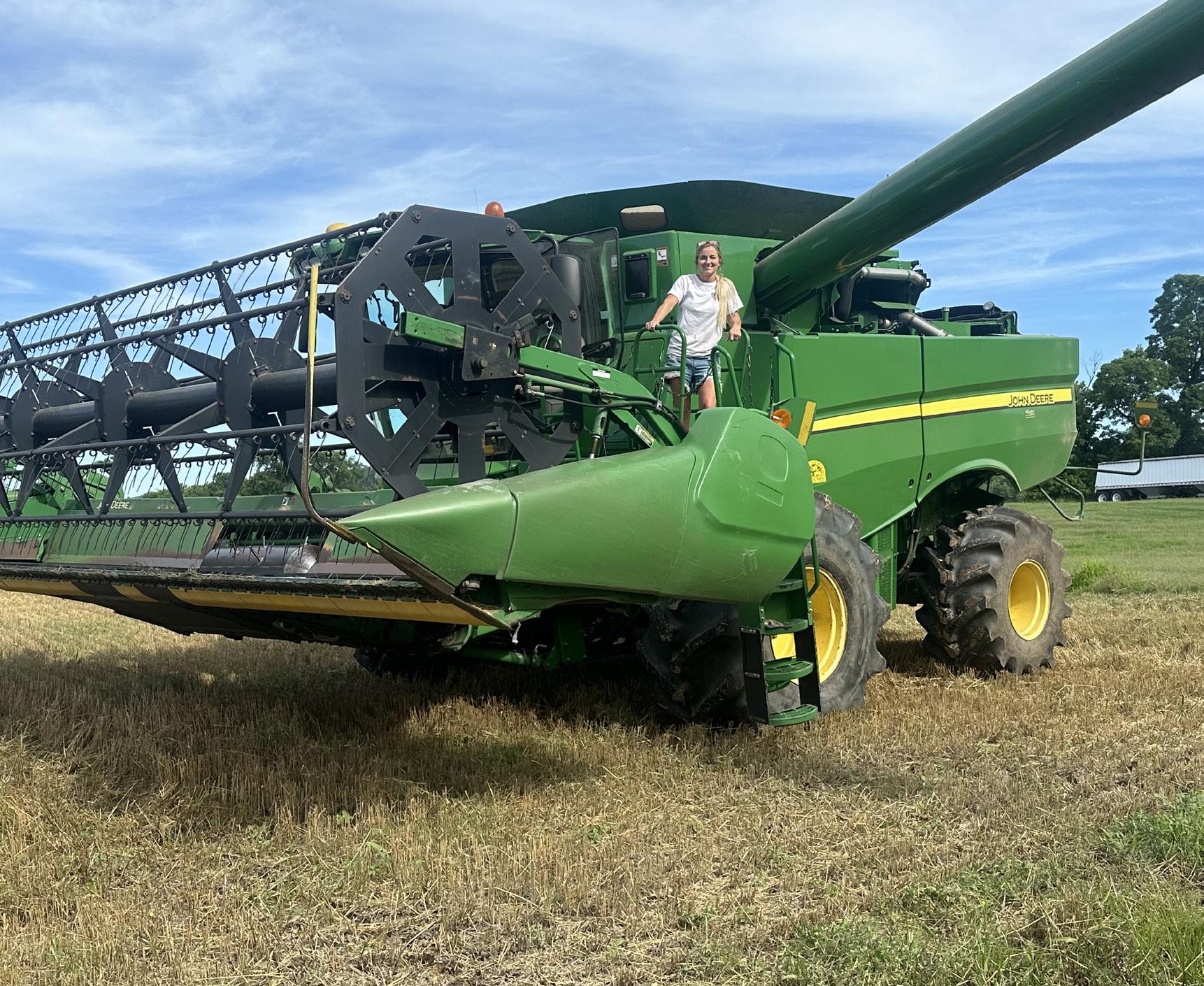
Many people outside of agriculture might look at the industry and think of people like Jill Edwards as an anomaly. Those closest to her, however, know that she is right where she was meant to be, farming 4,000 acres of rice, soybeans, corn and a smattering of wheat while managing the 400-head cow-calf operation on two separate spreads bookending Conway.
“I guess you could say I’m a typical farm kid,” she said. “My great-grandfather started our cattle farm, and that just continued through my grandfather and my dad. Then in, I want to say, 2000 is when we started buying row-crop ground. I just grew up learning everything.”
Edwards, a mother of two, is not only distinguished for being a female operator but, like many of her generation, for having earned a college degree after high school to put to use on the farm. In fact, her choice of study — business and animal science at Arkansas Tech University in Russellville — strongly hinted at her intended career, continuing the family’s H & D Tucker Farms.
“I always wanted to work on the farm, but my family really wanted me to have a degree to always have something to fall back on,” she said. “I learned a lot of valuable information going to school, especially in the animal science and the business side.”
Using what she has gained both in the field and in the
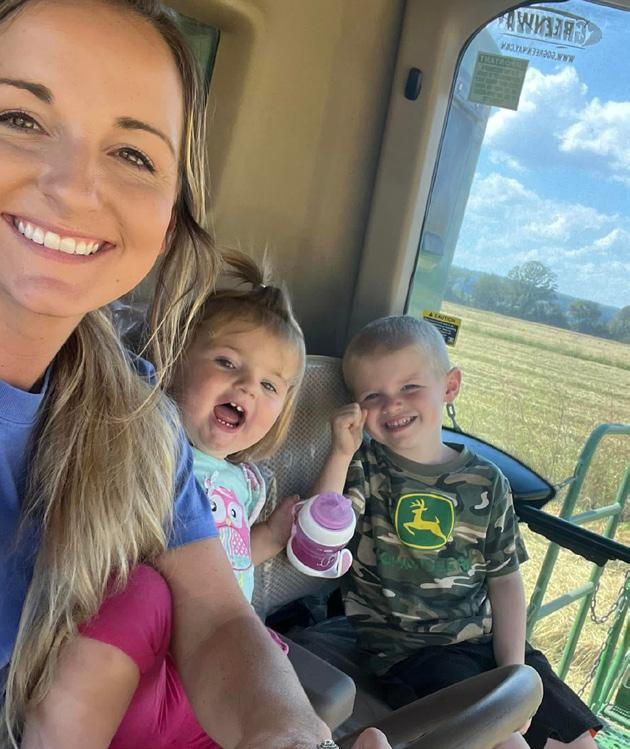

classroom, Edwards said she relishes the challenges that farming provides, of which there are plenty to choose from. It has also forced her to think differently than previous generations might have when it comes to generating new streams of revenue.
“I would say the big thing right now is trying to sell our bulk beef straight to customers. We’re really trying to up our beef sales,” she said. “When COVID-19 hit, everybody was all about supporting your local farmer, shop local, and that just kind of became the trend. We’re trying to pick up on that because we believe we will benefit more from selling it like that than we do by taking the load to the sale barn.”
The hours are long and the stakes are high in agriculture, and no one knows that better than Edwards, but she said she cannot imagine making a living any other way.
“I love it. It’s a challenge, and I like that challenge,” she said. “Something is always going on. There’s either a cow that needs attention or crops need sprayed or the hay has to be baled. I don’t see myself doing anything different. My dad didn’t have boys or anything like that, so for me, I always liked being the girl that can still do everything.”
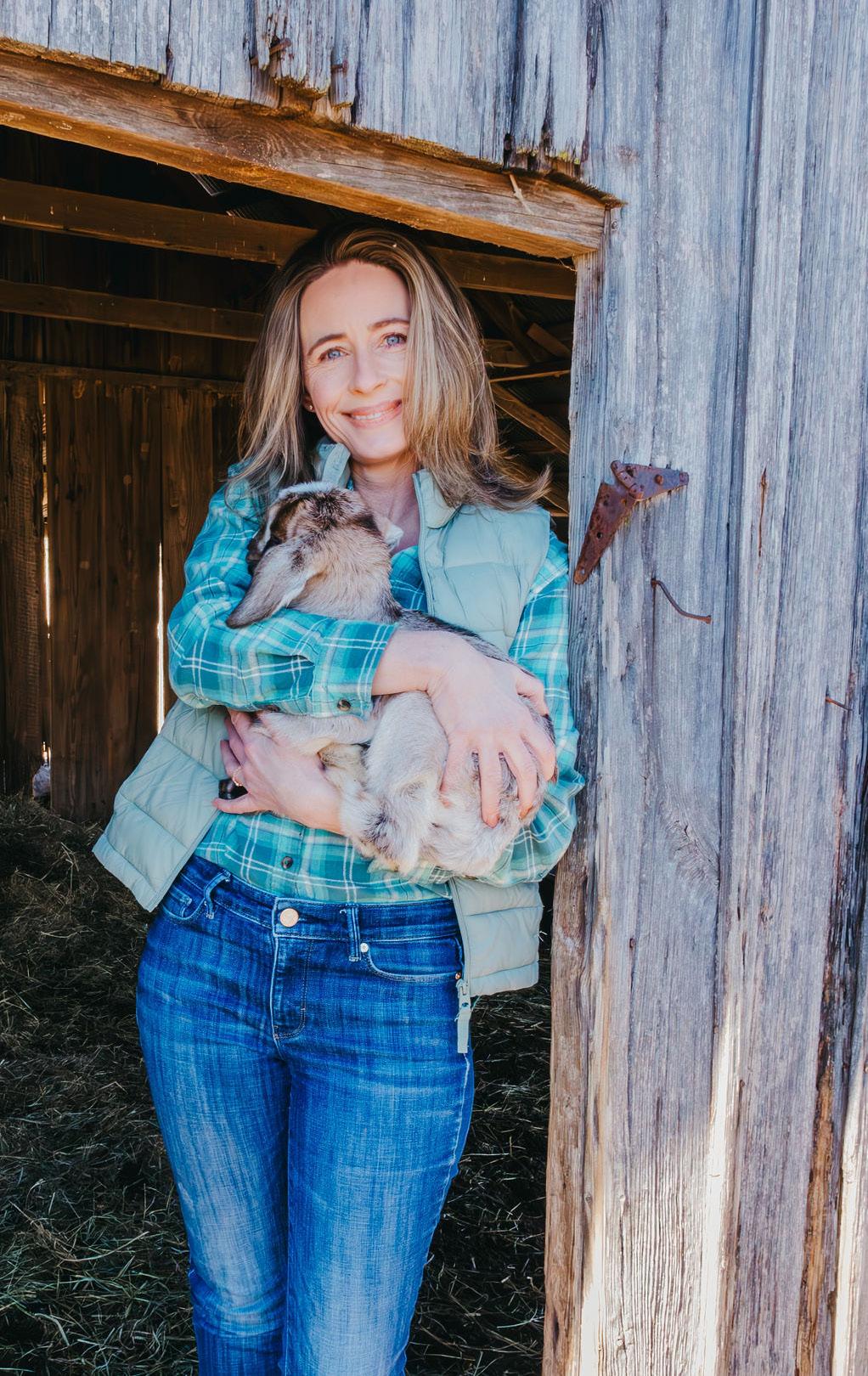
It has been said growing up in a certain industry is either a strong attractor or a powerful deterrent for staying in that industry long term. For Elizabeth Walker, the pattern was more circular, proving the old adage of taking the girl out of the farm but not the farm out of the girl.
“I grew up on a cattle and poultry farm. My mother was the full-time farmer, and my dad had an off-the-farm job at a local paper mill,” she said. “I was farm labor, as any kid growing up on the farm, and I have to be honest with you, that was my motivation to go to college and get into another career — so I would never have to work on the farm again.”
For a good portion of her time after college, Walker
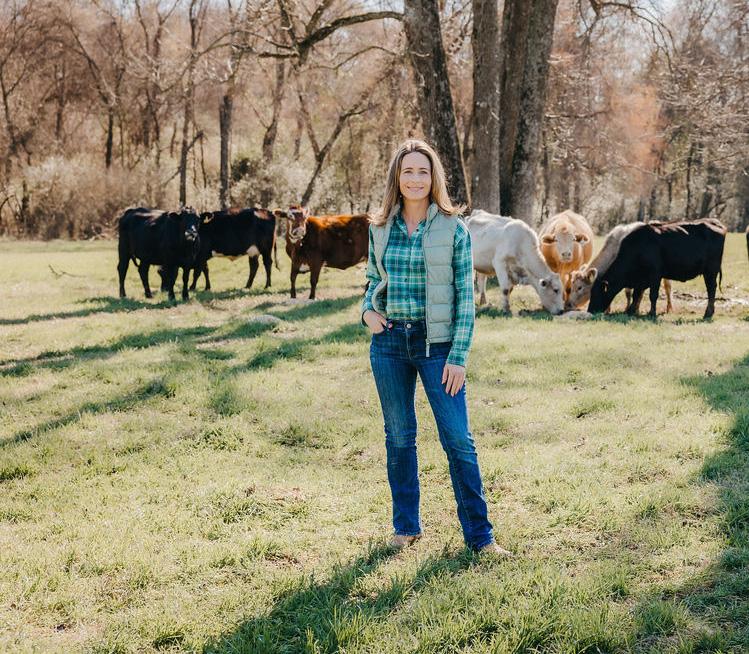
was true to her self-made promise. A chemical engineer by schooling, she was highly sought after and had seven job offers across the country. Initially tempted to bolt her home state, cooler heads prevailed, and she ultimately took a job in Ashdown with a paper company.
“Ultimately, Arkansas was home,” she said. “As you mature, you kind of realize what’s most important in life. When I think about the last 23 years and what I would change, there’s very little that I would change about my decision to come back to smalltown Arkansas.”
Walker would find herself not only staying in Arkansas but returning to the farm thanks to her husband, Brian.
The couple started the hard way, without inherited land on which to start, which is how many brand-new operations get going, given the prohibitive cost of farmland. The early years of Lucky 13 Farm were adventurous, and things grew slowly but grew nonetheless.
“Our first home was an $8,000 mobile home that was parked right beside the chicken farm,” she said. “I remember when we went to get our second loan, money was tight. We were, like, listing anything we owned of value to get that second loan. We even mortgaged our guns.”
Today, the family tends 1,800 acres, including four poultry houses, plus a cow-calf operation, meat goats and just-added honeybees. A mother of two, Walker laughs at the memory of the early scraping-by days but not without a note of pride in her voice.
“We really did take a leap of faith, and that’s what farming is,” she said. “It wasn’t like we were just going to say, ‘OK, we quit.’ We had other options; we’re farmers by choice.”
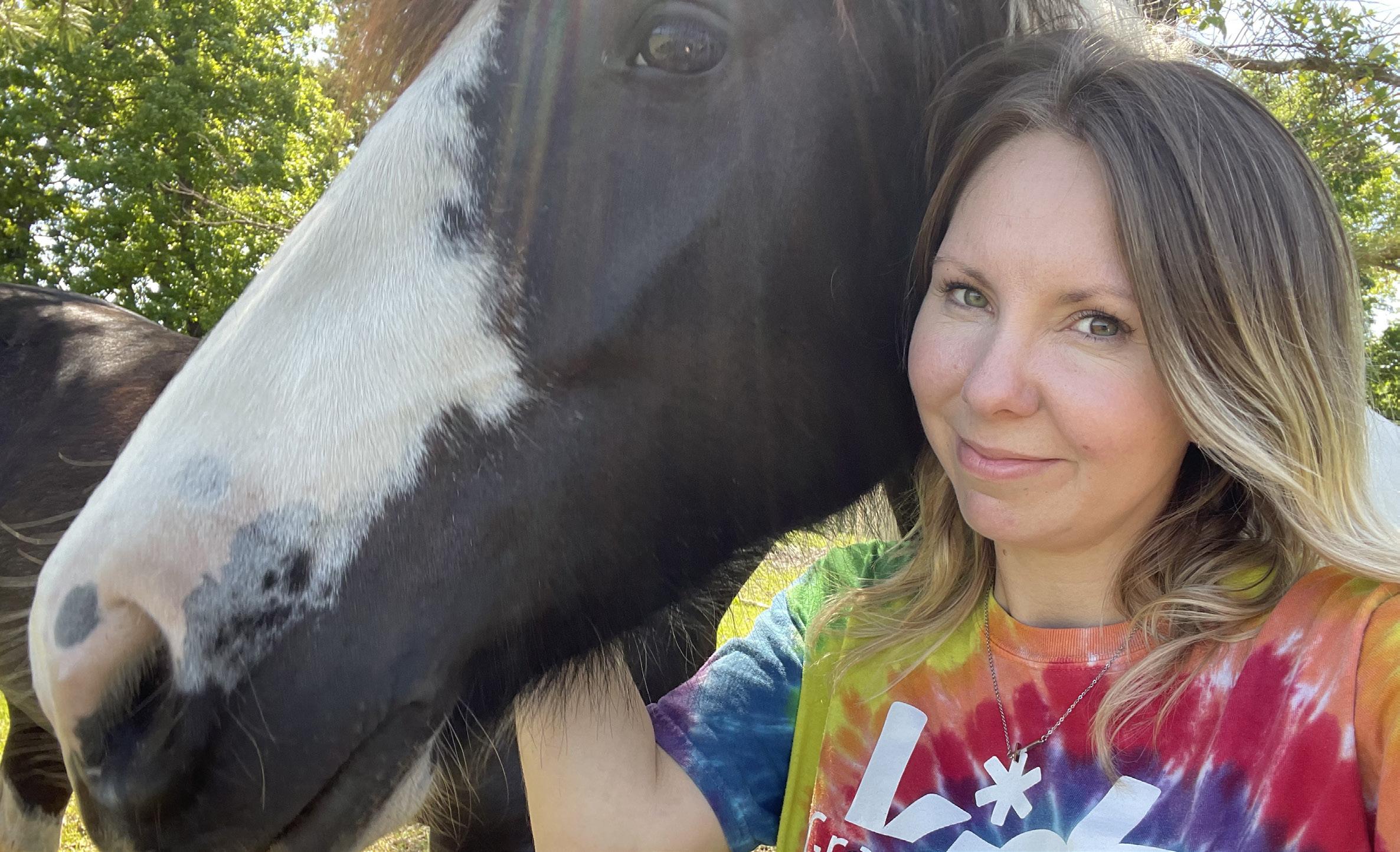
n hindsight, Tia Broderick should have seen her career in agriculture coming. After all, one does not grow up in a family six generations deep in the land and not develop some affinities of their own.
Yet it was not until after a stint as a military wife and a spin at selling real estate that she returned to Sebastian County to launch the Farmhouse on Persimmon Hill. As a matter of fact, had it not been for a life-changing incident, that dream might never have come into focus, let alone come to pass.
“I made great money doing real estate, and then I decided it was too much of a headache,” she said. “When our house was in a wildfire in 2018 in Colorado, we decided we’d move back to Arkansas, and that is when we bought our house here. We were gifted a lamb as our housewarming gift when we moved onto the property.”
From that single lamb grew the Farmhouse, which today deals in Katahdin hair sheep for breeding, meat and individual animals and Kunekune pigs for breeding stock and meat, as well as selling raw milk from a herd of dairy cows.
Broderick’s choice of revenue streams, not to mention the farm’s Pinterest-worthy website extolling the virtues of nouveau farm living, demonstrates the ethos of the state’s new agriculturalists. The emerging subgroup are people either returning to the land as boutique producers or who simply want to immerse themselves in bygone traditions.
“We teach classes on how to farm, how to create a legacy and building your knowledge base,” she said. “I’ve had people come to me and ask boatloads of questions who needed answers they couldn’t find on YouTube or TikTok. They needed someone in person to learn from. That’s where the educational part became such a big thing for us. We wanted to feed families and help them learn how to feed themselves.”
Now immersed in her life as a producer with her husband and three children, Broderick finds joy in her daily life, one she admits she never saw herself doing after leaving home.
“When I graduated high school, I was married at 18, moved away to Colorado and said I’d never farm a day in my life,” she said. “Moving away and becoming a city girl, you approach life where you can just drive two minutes down the road and have everything you need versus going out and working for it physically every day. It’s a process that I didn’t understand as a child but one that I learned when we moved back. Now, understanding that process of where food comes from and the time that’s involved in it, it’s humbling.”
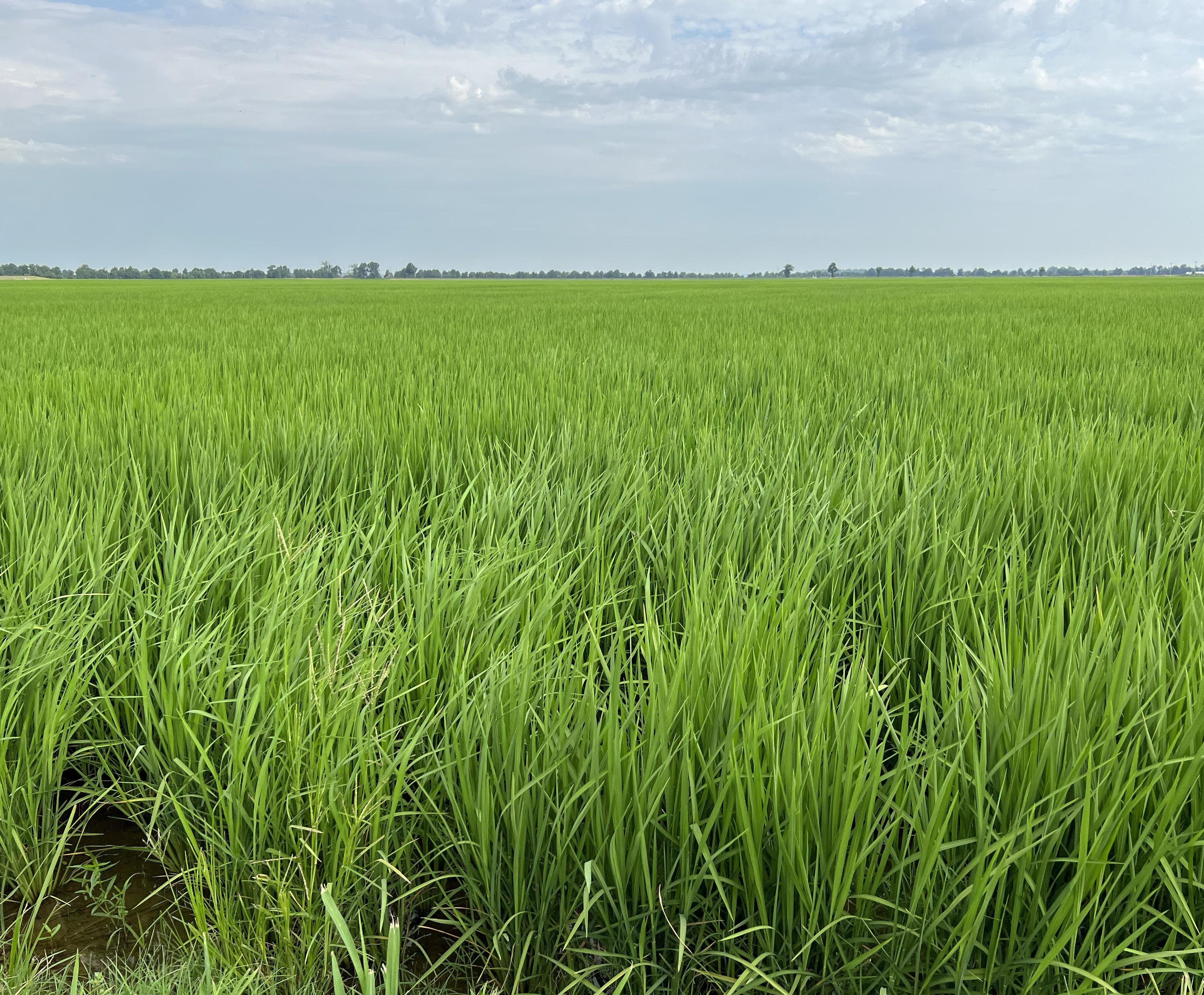
Arkansas’ farmers are no strangers to the game of wait and see — it is, in many respects, the entire basis of their business — but 2025 is shaping up to pose even greater anxiety at a time when some operations are barely making it from one harvest to the next. For two of the state’s most important crops, rice and soybeans, strong 2024 yields were tempered by price pressures and politics in a trend that seems likely to continue.
rice, soybean
look warily at the year ahead
By Mak Millard
“If you didn’t contract your soybeans out early, you probably took a price that was quite a bit less than the cost of production, even with really good yields,” said Derek Helms, president of the Arkansas Soybean Association.
Soybean yields for 2024 were excellent in many places, he said, with a good quality crop and favorable weather conditions. Between planting and harvest, however, prices dipped from close to $13 per bushel to below $10.
“By the time you throw on what was generally a negative basis, especially during harvest time, with struggles to move the crop downriver, low water levels, higher barge rates, things like that, it can really put farmers in a tough position as far as paying out at the end,” Helms said.
Dow Brantley, chair of the Arkansas Rice Federation, characterized 2024 as a pretty good year in a tough environment. Many
areas, including his community of Lonoke County, saw record or near-record yields. Ideal early growing conditions gave way to a dry fall, however, hurting quality and product values. Still, rice is what carried Brantley’s operation through the season after losing money in cotton, corn and beans.
“It’s more than environment in overall value,” Brantley said. “The collapse from what we’ve seen in ῾24 to today is the unknown, the loss of our exports. Prices have gone from $15 a hundred [weight] down into below $14. Most of that is fear of these tariffs, in countries just deciding, for some short period, I hope, not to buy.”
From an overall industry perspective, Brantley said, everyone is holding their breath for 2025. Individual farmers, meanwhile, are “planting this crop with hope and prayer” in the face of more potential losses and the toughest start to a season he has seen.
“That uncertainty is driving fear, and it’s driving nervousness, whether it’s on the farmer side, the input side, the lending, the banking side,” Helms said. “There’s a lot of fear in farm country at the moment.”
Even the threat of tariffs can have an outsized impact on farmers, to say nothing of their recent reality. Soybean producers took a hit at the beginning of the U.S.-China trade war in 2018, losing a considerable amount of business from the country, which makes up more than 60 percent of the global demand for the crop. Farmers have expanded their markets elsewhere, Helms said, but never fully recovered from the blow.
“When you’ve got to go get an 8.5 percent, 9 percent crop loan, that’s another big expense out of your pocket,” Helms said. “[With] tariffs on inputs coming back, whether that’s fertilizer or chemicals that come from overseas — if you start throwing on 10 percent to 25 percent more upstream there and then we’re getting our price cut 25 percent going down the road to ship our products, it’s going to be a tough pill to swallow.”
According to the U.S. Department of Agriculture, the U.S. is the fifth largest exporter of rice, and 40 to 45 percent of the domestic crop is exported each year. Mexico is the biggest market for U.S. rice, and Canada is only a few places behind. On March 4, Canada imposed 25 percent tariffs on a variety of U.S. goods, including rice, that “will remain in place until the U.S. eliminates its tariffs against Canadian goods,” the Department of Finance Canada announced.
“That market has been turned off,” Brantley said. “Mexico doesn’t have a tariff on us yet, but because of the uncertainty, they have stopped their buying from us, I hope, short term.”
Despite the probability of immediate negative consequences for farmers, at least some of the rationale for imposing tariffs holds water. Around 30 percent of domestic U.S. rice is imported, according to recent USDA figures, much of that coming from Thailand, India and Pakistan. The U.S. and other countries have accused India of oversubsidizing its rice farmers, forcing producers in other markets to sell at lower prices. In theory, recip-
rocal tariffs could keep Indian rice from undercutting the U.S. market, though it does not make the strategy any less risky for consumers and producers stateside.
“That waiting game is hurting us today,” Brantley said. “We need some vision and idea [of] where we’re going, and I hope that it provides us opportunity. Whether you like the president or don’t like the president, that doesn’t matter. I’ve got to hope that they can create an opportunity for us.”
Just as important to U.S. farmers is the state of the Farm Bill. In December, Congress passed the American Relief Act, which extended the 2018 Farm Bill for another year. Helms and the Arkansas Soybean Association were on Capitol Hill in mid-March visiting with legislative staff, and those discussions left him optimistic about the state of negotiations.
“Budgetary things drive everything, and you’ve got one side looking for cuts and one side that’s absolutely against cuts, so they kind of hash out where we can be,” Helms said. “There’s hope that maybe by June into late summer, we’ll have movement on a Farm Bill, that maybe by the August recess, we’ll have a Farm Bill in place or [one that] we can get passed and maybe the president will sign.”
Brantley is also positive about the chances of getting a new bill passed but understands that the House and Senate agriculture committees have their work cut out for them. Like many issues in D.C., passing updated legislation, however desperately needed, is easier said than done.
“We’re in the driver’s seat,” he said. “You couldn’t ask for a better chairman at the moment. Sen. [John] Boozman from right here, he works with us, and we work with him, but now I think he has to work through the whole system. We have the best guy on the job.”
Most urgent is the need to increase reference prices. Those figures have not been updated since the 2014 Farm Bill and were based on 2012 production costs. Raising the floor will give farmers more certainty in the face of sinking market prices. It can also
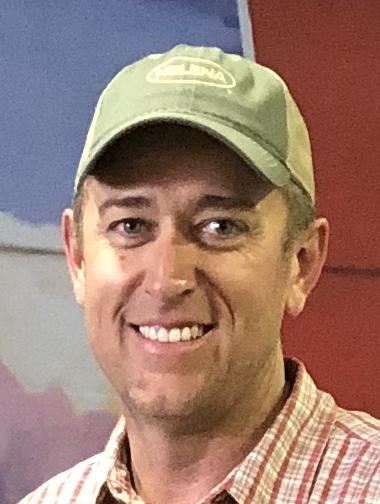

cut down on the need for ad hoc assistance, which can come later than needed for farmers already on paper-thin margins. Other considerations, such as increased lending limits, are crucial for keeping the next generation of Arkansas farmers afloat.
“With the young producers, especially now with times being as dire as they are, support through these guaranteed loans and things like that will help keep these guys with limited equity in the game,” Helms said.
Positive developments elsewhere are poised to transform the farming landscape from the ground up. Advancements in GPS, drones and artificial intelligence-driven technologies are helping farmers cover their acres more efficiently, while increasing access to minute data points allows them to make the most effective use of time, personnel and equipment.
“You can go get a decent spray drone to spray your crops, and you’re not depending necessarily in a pinch on getting that ag aviator there who may be two or three days down the road,” Helms said. “You can do it when the time is right, and it allows your timing to be better.”
The advent of autonomous and semiautonomous tractors, rather than threatening farm jobs, might actually make them more
Advancements in GPS, drones and artificial intelligence-driven technologies are helping farmers cover their acres more efficiently.
(Photo courtesy of Brantley Farms)
valuable, Brantley said. Where one of his managers today might lead four or five men on tractors, the future might see that same manager leading four or five men who, in turn, run 10 or 15 autonomous tractors. Meanwhile, research aimed at increasing crop yields, disease and pest resistance combined with less land-intensive growing practices also promise to help producers do more with less.
“We’re not out there taxing the environment the way that agriculture would have 60 years ago as far as the requirement for excess fertilizers and herbicides and other inputs, diesel fuel and things like that,” Helms said. “We’ve brought those inputs way down per bushel, and technology will hopefully keep driving us forward to bring that down even further.”
Water is an especially weighty concern for rice production, both in availability and methods for using less of it more effectively. Arkansas has an abundance of water, but sustainable practices are necessary to ensure supplies are not depleted faster than they can be replenished.
“For my farm, that’s probably our biggest advancement. … We’re building water supplies each and every year,” Brantley said. “We’re taking land out of production. We took 80 acres this past year and built a reservoir [with the] hope that reservoir should supplement a thousand acres of land.”
With pressure on all sides, the challenge for many Arkansas producers is to simply try and ride out the storm. The prosperity of the state’s rice and soybean industries, as well as its myriad other agricultural products, is not merely a matter of economic benefit. Farmers are active partners with their communities and the state in matters ranging from habitat conservation and scientific research to hunger relief. As Helms put it, “The life of Arkansas is in our rural communities.”
“We’re not asking to do this where we put a bunch of money in our pocket,” Brantley said. “We’re just trying to survive, to provide good, high-quality, low-cost food and fiber. That’s all we know how to do, and we’re pretty darn good at it. We just want to be treated fairly or taken care of when treated unfairly.”

“In the world of business, the people who are most successful are those who are doing what they love.”
— Warren Buffett
Business in Arkansas is as wide ranging and diverse as the Natural State’s beautiful landscape. The state’s reputation as an incubator for entrepreneurship and dynamic business leaders is earned, from the cluster of Fortune 500 giants in northwest Arkansas and the cradle of fintech in central Arkansas to the tens of thousands of businesses from Bella Vista to Eudora that drive the state’s economic engine.
That engine is purring like a kitten thanks to the state’s homegrown global giants, its mid-sized firms, clinics and companies, and its small-town mom-and-pops, all of which contribute to the environment that makes Arkansas a great place to do business. From aerospace to agriculture and everything in between, Arkansas industry delivers the goods. The official state nickname used to be the Land of Opportunity for a reason.
In this special sales section, Arkansas Money & Politics recognizes many of Arkansas’ best businesses and the leaders who make them run, leaders who represent the never-say-die attitude and conviction exemplified in the surrounding quotes from a couple of famous leaders.
Join us on the pages ahead, and come get to know these leaders of industry in Arkansas, these Faces of Arkansas.

“It doesn’t matter how many times you have failed. You only have to be right once.”
— Mark Cuban

RON KUHN, M.D., FROM LEFT; RHONDA GENTRY, M.D.; SAM MAKHOUL, M.D.; SCOTT STERN, M.D.; YARA ROBERTSON, M.D., FACS; MATTHEW HARDEE, M.D., PH.D; AND DONALD B. NORWOOD, M.D.
In 2025, an estimated 19,700 Arkansans will hear three life changing words: “You have cancer." CARTI understands that facing the diagnosis is an experience often accompanied by uncertainty and fear. That is why CARTI is committed to walking alongside patients and their loved ones throughout their cancer journeys.
Every year, the not-for-profit cancer care provider treats more than 50,000 patients statewide, including in rural and traditionally underserved areas. No matter where they live, CARTI offers access to leading-edge treatments and groundbreaking clinical trials, all within a single network of coordinated care, to improve Arkansans’ longterm outcomes and quality of life.
An unwavering proponent of early detection, CARTI’s team of experts educates, equips and empowers patients to take control of their health even before a diagnosis occurs. It is dedicated to ensuring all Arkansans can benefit from screenings such as 3D mammograms that catch cancers sooner, when treatment is more effective and often less invasive.

Today, CARTI offers medical, radiation and surgical oncology, interventional radiology, and an array of specialty services, including audiology, breast care, cancer genetics and risk management, dental care, imaging, urology, and more at 18 locations across the state and Arkansas’ first cancer-focused surgery center. With the addition of the Bridge, an on-site support services center, patients and caregivers can now access free programs and support groups, both in-person and virtual, designed to alleviate their stress and enhance their wellbeing.
There is no question that much has changed in cancer care since CARTI was established in 1976. However, its commitment to its mission — making trusted cancer care accessible through compassion, innovation and purpose — has never wavered. There is a reason patients ask for CARTI. When it comes to cancer, they know CARTI is with them every step of the way.

LIZ TURBEVILLE, PA-C, FROM LEFT; BAILEY POLLOCK, PA-C; DR. HAYDEN H. FRANKS; RACHEL SIMS, RN; KATIE DAVIDSON, RN; AND BARRON CHEEK, LE
Franks Dermatology is revolutionizing skin care across Arkansas with two specialized clinics designed to meet diverse patient needs. Led by Dr. Hayden Franks, the practice brings cutting-edge treatments to patients statewide, ensuring geography never limits access to exceptional care.
“We are intentional in everything we do,” Franks said. “We strive to leave nothing to chance and to provide a facility, staff and culture that provides for healing at the highest level. Our goal every day is to be the best in our field, to listen to our patients’ questions and stories, to learn and to have a positive impact on our patients and their health.”
Franks Dermatology focuses on medical and surgical dermatology, treating everything from acne to skin cancer. Many patients do not realize dermatologists treat far more
than cosmetic concerns.
"Our scope includes chronic conditions like psoriasis and eczema, skin cancer management, and hair and nail issues," Franks said. "Annual skin checks are crucial even without visible problems."
Franks Dermatology also has a medical aesthetic practice, SKN at Franks Dermatology, a medical spa to meet growing demand for cosmetic treatments. SKN at Franks Dermatology specializes in nonsurgical aesthetics, offering advanced injectables, laser treatments and specialized Hydrafacials The med spa's newest service — medical weight loss programs — supports patients on their journey to healthier lifestyles.
Whether it is cutting-edge treatments for skin conditions with biologics — specialized medications that target specific parts of the immune system — or new treatments
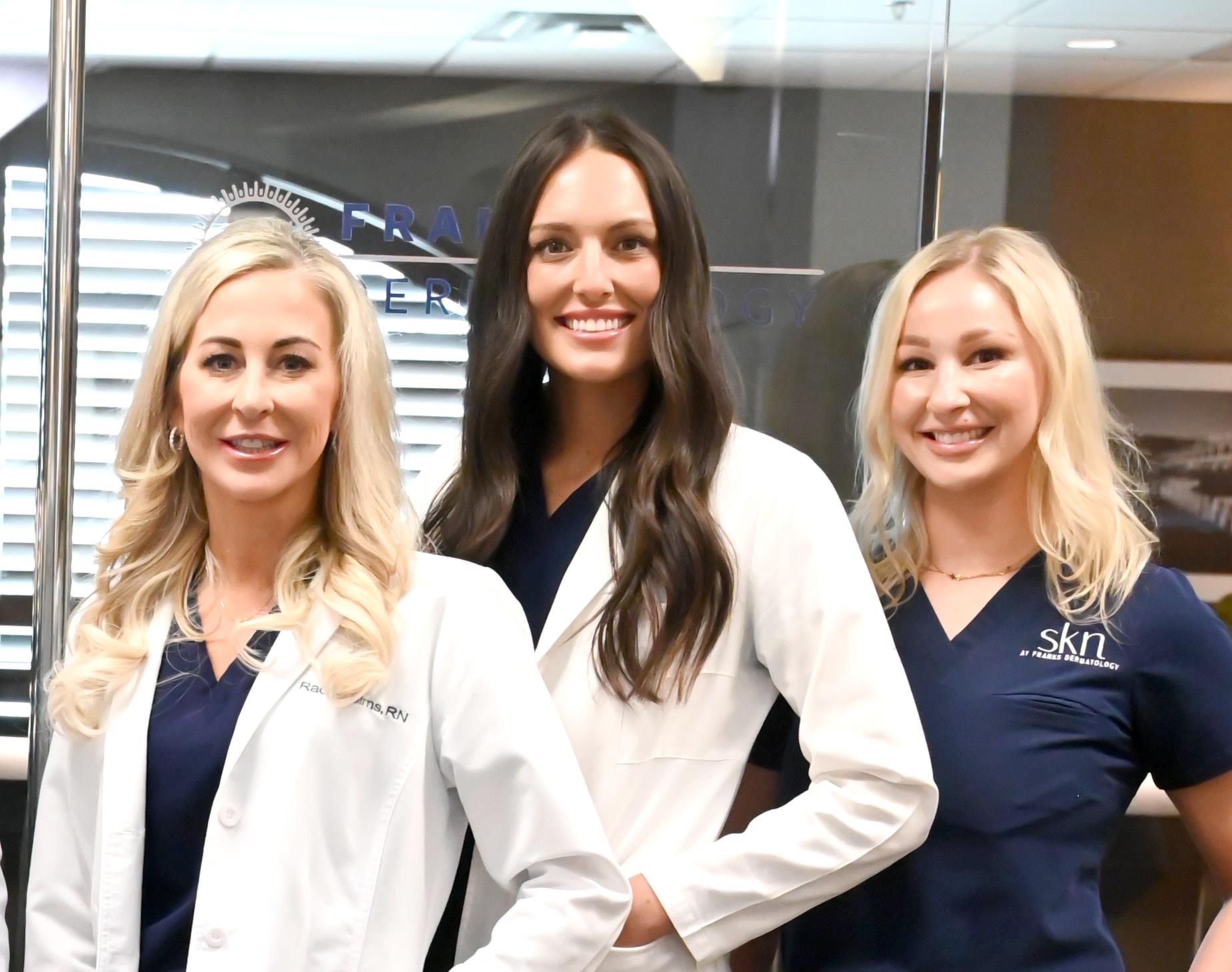
for weight loss, the teams at Franks Dermatology and SKN at Franks Dermatology continually research and learn about procedures that improve patient's lives.
“These breakthrough treatments are more than cosmetic,” Franks said. “It’s about providing life-changing treatments for patients.”
As a clinic, Franks Dermatology prioritizes continuing education to offer the most current treatments available and find innovative ways to incorporate those into the practice without sacrificing the personal attention of each patient in both practices.
“Our providers and staff at both clinics are curious,” Franks said, "curious about skin diseases and conditions of all types, curious about what could be causing a patient’s condition and curious about how we might be able to serve their needs.”
At Franks Dermatology, it is not just about treating conditions — it is about truly understanding the unique
challenges each patient faces and offering solutions that improve their quality of life. With this unwavering dedication, Franks Dermatology and SKN at Franks Dermatology continue to set the standard for comprehensive skin care in Arkansas.
FRANKS DERMATOLOGY:
• Skin cancer screenings and treatments
• Management of chronic skin conditions
• Specialized biologic clinics
SKN AT FRANKS DERMATOLOGY:
• Injectable treatments
• Laser skin rejuvenation
• Nonsurgical facial contouring
• Medical weight-loss programs
• Specialized Hydrafacials
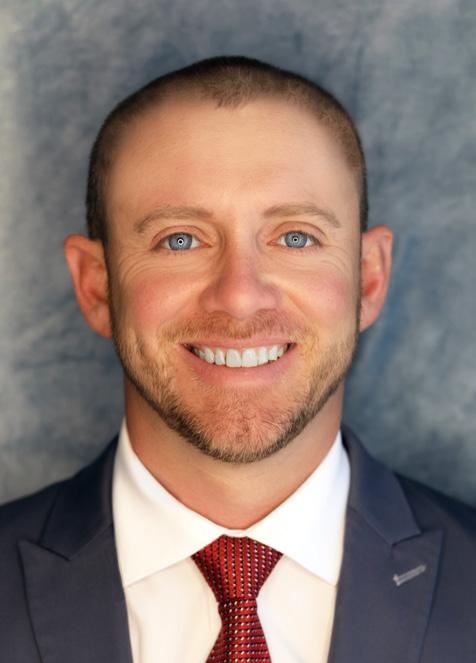

CHRIS MEYER, PRESIDENT/CEO
What has been your organization's proudest moment or accomplishment so far?
Since 2016, when I purchased the company from my grandfather, we have expanded across the state of Arkansas with locations now in Little Rock, northwest Arkansas and Hot Springs, which includes a quarry. Our workforce went from 24 employees to over 100 employees. We also offer employee health insurance and a 401(k).
What trends are you watching in your industry right now?
Oil pricing, tariffs, shifting leaders of our country. We hit our knees and pray about this a lot.
What kind of employee culture do you try to cultivate?
One that creates a safe place to communicate. I always have an open-door policy with all of our team. I welcome both personal and work-related issues.
What is something everyone gets wrong about your industry or business?
The cost of doing business. It is very hard to explain why a load of dirt costs so much. A loader or trackhoe costs upwards of $200,000 to $300,000 depending on size. A new dump truck can cost upward of $275,000, so you have to sell a lot of loads to even make payments on these machines.
How is your company or team involved in the community?
This is where JAR is built differently. We are involved in more than 15 nonprofits benefiting a wide range of organizations. We even wrap our dump trucks in the nonprofit organizations that we support so that we can help bring awareness to them.

Tell us a little more about the company. This is a new adventure for me and my family. We have the family business in James A. Rogers Excavating, but I’ve always wanted a quarry in our back pocket. The opportunity to grow our brand and move into Hot Springs really made sense to us.
What are you most proud of when it comes to the work you do?
Being able to retire my wife. We don’t live in a big fancy house, and that’s OK. We have three very active and involved boys. Knowing that my wife gets to be at every sporting event, volunteer at two schools, pick up the kids from school, etc., is peace of mind that is priceless. The good Lord has blessed us.
How would you describe your leadership style?
This has been a growing pain of mine, but it has also been the most satisfying. Looking back, I attempted to have an autocratic way of leading, which might work in a small business, but I soon realized that a growing business cannot be led like that. I started working on myself and delegated more of the responsibilities to the leadership team. This part of myself and our business plan will always be evolving.
Where do you turn for inspiration or motivation?
I rely on mentors, audio books and leadership training, but the man upstairs is my ultimate inspiration. I want to do as much good for humanity as humanly possible. Of course, family is a huge one. My biggest fault is the fear of failing. I can’t fail, and I won’t fail. I have too many people counting on me and our team — family, employees, contractors we do work for, etc.
RENA WILLIAMS, FROM LEFT, CHARLEY GARDNER, CRYSTAL SWEARINGEN, PAT MOON, DIANA HINOJOSA, JENNIFER GREER AND MARSHALL MOON
What kind of competition do you face in this field, and how does your company distinguish itself?
Competition in our space has never been greater. In addition to the wire houses that have a national presence, new technology and niche vendors have made it easier than ever for advisors to launch a practice. Being independent affords us autonomy over investment strategies that are more tailored to the needs of our clients. Most importantly, over half of our team members have been with Meridian for over 25 years. The experience of our staff helps us provide a client experience that is uncommon in our market. This is a service business, and our high client retention is a testament that we’re providing impactful service year after year.
What has been your organization's proudest accomplishment so far?
Our greatest accomplishment is longevity. Meridian was founded in 1983 and is one of the oldest independent and largest registered investment advisors in Arkansas. There have been many fine people at Meridian over the years who have contributed to our success.
What trends are you watching in your industry right now?
An important aspect of our business is a shift to holistic financial planning for the lifespans of families and next generations. In addition to investment management, we’re spending more time than ever with clients on subjects such as estate planning, tax planning and retirement planning. Our team of advisors hold accreditations across multiple domains, such as the Chartered Financial Analyst, which emphasizes investment management, and the Certified Financial Planner, which is geared more toward holistic planning. Over the years, we’ve developed an extensive network of professionals for a team approach
to building well-crafted, holistic financial plans for clients.
What kind of employee culture do you try to cultivate?
We want our workplace to be one where team members look forward to coming every day. We work hard to provide opportunities for personal growth and to form meaningful relationships. We’re in the business of serving people, so taking care of one another helps us do that more effectively. We also want Meridian to be a place where people retire from fulfilling careers. Given that over half of our employees have been with us for over 25 years, we think we’re well on our way to accomplishing this goal.
What is something everyone gets wrong about your industry or business?
Many people overcomplicate the nature of our business. There are plenty of complicated products and strategies in the world of investment management, but many of those are only suitable for a small population of people or in specialized situations. We stick to a set of principles that allow us to provide consistency in a cost-effective manner. We put a lot of effort into client education and communication. The better they understand our core investment principles, the more at ease they are with the ever-changing landscape of financial markets.
What kind of legacy do you hope this organization will leave behind?
We want Meridian to leave a legacy of caring for our clients and our employees. One of our greatest pleasures is to see our clients have so much trust in us that their biggest riches are realized outside of our office. Getting updates from clients about life events like vacations, having grandchildren and the satisfaction they get from making financial gifts is rewarding to us.


SHANNON BEDORE, CEO
How does your company distinguish itself?
There are a lot of individuals who market their knowledge of people and relationships, seemingly as a way to influence which products may launch on retail shelves. While I’m certain there are examples of where this has worked, our company takes a more structured approach to products, brands and retailers. By democratizing the expense structure associated with big-box retailers and their specific requirements — replenishment, warehousing, shipping, forecasting, billing, .com and marketing — we offer a unique competitive advantage, which allows the buyer, supplier and end consumer to all win with a lower-cost model of brand management. Our company knows people because of the unique value proposition we offer and has grown accounts and brands over the last 11 years due to a triangulation in which all parties come out ahead. We combine great merchandising strategy with the excellent implementation processes required to have a successful product on shelf.”
What has been your organization's proudest moment or accomplishment so far?
We’ve been able to work on national retail strategy for a few brands, which allows us to develop a class of trade strategies for brands who want to have a multichannel approach. This has happened due to our hard work and conviction of offering high service at some of the lowest market rates. Hard work pays off.
What kind of employee culture do you try to cultivate?
We are a small and mighty company, so everyone is empowered to own their business and scope of work and take care of our clients in the best way possible. The great thing about a small company is that everyone contributes and adds value, making the entire team stronger and better each time.
What kind of legacy do you hope this organization will leave behind?
I hope that our experiences in launching and managing brands can be used to educate and create more wellrounded retail leaders in the future. A few of our brands have allowed their data to be used in case studies and research in an academic setting, and my hope is that our work will help create better and brighter retail minds in the next generation of leaders.
What is the most rewarding part of your work?
I love to meet new clients and solve their challenges of launching and managing their brands at retailers. The more clients trust my firm to work on product strategy, the better job we do of excelling. It is still so fun for me to launch products and measure consumer responses. The consumer never ceases to amaze me.
What trends are you watching in your industry right now?
There is a trend among consumers who are buying more at brick-and-mortar retailers yet are shopping fewer times in store. This hybrid experience of “pick up and go/home delivery,” which still utilizes brick-and-mortar store assortments, is counted as e-commerce. However, traditional e-commerce is oftentimes much different fulfillment, fee structure and shopping experience for the consumer. While retailers begin to morph the two channels into a unified experience online, this creates great challenges for supply chain optimization and reframes what a product launch might look like. There are significant challenges today from item set up, fulfillment and fee structure between each model, as one is driven by pallet-driven warehousing strategies and the other by unique, longer-tail, slower-selling products. I don’t know how these two will morph down the road, but I do expect some bumpy roads in trying to optimize both channels into a cost-effective business model for suppliers.

LAURA ABBOTT, FOUNDER
How did you get into this work?
In 2012, I was left for dead in a remote parking lot at the top of the highest point in our state after an incident of vehicular domestic battery. I then went through the legal system as one of the rare victims who experienced a jury trial. I saw the empowering value of victims’ rights when they are provided and implemented, so I started working to improve victims’ rights in Arkansas. I had a great support system of family, friends, church, work and a good job, so the process was eased. I often wonder how other victims who did not have such support navigated the judicial system.
I reached out to a group and asked how I could help other people gain access to crime victims’ support, and I was told to reach out to legislators and media teams. I sent a group email to 32 legislators because, due to trauma, I was unable to communicate verbally with people I did not know before the incident without crying or having the ability to look them in the eyes. Over onethird of the legislators responded, and we got to work.
What are you most proud of when it comes to the work you do?
As a team, our proudest moment would be the beginning of Laura’s Card, created in 2015 with the collaboration of numerous state stakeholders. Laura’s Card is Arkansas’ victims' rights card, which should be presented to all victims of crime as defined in our state. We have created or been a part of over 10 pieces of victims’ rights legislation. We are also proud to see our volunteers partner with General Assembly members to help get policy created and passed.
What qualities or skills have best prepared you for your current role?
Stamina and faith. I have the faith to believe the legislators of our state will do what is right by victims and vote in favor of a ballot initiative for victims’ rights. If this is not the primary focus of this legislative session, I have faith that it will be in the next session.
How would you describe your leadership style? Collaborator is my preferred leadership style. I think people need to develop relationships and educate each other on their views to come to a consensus.
What is the most challenging part of your work, and what is the most rewarding?
The most challenging part of my work is that I am a grassroots leader lacking financial and political power. The most rewarding part is helping victims learn their rights and get those rights implemented.
If you could start your career over, what would you do differently?
I have spent a lifetime as an educator with an emphasis on health education, and I'm very happy with my current role in special education. Schools are filled with victims of crime. Trauma is often reflected in needing special education services.
I wish I had listened to my dad and gotten a law degree as well. I would like to continue my work educating the state on victims’ rights, speaking to groups and encouraging healthy relationship education in our schools.
Since 2012, I have volunteered as a leader and spokesperson for victims’ rights and would like to transition to a permanent position so I may give this vital work my full attention.
What advice would you give to individuals hoping to follow a similar path?
I think it is important to volunteer in support groups for families of homicide victims to see the longterm scope of crime victimization and victims’ rights implementation. Support groups for homicide “survivors” include the Center for Healing Hearts and Spirits and the Central Arkansas Chapter of Parents of Murdered Children, which was a large part of my healing journey. I continue to volunteer each summer at the national Parents of Murdered Children conference.
What else should AMP readers know about your organization?
Our organization is always looking for survivors and concerned, vetted individuals who will speak up for victims’ rights. After we implement enforceable victims’ rights in Arkansas, we want to address a U.S. constitutional amendment for enforceable victims’ rights. We believe in the power of victims' voices.

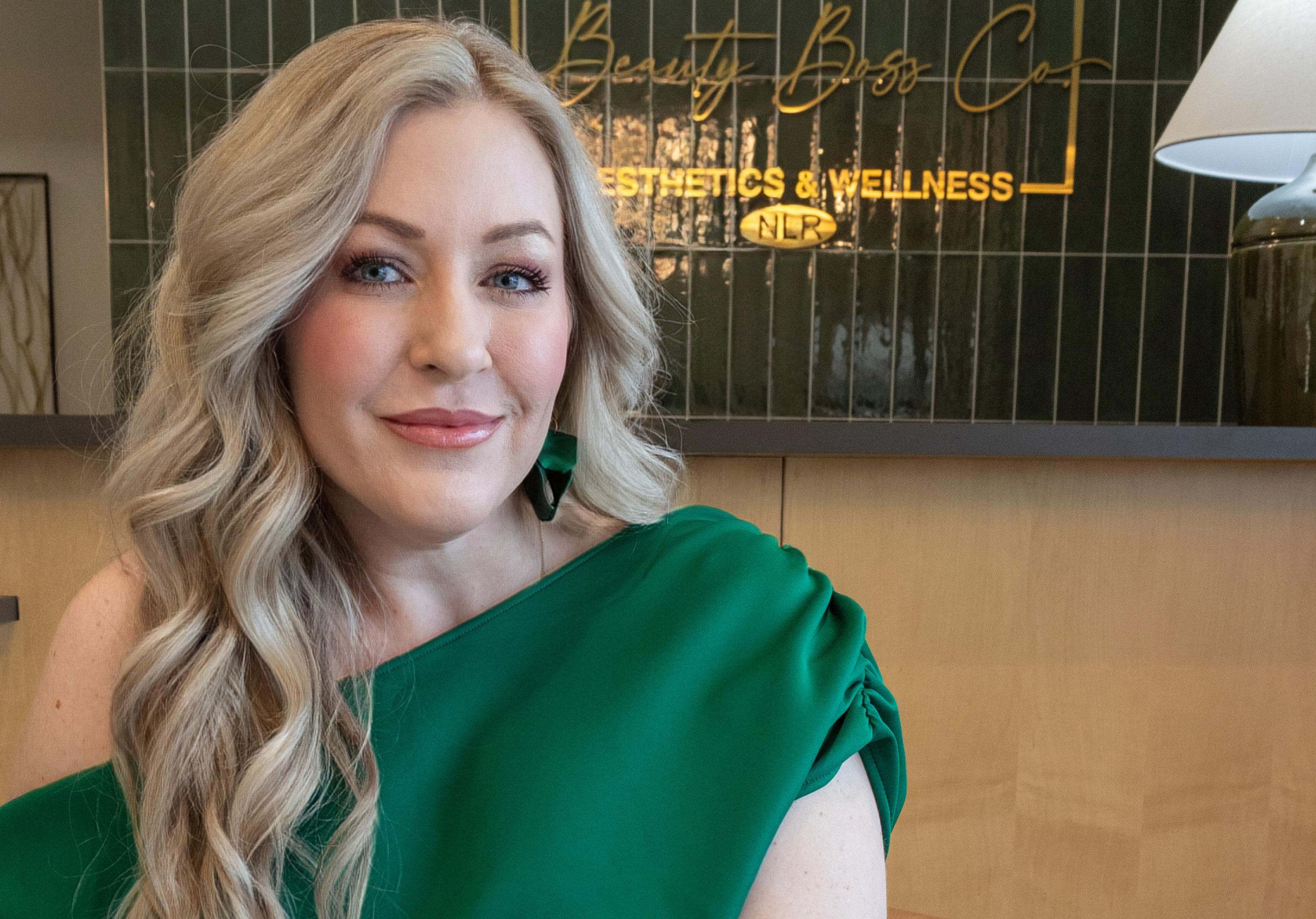
What qualities or skills have best prepared you for your current role?
My background as a nurse practitioner with 10 years of experience has given me a deep understanding of the body’s intricate systems and the importance of addressing the root cause of health concerns. My training in optimizing hormones for women and focusing on wellness has been invaluable in helping clients achieve true balance and vitality. Additionally, my experience in aesthetic medicine allows me to enhance natural beauty in a way that complements overall well-being. As a practice owner, my leadership and management experience have helped me create a space where both clients and staff feel supported, empowered and inspired to prioritize their health and confidence.
What else should readers know about you or your organization?
We are a comprehensive aesthetics and wellness practice that takes a holistic approach to health. Whether you’re seeking aesthetic treatments like wrinkle reduction or are
looking for functional medicine services such as hormone optimization, energy boosting or improvement in cognitive function, we are here to guide you. Our focus is on getting to the root cause of whatever your issue may be, and we aim to provide a personalized experience that prioritizes your well-being. When you visit us, you’ll be met with a team that genuinely cares about you and listens to your concerns. You won’t feel like just another appointment; you’ll feel welcomed, heard and valued every step of the way.
Where do you turn for inspiration or motivation?
Throughout my career, I’ve been fortunate to have incredible mentors who have guided me, shared their knowledge and helped shape the provider and leader I am today. I also grew up watching my parents build a successful business, which instilled in me a strong work ethic and a deep appreciation for entrepreneurship. Most of all, I’m motivated by my team. Seeing my employees thrive in their careers and reach their goals pushes me to continue growing, learning and creating new opportunities for them and for the business.
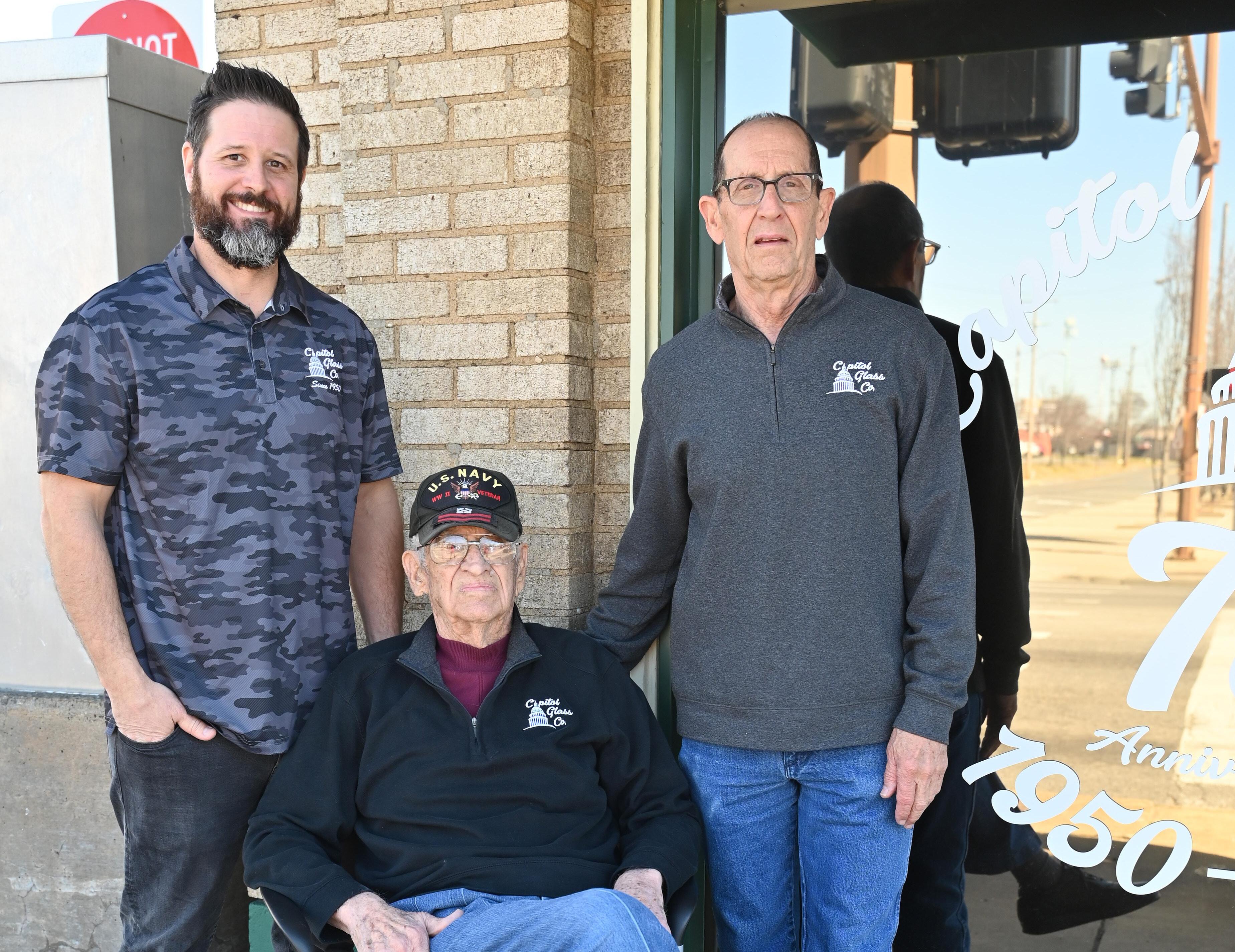
AARON, JACK AND GLENN GRIMES
What kind of competition do you face in this field, and how does your company distinguish itself?
There are two major global chains that we compete with and several small local operations, but we are the only locally owned auto glass shop with the expertise to provide quality work and craftsmanship while keeping up with innovations in the automotive world. Yet we are still a local central Arkansas company that has long-term relationships with and knows our customers. We have the capabilities of the large global chains with the hometown connection and feel of your small town shop — and a warranty that far exceeds anyone else in the industry.
What qualities are most important for professionals in your field?
The commitment to quality work and exceptional craftsmanship, every time, no matter what. The safety and integrity of the vehicle depends on it, and when the safety of the family that is behind the wheel of the vehicle
is at stake, everyone needs to know and have confidence that the vehicle has been properly repaired and all of the safety features are recalibrated and functioning properly.
How is your company or team involved in the community?
We donate to downtown churches that play an active role in feeding the homeless, and we sponsor local charity events and different local youth athletic teams.
What do you want to see the business accomplish in 2025?
2025 is our 75th year in business, so we are trying to use this milestone to expand our reach and show our current and potential customers what we are truly capable of. While continuing to maintain the highest standards of quality work and exceptional craftsmanship found anywhere in our industry, we are also trying to grow our social media presence and showcase everything we can do.

Mercedes-Benz of Little Rock boasts a rich history as a distinguished presence in Arkansas’ luxury brand dealership scene. Since its establishment in 1977, the dealership’s mission has been to bring class, sophistication and elegance to customers’ driveways, and it has excelled in that regard decade after decade.
Most recently, the dealership has undergone a transformation to further enhance the overall customer experience with a focus on delivering world-class sales and service. With a strong commitment to employee wellbeing and a customer-centric approach, the dealership has been able to cultivate a positive environment. Visitors can simply relax in the hands of knowledgeable sales professionals, allowing them to truly relish the time spent picking their new luxury vehicle.
With products as unparalleled in quality as MercedesBenz, it is only natural that the level of service be unmatched, as well. The dealership’s staff prioritize
transparency and availability. From the time they are greeted at the door to the moment they drive away in style, customers are taken care of at every step of the process. The team at Mercedes-Benz of Little Rock is always eager to go the extra mile for clients, working for complete satisfaction and aiming to become each driver’s dealership of choice.
Looking ahead to 2025, Mercedes-Benz of Little Rock is focused on making it the best year yet by striving for excellence in all areas, both within the dealership and in the wider community. As a part of Winrock Automotive Group, staff members of Mercedes-Benz of Little Rock are grateful to be able to provide exceptional products and services while contributing to the continuous improvement of the state they call home. The MercedesBenz team’s vision is to create a lasting impact and to forge meaningful relationships both now and in the decades to come.

STEVE MALLETT, JR., P.E., CHIEF EXECUTIVE OFFICER
What sets you apart?
It all starts at the Huckleberry Creek Reservoir in northern Pope County, which was constructed in 1997. The reservoir is located within a sparsely developed watershed that includes no industrial, commercial or agricultural development, leading to consistent and high-quality raw water from the start. Our reservoir is 5 miles from our treatment plant on the northern city limit of Russellville, connected with 5 miles of 48-inch pipeline. Unlike most plants located at or very near the water source, the pipeline provides several hours of travel time from the reservoir to the plant. This is a major benefit, as we add powder-activated carbon at the lake, allowing it several hours to soak up any organics in the water that may lead to taste and odor issues. Once the organics are absorbed, they are easily removed at the treatment plant, resulting in an exceptional finished product.
What economic benefits do you provide to the community?
The water that we provide is part of the reason so many industries reliant on a consistent, high-quality water supply choose Russellville for construction and expansion of their companies. Conagra Brands, Tyson Foods and Rockline Industries are just a few examples of large corporations that have chosen Russellville.
What awards have you won?
It is the combination of all these factors and people that puts Russellville City Corp. drinking water consistently among the best in the area. This is most evidenced by our selection as the “People’s Choice” for best-tasting drinking water among over 40 entrants from the United States, Canada and other U.S. territories at the American Water Works Association National Conference in 2016. We have also been named best-tasting water in the state in 2005, 2015, 2016, 2018, 2019, 2021 and 2022.

TERRI WELLS, APRN, OWNER, CLINICAL DIRECTOR
What drew you to this career?
I’ve always had a passion for helping people. My journey in aesthetics began with a deep interest in both science and art. This career has allowed me to merge those passions into something meaningful. Seeing the transformation in my clients — not just physically but emotionally — is incredibly fulfilling.
What trends are you watching in your industry right now?
We are pushing to the forefront within the shift toward regenerative aesthetics. We are already including treatments such as platelet-rich plasma, polynucleotides and biostimulator injectables that focus on retaining and rebuilding. We’re also seeing increased demand for combination therapies that address wellness and beauty holistically. To stay ahead, we’re investing in advanced training, emerging technologies and expanding our service menu to include evidence-based regenerative and wellness options.
What do you want to see the business accomplish in 2025?
In 2025, we aim to expand our knowledge and our offerings while maintaining the top-notch client experience we are known for. The focus on professional development, especially, means investing in advanced certifications and new medications and technologies that align with our focus.
What qualities or skills have best prepared you for your current role?
Empathy, attention to detail and a strong foundation in clinical education have been key. I’m also a lifelong learner, always staying on top of the latest techniques and technologies to provide the safest and most effective treatments possible.
What advice would you give to early-career professionals hoping to follow a similar path?
Stay curious, stay ethical, and never stop learning. Build real relationships with your clients, and always prioritize safety and trust over trends. This field is incredibly rewarding when done with heart and integrity.
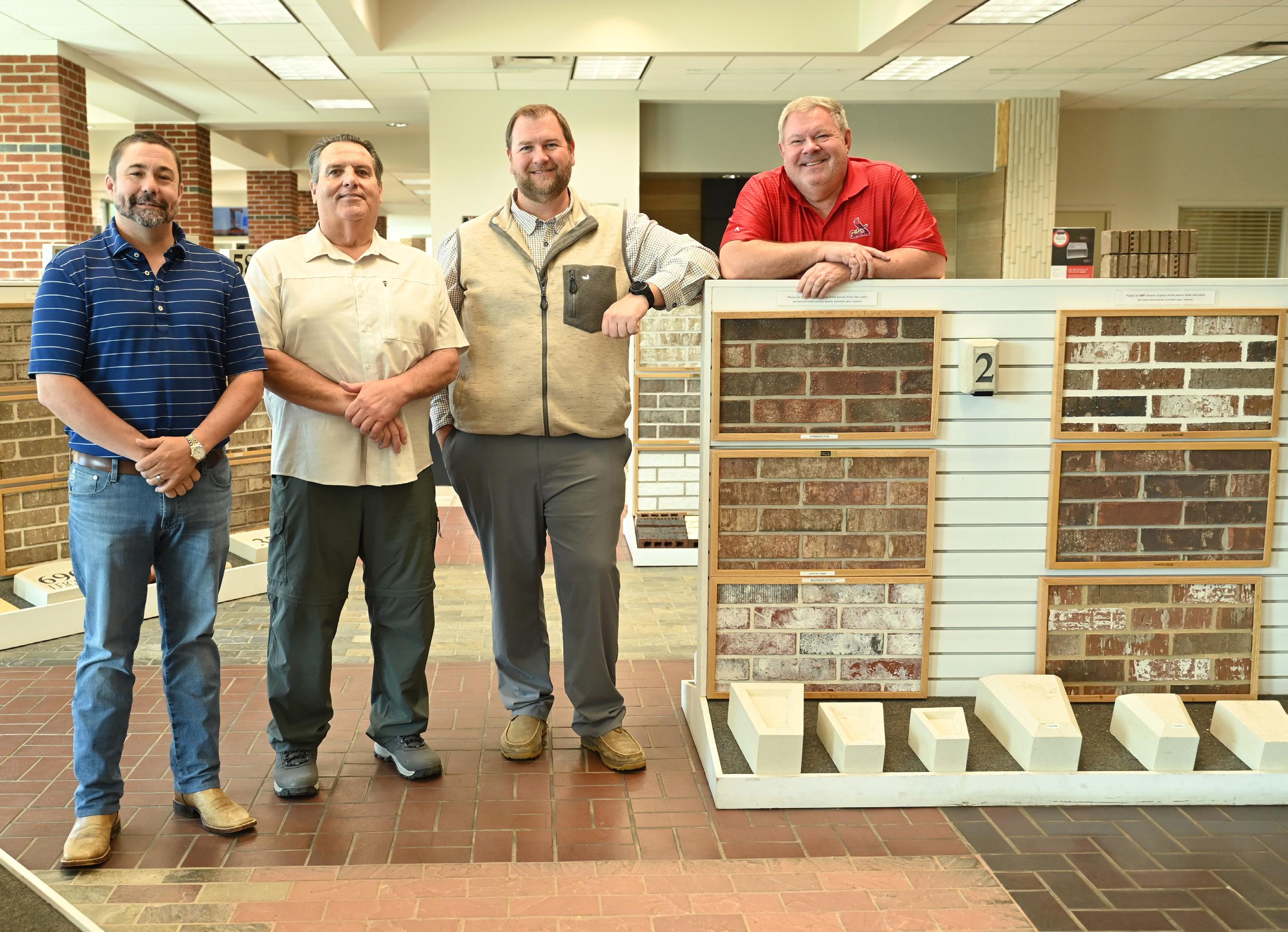
What qualities or skills have best prepared you for your current role?
I [Chase Crabtree, district manager] was in territory sales for 18 years prior to taking this role, providing me with a good background in building relationships and problem solving.
How would you describe your leadership style?
I look forward to working alongside employees and educating them based on knowledge I have gained over my years as a sales rep. I want my team to see me as a leader and not a boss — and one who is willing to jump in and help with any situation.
What is the most challenging part of your work, and what is the most rewarding?
I enjoy watching employees develop their skills and build confidence while working with customers to provide solutions, as well as seeing that work turn into results for a homeowner in the form of a beautiful home or commercial project. The most challenging part of our work is making
sure that brick continues to be the go-to building material for new construction and educating builders and customers alike that brick is a lifetime product.
What kind of competition do you face in this field?
We face a variety of direct competition within the masonry business, as well as our tile and flooring department. Full masonry homes are slowly slipping away in favor of blended exteriors to include brick, stone, stucco and numerous cladding options of all types and material makeups.
How is your company keeping up with industry trends?
We are currently going through product development on brick offerings across several of our plants to offer new products based on in-demand trends and styles. We are in a good position to offer other exterior options to customers, along with and outside of our brick products, with our eye-catching, maintenance-free cladding options such as Quality Edge and MAC Metals.
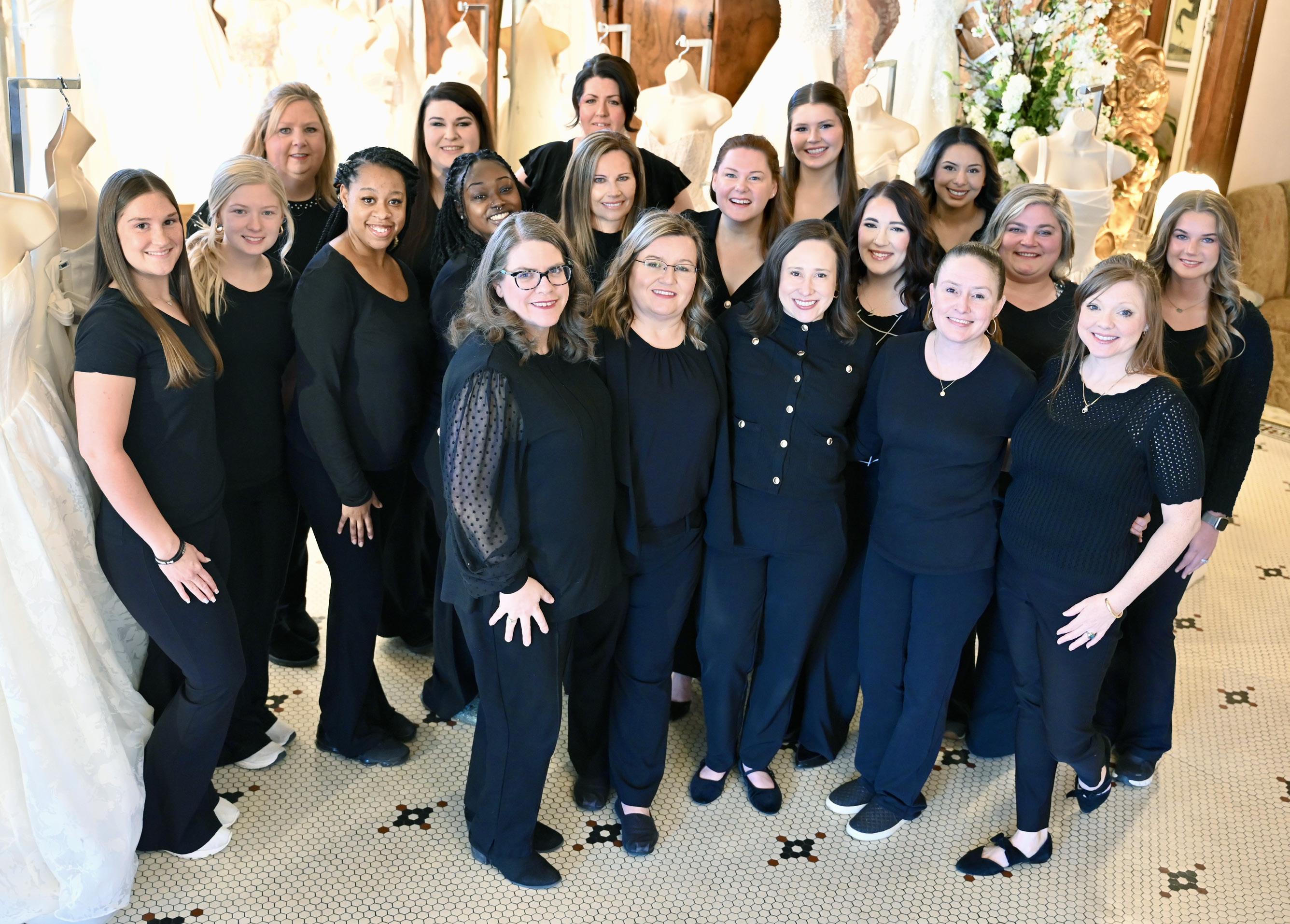
How does your company distinguish itself?
The biggest competition is online retail. These days, we are used to getting anything we desire online, inexpensively and nearly instantly. The bridal industry is challenged to inform our customers that our industry doesn’t work that way. Beaded dresses, for instance, can take more than 400 hours to hand-bead. Time is something our brides don’t always have when ordering a dress. Years ago, Low’s started carrying many styles in many sizes so most any bride can go home with a dress the day of her appointment, easing the stress of ordering while ensuring customers they are making the right decision.
What has been your organization’s proudest accomplishment so far?
Low’s Bridal was started by the Low family in 1977 above the family’s pharmacy. There are not many mom-and-pop shops from that era left, and even fewer have achieved the level of growth and success Low’s has. It is truly an honor to continue this business. Low’s Bridal started with
just a few dresses and now carries over 2,500 dresses and serves clients from all over the United States. We are proud of our mission and purpose — to continue to build upon the success of our brand through a new family and new owner.
What trends are you watching in your industry?
The bridal industry is really exciting right now because the fashion industry as a whole is influencing bridal designs. Gowns have interesting architecture, and brides are pairing their gowns with unique accessories. We are seeing gloves and overskirts among popular purchases. Accessories allow brides to change up their look from the ceremony to the reception without having to purchase another dress. In our region, brides love the classic, elegant dresses. We were excited to see many classic dresses with elevated adornments, constructions, or unique fabrics and laces. We are excited to offer these styles with a little extra glamor that our brides have been looking for.
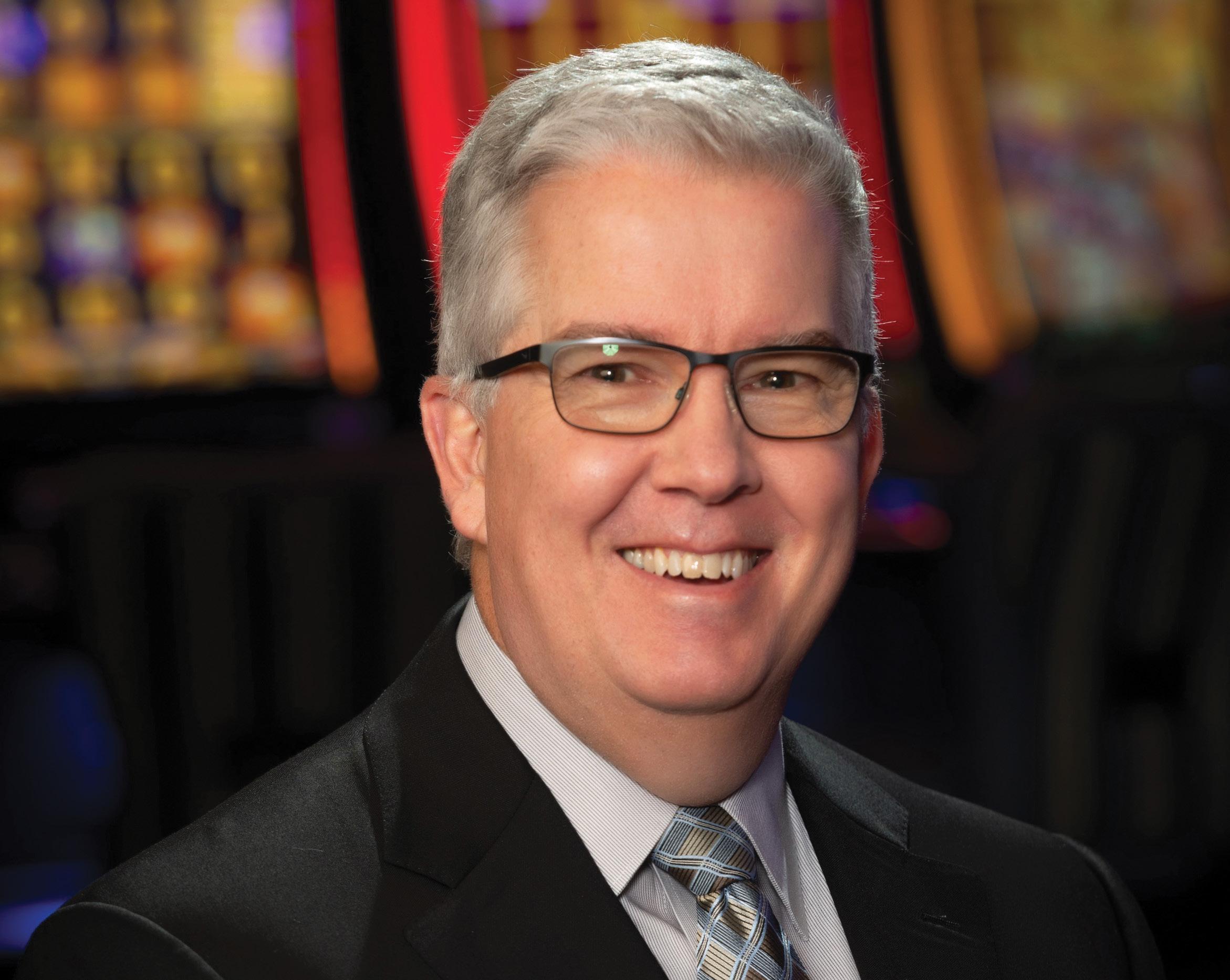
Jim Burns, a certified public accountant who has a Master of Business Administration, has had a distinguished career as a chief financial officer at numerous gaming organizations and has also served in CEO and general manager positions.
Since 2020, Burns has played a critical role in collaborating with other Saracen executives and the leadership of the Quapaw Nation to develop and implement the strategic vision of the Quapaw Nation of Oklahoma. Their investment in Arkansas is located on their ancestral homeland.
Burns is a value creator and effective leader who owns a long record of success in attaining financial and
operational goals. Experienced in the attainment of mission-related goals in a fiscally responsible manner, Burns is focused on providing a highquality experience that not only benefits the Quapaw Nation but the local communities through employment and vendor partnerships.
Above all, Burns takes pride in the fact that Saracen’s employees focus first on ensuring a positive entertainment experience for the guests and treat all guests with respect. Burns is married and lives in Pine Bluff with his wife, Lisa. They have five adult children, along with four grandchildren.
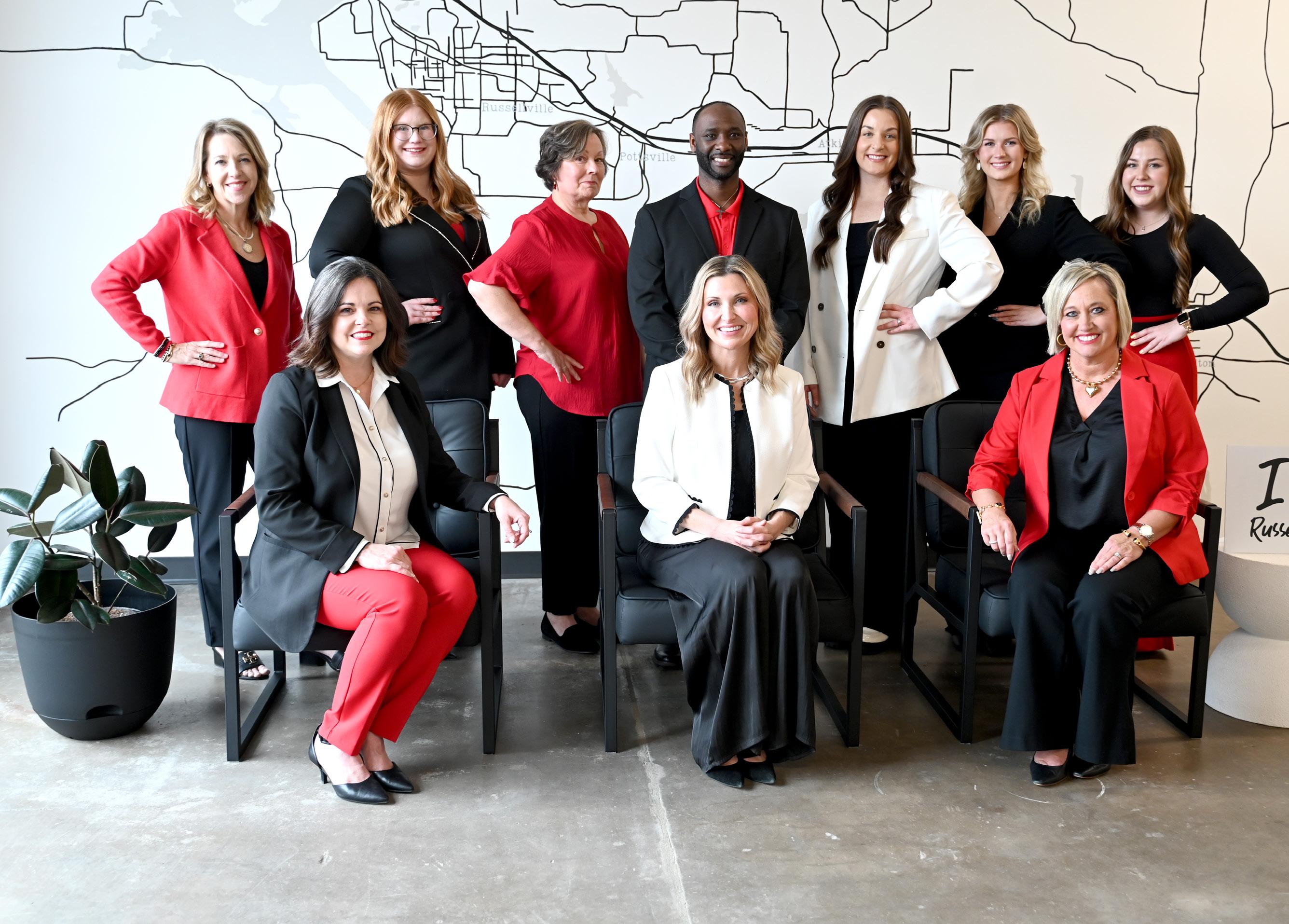
What has been your organization’s proudest moment?
It’s hard to pick just one, but our proudest moments have come from seeing real, lasting impact right here in Russellville. Whether it’s launching initiatives that fuel local economic growth or hosting events that bring businesses, leaders and neighbors together, we’ve seen what can happen when a community pulls in the same direction. Those wins, big and small, remind us why we do what we do. From a small business landing its first big break to a community project gaining traction and changing lives, every success adds another layer to the progress we’re building together. None of it happens by accident — it takes strong leadership from the city and county, an engaged board and a chamber family of members and volunteers who give their time, energy and heart to make Russellville stronger. We’re proud of where we’ve been and even more excited about where we’re headed.
What kind of legacy do you hope this organization will leave behind?
We hope the Russellville Area Chamber of Commerce is remembered as more than just an organization. We want to be known as a driving force that helped shape a stronger, more connected and more resilient Russellville, a place where businesses could grow, families could thrive and people felt a true sense of belonging. Our legacy, we hope, will be one of hard work, collaboration and real impact. We’re not afraid to roll up our sleeves and do the work it takes to build something lasting. Every relationship we build, every success we celebrate and every challenge we face head-on — it all becomes part of the larger story we’re helping to write together. Our vision is simple but powerful: Russellville will be a place our children want to live. A place where you can start your journey and choose to stay. A place where beginnings and belonging go hand in hand. That’s the future we’re building, and we’re all in.

KEVIN NEWTON, PRESIDENT, AND MATT GRAY, VICE PRESIDENT
How does your company distinguish itself?
Arkansas is home to many talented contractors, but at C.B.M., we strive to stand out as the trusted partner you can always rely on. Our success is built on the strong relationships we cultivate with our clients, which is why the majority of our business comes from repeat customers.
What has been your organization’s proudest accomplishment so far?
C.B.M. has proudly served the North Little Rock community for nearly 50 years, building deep roots along the way. Being awarded the contract for the new city conference center is a significant honor and reflects the trust and connection we’ve cultivated over the decades.
What is something everyone gets wrong about your industry or business?
A common misconception about the construction industry is that it’s purely about manual labor. While physical work
is certainly a big part of it, construction involves a high level of technical knowledge, strategic planning, and problemsolving. In reality, construction requires a wide range of specialized skills, from architectural design to project management to operating complex machinery. It’s a field that demands both expertise and continuous learning.
What do you want to see the business accomplish in 2025?
We have been fortunate to experience year-over-year growth in recent years. Our goal for this year remains consistent with years past — to deliver high-quality projects on time and within budget.
What trends are you watching in your industry right now?
Anticipation is high across our industry as we explore the potential of artificial intelligence. While we maintain a touch of tradition in our processes, we’re committed to seeking out opportunities to enhance efficiency and improve our business operations.

BRITT STEWART, CEO, FROM LEFT; MEREDITH PIERCE, MARKETING DIRECTOR; AND PAYTON SMITH, CHIEF OPERATING OFFICER
What qualities are most important for professionals in your field?
The most important qualities in this industry are empathy, resilience, professionalism, technical skills and adaptability. Disaster restoration isn’t just about fixing buildings — it’s about helping people get back to normal after a crisis. Our crews need to work quickly while also being compassionate and understanding.
What have been your organization’s proudest moments?
Over the last five years, we have responded to some of the most significant disasters in Arkansas, including the COVID-19 pandemic, during which we provided essential disinfecting services to keep businesses and facilities safe. We were on the front lines with a record snowfall over Christmas, causing burst pipes and water damage. We have worked tirelessly to restore homes and businesses
after multiple tornadoes in Arkansas, including the most recent damage in Cave City. We also had the honor of responding to the fire at the Arkansas State Capitol, ensuring that this historic structure was properly restored and protected. Being trusted by our neighbors during these critical times is a testament to our reputation, dedication and expertise.
How does your company distinguish itself?
With nearly 50 years in business as a local, family-owned company, we bring a combined experience of over 100 years to every job. Our portfolio includes over 30,000 completed projects, showcasing our ability to handle disasters of all sizes with efficiency and expertise. As a full-service, licensed general contractor, we take a personalized approach, treating every client like a neighbor in need.

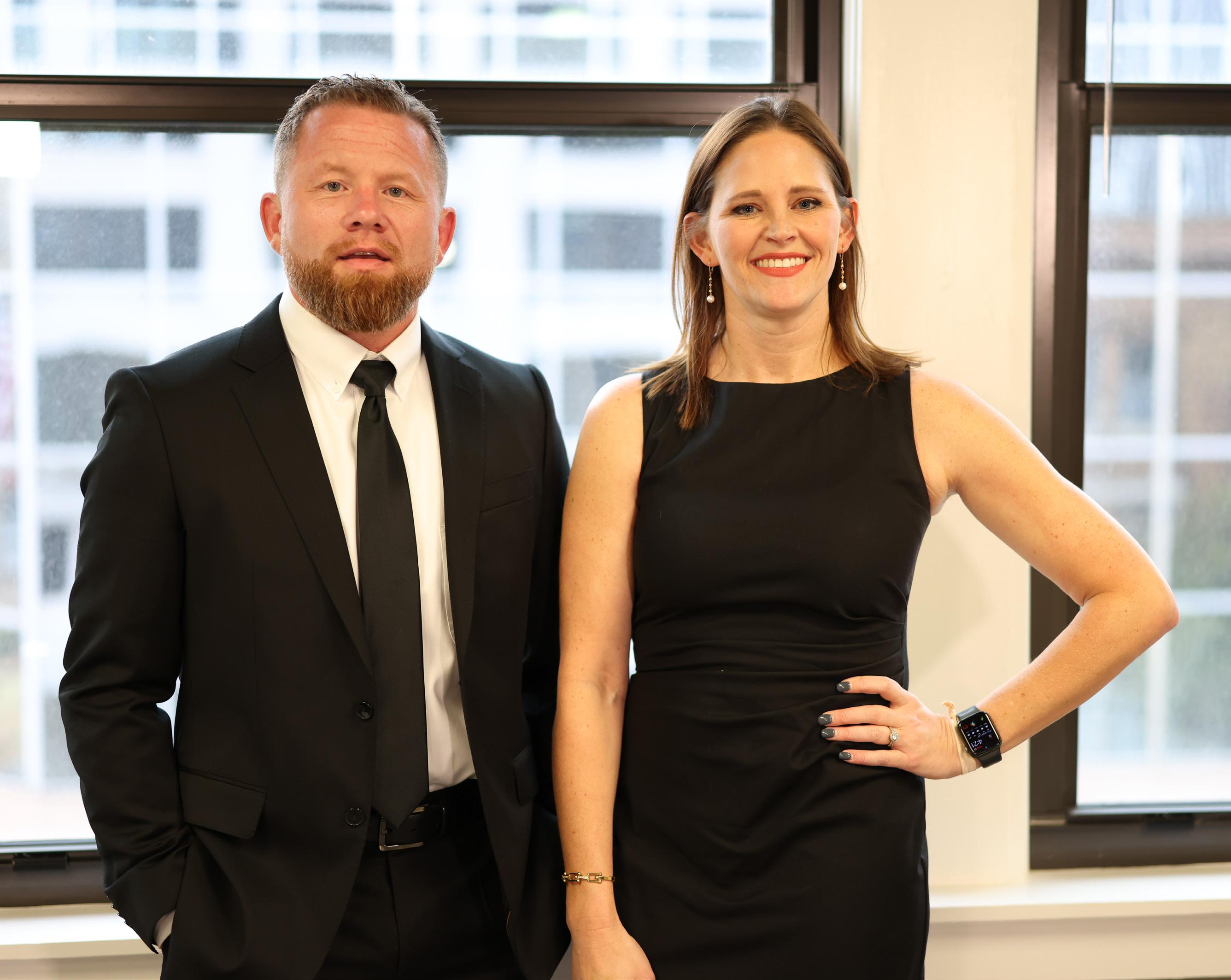
What has been your organization’s proudest moment so far?
We started our firm somewhat abruptly in January 2017. We started out in a single office with a single desk. We have grown significantly. Almost all of our clients today are referrals, which is a testament to the hard work, experience, legal knowledge, courtroom success and respect we have created for the firm. We receive referrals from current and former clients, other attorneys, judges, professionals in the community and, occasionally, from former opposing parties. We are proud and appreciative of the trust we have earned in the legal community and strive to continue earning the respect of those who refer their friends, family and colleagues to our firm.
What trends are you watching in your industry right now?
The biggest trend in the legal community is the increase in technology, access to information — both good and bad — and, of course, maintaining the rule of law in both
local and federal courts. We use technology to automate routine activities, thus decreasing costs for clients. Angela Mann has presented the domestic relations case law update at the Arkansas Bar meeting and other continuing legal education events for several years. We handle appeals — mostly our own — and push to make Arkansas law stronger, more consistent and better for our clients.
How does your company distinguish itself?
We provide every client a hands-on approach, often answering calls and emails outside regular business hours, especially in domestic relations matters. Communication is an area where we can and do stand out. We also provide truthful and honest assessments of the case, including the likelihood of success, potential areas of strength and weakness and sometimes a straightforward assessment of changes needed to achieve a desired outcome. When needed, we provide the support to make tough decisions. Our goal is always to help the client achieve the best outcome.

SHAY HUGHES, OWNER, FRONT, WITH EMPLOYEES ALYSSA SPEARS, FROM LEFT, MEGAN FREEMAN, ANDREA LOTT, TRACI NEWMAN AND MADALYNN SPEARS
What trends are you watching in your industry right now?
The grooming industry has really innovated itself over the last decade, becoming a career path more people are choosing. We invest in new tools, techniques and continued education through webinars, trade shows and grooming competitions. Sharing content has helped us reinvent the industry, offering creative grooms and highly stylized cuts.
How is your company or team involved in the community?
We donate grooms to those in unfortunate situations with dogs in need and donate to local shelters.
What qualities are most important for professionals in your field?
Love for the animals is most important. This profession is hairy, wet, dirty, stinky, physically demanding and emotionally charged. Your heart has to be in it. My team and I love showing up for the dogs, advocating for them
and providing a safe environment where pets and parents feel confident and comfortable knowing how passionate we are in the service we provide to their baby.
What is something everyone gets wrong about your industry or business?
The most common misconception about the grooming industry is that we play with puppies all day and it’s an easy job — so not true. We do get to see some adorable puppies, but we see much, much more than that. This job is fast paced and high pressure, and performance is at the forefront.
What do you want to see the business accomplish in 2025?
We are off to a big start this year, opening our second location. We are now in Conway and North Little Rock, positioning us to better serve central Arkansas. I am excited to provide the best facilities, equipment and products to both our “furbulous” pets and phenomenal groomers.
Shay’s Love Affur Grooming • 7527 Counts Massie Road, North Little Rock • 501-585-1560
2215 Dave Ward Dr., Conway • 501- 205-6159
Shay’s Love Affur shaysloveaffur
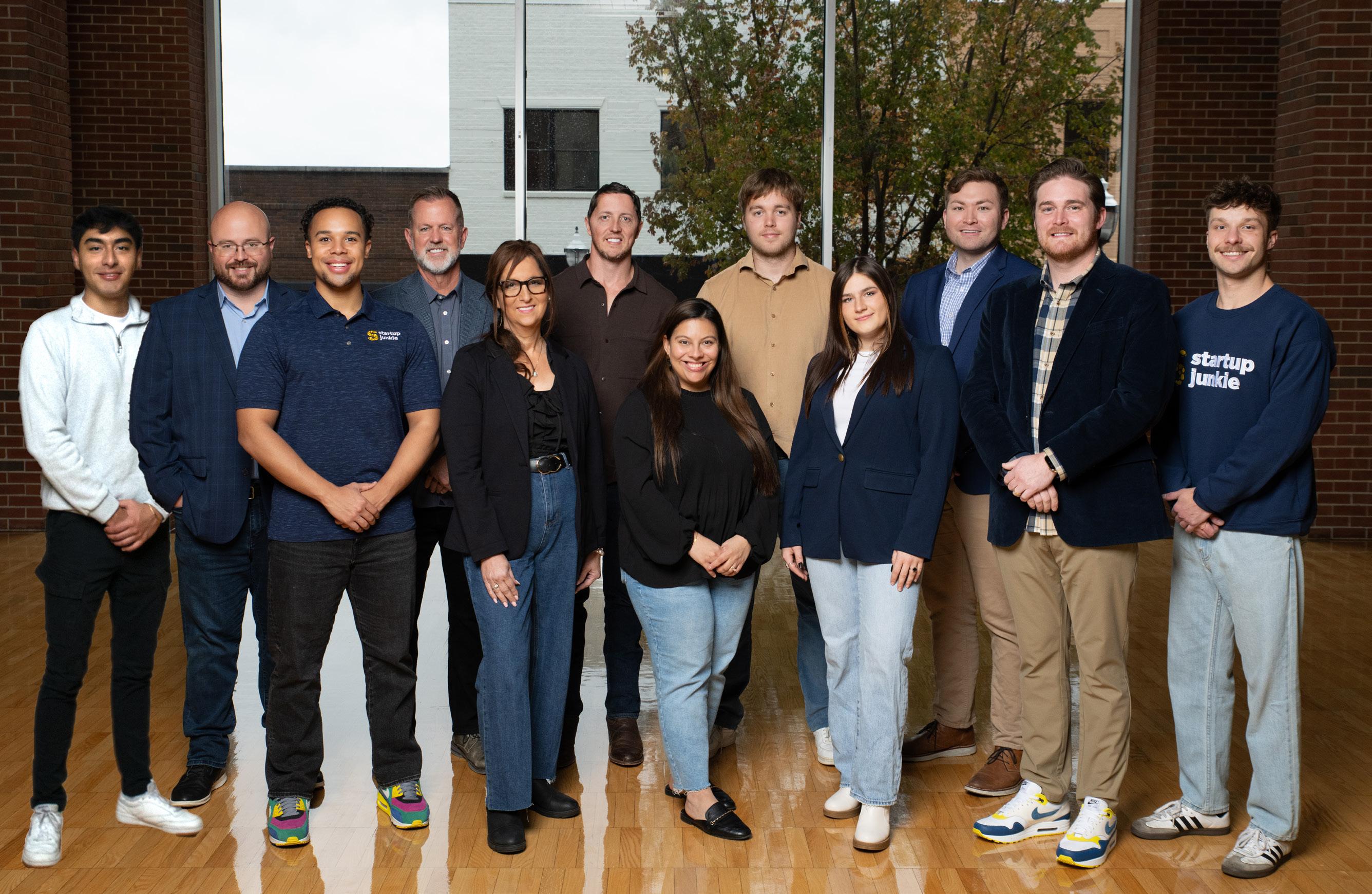
Startup Junkie Foundation is dedicated to empowering entrepreneurs and small business owners by breaking down barriers and fostering innovation. Since its inception, the organization has operated with the same agility and resourcefulness as a startup. Its team of experts, often referred to as “Swiss Army Knives” for their diverse skill sets and adaptability, is driven by a commitment to making entrepreneurship accessible to all.
At the core of its mission, Startup Junkie Foundation works to illuminate the path to success for existing and aspiring entrepreneurs, small-business owners and innovators. By adopting an outcome-focused approach, the foundation aims to inspire people to turn ideas into successful ventures while avoiding the typical hurdles that many face along the way. Acting as a lighthouse for entrepreneurs, Startup Junkie helps individuals steer clear of potential pitfalls and connects them to a robust network of resources, mentorship and support.
Support from Startup Junkie goes far beyond oneon-one consulting. Entrepreneurs gain no-cost access to
tailored technical assistance and a network of subject matter experts ready to help with every aspect of their business. The foundation also hosts a packed calendar of workshops, events and accelerator programs. The programming creates opportunities for entrepreneurs not only to learn and grow but also to build meaningful connections within a thriving entrepreneurial community.
With a strong presence in Arkansas and growing influence abroad, Startup Junkie Foundation has become a vital force for economic and social progress. Its mission extends beyond empowering individual entrepreneurs to fostering an inclusive ecosystem that benefits entire communities. Whether one is an aspiring founder sketching their first business plan or a small business owner scaling their operations, Startup Junkie is committed to walking alongside individuals on their entrepreneurial journeys. By focusing on accessibility, expertise and impact, the Startup Junkie Foundation works to help ensure every entrepreneur with a dream has the opportunity to succeed.


Katherine Blackmon Carroll is the founder of the Law Offices of Katherine Blackmon, established in 1997 in Little Rock. With nearly three decades of experience in family law, Blackmon Carroll has earned a reputation for her unwavering commitment to excellence, integrity and compassion. From the beginning, her vision was to create a firm that not only delivered high-quality legal representation but also recognized the emotional complexity of the issues clients face — particularly during divorce and custody disputes.
Her firm is proudly trauma informed, which means every case is approached with sensitivity, respect and a deep understanding of how past experiences impact present circumstances. While the firm focuses on divorce and family law, Blackmon Carroll does not promote divorce as a solution in and of itself. Rather, she supports individuals who are seeking to exit harmful, unhealthy or abusive relationships with dignity and strength.
Blackmon Carroll leads her team with high expectations and a collaborative spirit. She demands the very best from those around her not out of perfectionism but out of a belief that clients deserve nothing less.
Team members are carefully chosen for their skill, empathy and professionalism. Together, they offer both strategic legal counsel and steady emotional support to those navigating major life transitions.
Beyond her work with clients, Blackmon Carroll is passionate about mentoring the next generation of lawyers. She encourages young attorneys to approach the practice of law not just as a profession but as a calling — one that requires heart, resilience and an unshakable dedication to doing what is right.
Her goal is to leave a lasting legacy: a firm built on compassion and quality and a legal community inspired to lead with both excellence and empathy.

CHRIS NORWOOD, CO-OWNERS
How does your company distinguish itself?
Flowers are part of life’s most significant and memorable moments — weddings, birthdays, funerals, even intimate family dinners. That makes selecting who you choose to deliver beautiful floral designs a big decision. We have decades of experience but, most importantly, an unwavering commitment to excellent customer service. Whether a small floral arrangement to brighten someone’s home on a tough day or a greenery wall for a 500-person wedding, we take the same care and dedication with each design we create.
What has been your organization’s proudest moment so far?
Opening the doors to Norwood-Day Floral Co.’s first storefront will be hard to top. Welcoming the community into our new space was humbling. Taking the leap and starting a small business can be daunting, but we feel incredibly blessed by the support we have and continue to receive.
What qualities are most important for professionals in your field?
A positive attitude and a strong work ethic. We work in a fast-paced industry and with perishable products. You must be committed to both the craft and the client. We are fortunate that our team not only fits but exceeds the bill.
What kind of employee culture do you try to cultivate?
We want our employees to feel like they can “bloom,” professionally and personally. We are focused on fostering a workplace atmosphere of mutual respect and trust where our team members know it’s OK to ask questions and seek support. As the saying goes, all must row in the same direction, especially for small businesses.
What is something everyone gets wrong about your business?
Floral design is much more than simply selecting stems and placing them in a vase. It’s an intricate, complex process that requires creativity, diligence and consistent hard work. To us, arrangements are like living pieces of art — the result is always worth it.
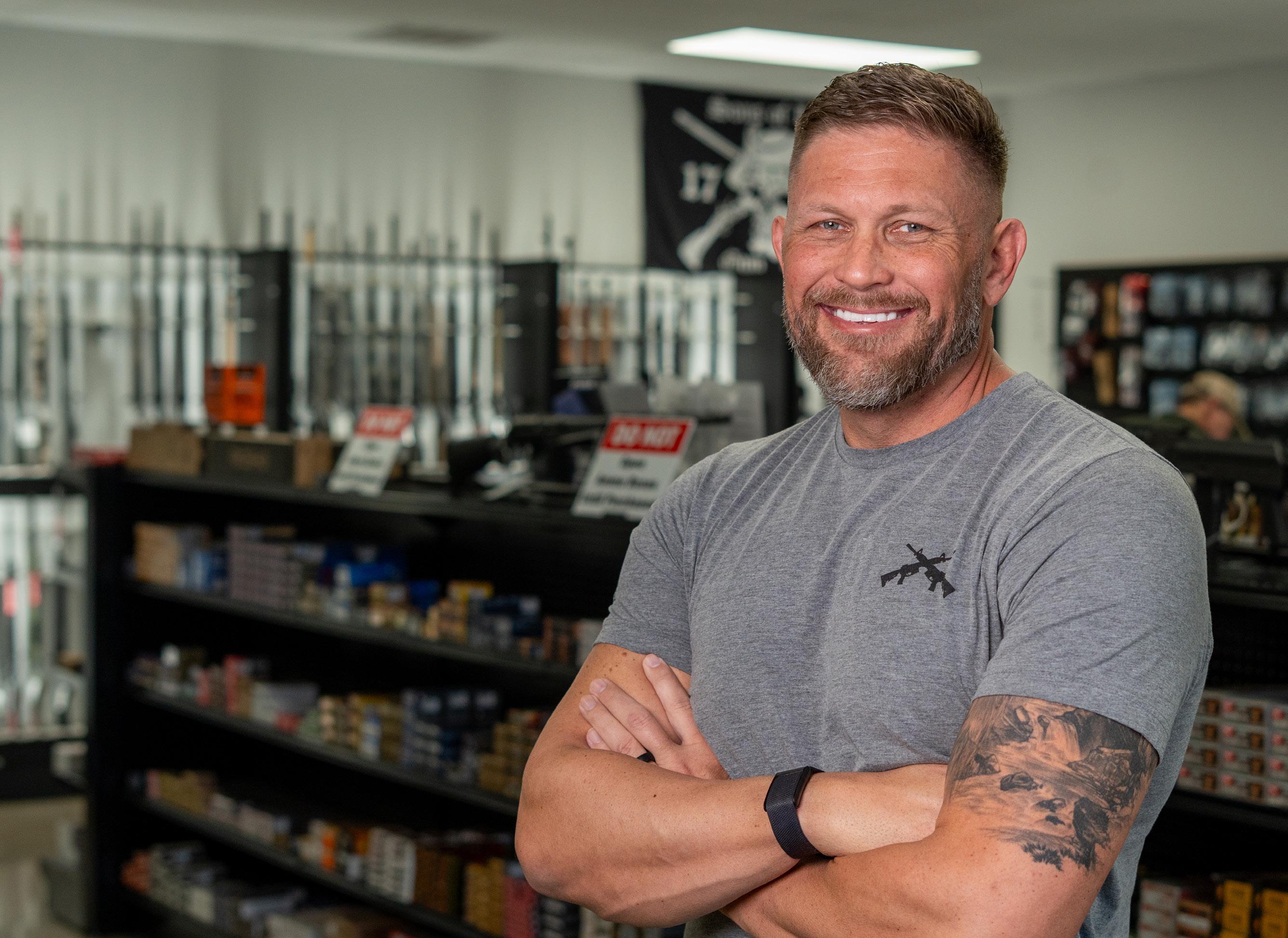
What drew you to this career?
The people of the firearms community drew me to this. A lot of them are really misinformed about firearms.
What are you most proud of when it comes to the work you do?
I get to serve people from every walk of life.
What is something everyone gets wrong about your industry or business?
That we are a gun industry, not a people industry. We love to serve our customers and help meet their needs. We try to break the fear barrier in this industry. Most people that have a fear of guns have never been properly trained or educated about them, so we do our best to create a safe environment.
What has been your organization’s proudest moment so far?
At our grand opening, we had a few hundred people at the ribbon cutting. There has been huge support from our community since day one.
What qualities are most important for professionals in your field?
Great customer service and integrity. We try to add value to every interaction with our customers.
Where do you turn for inspiration or motivation?
The Bible, Jesus, mentors, wife, kids and my church.
How is your company or team involved in the community?
We have a nonprofit in the back of the store called Gray Beard Forge MMA that serves veterans and first responders by offering jiujitsu classes at discounted rates.
What do you want to see the business accomplish in 2025?
We want to grow our brand locally and nationally through our online sales, ammo subscription and presence.

DR. NEAL WYATT, MEDICAL DIRECTOR, HOSPICE SERVICES; DR. BRIAN BELL, PRESIDENT AND CEO; NIKKI TAYLOR, APRN, DIRECTOR OF PALLIATIVE AND PRIMARY CARE; AND ANITA DEAL, RN, VICE PRESIDENT AND CHIEF CLINICAL OFFICER
How does your company distinguish itself?
Arkansas Hospice and Palliative Care is the state’s largest nonprofit provider of care. What differentiates us from others in the field is our ability to rely upon the strength and resources of more than 400 employees providing care from multiple locations across the state while remaining a community-based, nonprofit provider where all resources are reinvested in patient care.
What is something everyone gets wrong about your industry?
The first is that all hospice and palliative care is the same or provided by a single state agency. The second is that hospice is only for the final days or hours of life. Studies show that early admission into hospice — typically when lifespan is projected to be less than six months — can sometimes lengthen lifespan because of our additional level of care and support for patients and caregivers. Third is the misconception that hospice is a place rather than a special type of care. Most patients are cared for in their homes.
How is your company or team involved in the community?
We make presentations at events and inside senior care and living facilities on a continual basis with caregiver tips and information on the importance of advance care plans, which enable one to express their health care decisions in case they are unable to communicate because of an illness or accident. The Arkansas Hospice Foundation impacts the communities we serve by raising funds and acquiring grants that subsidize patient care and help meet unique patient needs not provided by traditional means. These include food insecurity, living conditions that inhibit patient care, and final patient and family wishes. Volunteers are also a vital part of our team with opportunities ranging from patient visits to assistance at our offices and events, with specialized volunteering in areas such as sewing and pet therapy.

Tell us about the history of your business. For more than 100 years, Conway Regional has provided high-quality, compassionate health care by offering innovative services, introducing new specialists and expanding access to care. From primary care to times when specialty care is needed, our world-class providers are here to care for north central Arkansas, central Arkansas and the River Valley. We have overcome significant challenges during our lengthy history, such as responding to the care needed after tornadoes, floods and man-made disasters. Conway Regional Health System provides complete health care services to an eight-county service area of north central Arkansas and the River Valley, including Cleburne, Conway, Faulkner, Johnson, Perry, Pope, Van Buren and Yell counties. Centered on a 180-bed acute care medical center, the health system provides patients with a variety of services, including heart health, orthopedic care, neuro-spine surgery, vascular surgery, gastroenterology services, women’s health, and surgery and rehabilitation. Conway Regional
operates an expansive physician enterprise, including 10 primary care clinics and 17 specialty clinics.
Conway Regional’s mission is to be accountable to the community and to provide high-quality, compassionate health care services. Our team’s work ethic and sense of calling motivate us to care for others despite the difficulty of the job.
Is there anything else readers should know about you or your business?
Conway Regional’s providers and clinics blend access and excellence tailored for each patient. With a focus on familiarity, relationship building and a fierce commitment to advocating for patients, the health system empowers individuals to make informed decisions about their unique health journeys. Conway Regional is not massproduced health care; it is curated care crafted to meet the specific needs of its patients.

What has been your organization’s proudest moment or accomplishment so far?
Our proudest accomplishment is the enduring trust we’ve built with our clients over the past 36 years. Testimonials like, “I love your team! Everyone is patient and helpful when I need to call. Thanks for being awesome!” reflect the success of our client-centric approach and our dedication to restoring dignity to tech support.
What trends are you watching in your industry right now, and how are you preparing for them?
We are closely monitoring advancements in artificial intelligence, cybersecurity threats and the increasing demand for cloud-based solutions. To prepare, we’ve integrated services like artificial intelligence to enhance productivity and are continually updating our cybersecurity measures to protect our clients’ digital assets.
What kind of employee culture do you try to cultivate?
We foster a family-oriented culture that emphasizes worklife balance, continuous learning and team collaboration. At NSG, we don’t just support our employees — we make sure their families love the fact that they work here. We provide benefits like unlimited paid time off, matching 401(k) from day one, and sponsorship for certifications
and training, all of which reflect our deep commitment to our team’s well-being and professional growth. Our goal is to create an environment where employees feel valued, supported and excited to be part of our mission.
What is something everyone gets wrong about your industry or business?
A common misconception is that IT support is purely transactional and impersonal. In reality, building strong relationships and understanding each client’s unique challenges is crucial for effective IT support. We prioritize these relationships to provide tailored solutions that truly meet our clients’ needs.
How is your company or team involved in the community?
We are incredibly proud of the many organizations our staff supports through volunteer hours — too many to list. NSG directly supports a range of organizations that focus on aiding the developmentally disabled, mental health initiatives, adoption services and various health foundations. Giving back is a core part of our company culture, and we believe in using our resources and time to make a meaningful impact in the community.
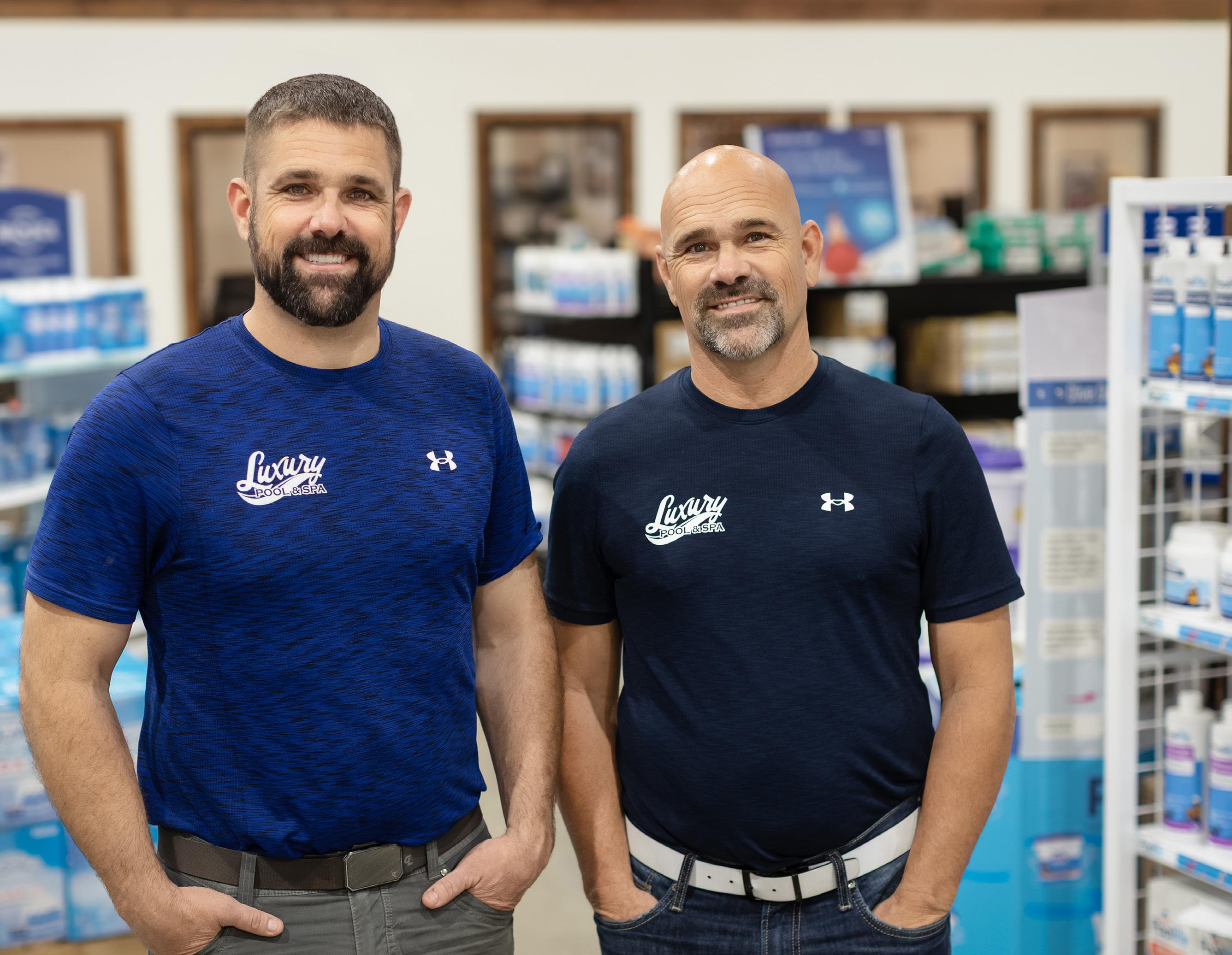
What has been your organization’s proudest moment or accomplishment so far?
Opening the new store in Conway, our second standalone building, which won a national award for best retail layout this year at the United Aqua Group’s Awards of Distinction.
What trends are you watching in your industry right now?
The biggest trend we are watching in the pool and spa industry is customers want more automation and monitoring systems. We are preparing for this by bringing in manufacturers’ reps to do training in our store and in the field with our whole team.
What kind of employee culture do you try to cultivate?
We like to promote a family atmosphere where we all work together and help one another out.
What is something everyone gets wrong about your industry?
The belief that all builders are building pools to the same standards and specs.
How is your company or team involved in the community?
We donate to local schools, churches and youth sports programs.
What kind of legacy do you hope this organization will leave behind?
One of integrity and quality products that bring families together to create lasting memories.
Is there anything else readers should know about you or your business?
We are third-generation pool builders. Our family has been building pools in Arkansas for almost 50 years.

What drew you to this career?
You could say retail has been my calling since I was a child, when I played “store” rather than “house.”
What are you most proud of when it comes to the work you do?
I am most proud of the clients’ appreciation when we assist them in choosing the perfect piece of jewelry, the perfect perfume or the perfect gift item according to their needs. Secondly, I am extremely proud of serving our clients for 41 years.
What is the most challenging part of your work?
The most challenging aspect of retail is competing with the internet. We strive to give the best service possible and, above all, make the experience of shopping comfortable and fun. I truly think and hope people are becoming more conscious about the importance of shopping locally.
Where do you turn for inspiration?
For inspiration, I rely on a number of periodicals, especially trade publications — but my best inspiration has always been my elegant mother, who was instrumental in helping to start this business.
What is something everyone gets wrong about your business?
Our name is somewhat misleading. Powder reflects the exquisite fragrances we have, and “smoke” is derived from the Latin “per fumis,” which literally means “through smoke.” Hundreds of years ago, perfume was made by filtering the essences through smoke.
What advice would you give to individuals hoping to follow a similar path?
My best advice to anyone starting a retail business is to be present consistently so as to have an opportunity to know your clients’ tastes and preferences.

DR. KEITH SCHLUTERMAN
What is the goal of the Conway Regional Memory Clinic?
The Conway Regional Memory Clinic is bringing the latest advancements in Alzheimer’s diagnosis and treatment to Arkansas, ensuring that patients have access to cutting-edge care. By taking a multidisciplinary approach, the clinic provides more than just medication — it offers a comprehensive support system tailored to individual needs. Patients with early memory concerns or a family history of Alzheimer’s have the opportunity to be screened as early as age 55 using innovative tests. Additionally, the clinic is committed to reducing barriers to access by integrating insurance assistance programs and expanding local diagnostic services.
What trends are you watching in your industry right now?
One significant advancement is the development of new medications for treating early onset Alzheimer’s. Antiamyloid drugs work by targeting and removing amyloid plaques in the brain, slowing disease progression when started early. Another groundbreaking trend is the ability to detect Alzheimer’s much earlier using biomarker
testing. The p-Tau217 blood test, with a 96 percent specificity rate, allows for diagnosis years before dementia symptoms appear. This less invasive method, along with AI-supported MRI analysis and advanced neurocognitive testing, is revolutionizing early detection and intervention.
What kind of legacy do you hope this organization will leave behind?
Conway Regional is committed to changing the trajectory of Alzheimer’s disease by shifting from symptom management to proactive, disease-altering treatments. The clinic focuses on early diagnosis, ensuring that patients can begin treatments before dementia develops, which significantly improves their long-term quality of life. A comprehensive, multidisciplinary approach integrates physical therapy, occupational therapy, speech therapy and behavioral health support, addressing both cognitive and functional challenges. The clinic also employs cutting-edge diagnostics, including AI-supported MRI scans and neurocognitive testing, to detect Alzheimer’s disease earlier than traditional methods.

How does your company distinguish itself?
There are lots of great local lenders in the area to choose from, which is what you strive for in every community — local people helping local people. What makes my team stand out from other lenders is our commitment to longterm relationships and being a financial resource after the closing. We don’t just close loans, sell debt and move on; we create successful homeowners by providing the customer with their own personal client success manager after they close. They provide personalized, ongoing care so that clients have the resources they need to be truly successful.
What has been your organization’s proudest moment so far?
It’s when we are able to get a family into a home after others told them no. I’ve received photos of families during their first Christmas or Thanksgiving in their new homes with heartfelt thank yous because we were the
only ones who would help them. Those are always my proudest moments.
What qualities are most important for professionals in your field?
Too often, we see lenders issue a preapproval to someone, only to tell them weeks into a contract that they do not qualify. This is completely avoidable if you know your products, pay attention to the small details, and can communicate with the buyers and the Realtors about what is going on.
How is your company or team involved in the community?
I host a monthly webinar to provide tools, insights and reallife examples to people that want to begin investing in real estate in the central Arkansas area. We also provide credit assistance and homeownership education, and we partner with local real estate agents for community events.
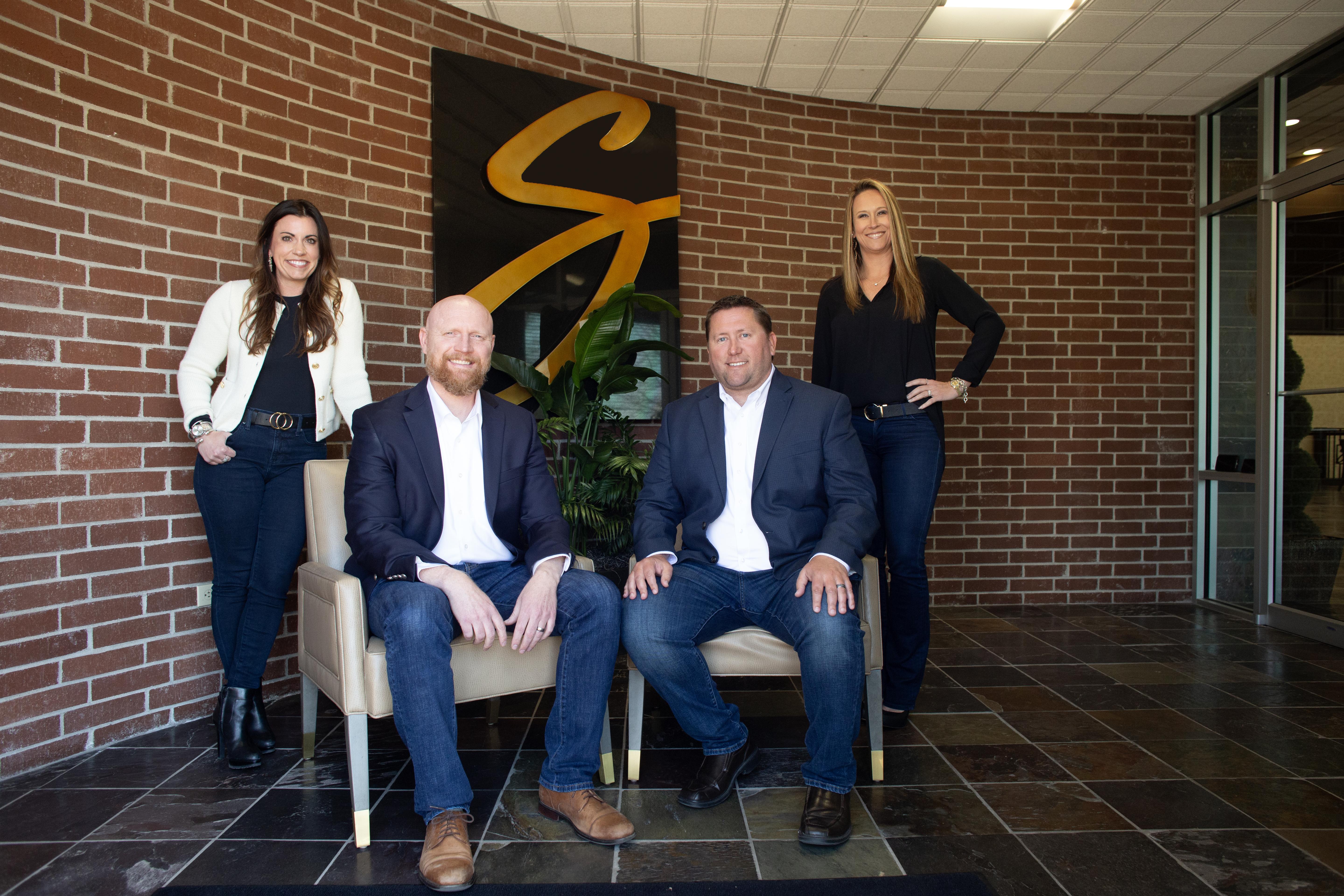
ALEXANDRIA GLADDEN, CHIEF OPERATING OFFICER, FROM LEFT; BRANT WARD, PRESIDENT; JEFF MALAND, CHIEF RISK OFFICER; CRANDALL STREETT, CHIEF ADMINISTRATIVE OFFICER
Tell us about the history of your business. We’re a locally grown, ground-up operation. We raised our startup capital here in Arkansas, serve a local customer base here in Arkansas, and reinvest in the local communities where we live and work. Our goal was to create a special community bank for both our customers and our team members 20 years ago and that’s exactly what we did. We’re incredibly proud to be celebrating 20 years of Signature Banking in 2025.
What sets you apart from your competitors?
We blend the warmth and familiarity of a community bank with the sophistication of a commercial bank and the expertise of private banking to deliver unmatched levels of service. Our teams are passionate about and dedicated to the communities they serve, with the right mix of competitiveness that drives us above and beyond for our towns, schools and customers. We’ve never been
interested in becoming the biggest bank, just one that can provide the best possible service.
What kinds of challenges do you face in your industry? What happens both globally and nationally impacts the banking ecosystem. We choose to approach these challenges collaboratively, understanding we’re in it alongside the small businesses that make up our communities. When we maintain the trust of our community, they continue to place deposits in our bank that we can, in turn, loan to new businesses, bringing more life to the community. As one of our valued customers always says, “We all live downstream,” emphasizing the shared impact and responsibility we have for one another.
What qualities are most important in your industry? Honesty, integrity and respect.
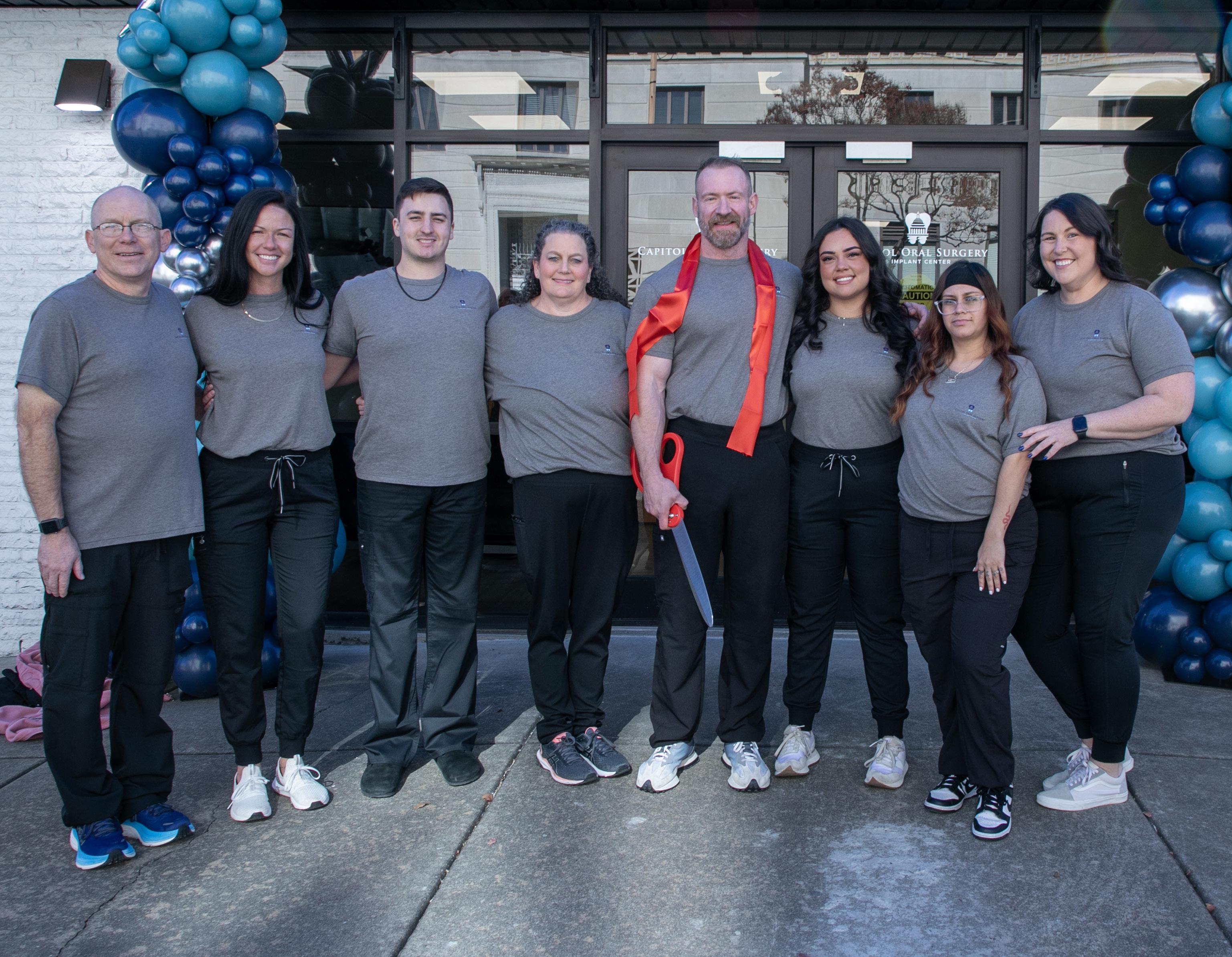
STEVE HILL, CRNA, FROM LEFT; BRITTNEY JONES, RDA; JAYSON YEARGAN, RDA; JENNIFER DUNLAP, REGIONAL MANAGER; DR. JOHN BATSON; KARMYN BRAMLETT, RDA; DIANA SOSA, RDA; AND ASHLEY HELLIWELL, RDA TEAM LEAD
What are you most proud of when it comes to the work you do?
Opening up my own clinic in my hometown of Little Rock, continued improvement as a provider and being a sixminute drive to my mom’s house.
What is something everyone gets wrong about your industry?
The majority of people not in the dental field assume that oral maxillofacial surgeons are simply dentists who extract teeth. They miss that we are surgical trained practitioners.
What is the most challenging part of your work?
Coming from a military background, the most challenging part has been navigating and understanding insurance and reimbursement. I’ve been so lucky to have an amazing staff that steers us through these hurdles and allows me to do what I love, which is helping people.
How does your company distinguish itself?
Managing a multitude of dental expectations and a much more informed patient population with ever-increasing bars of excellence. We strive to stay abreast of new technologies and treatment modalities. We work with cutting-edge medical professionals and always try to improve treatment outcomes.
What kind of legacy do you hope this organization will leave behind?
I hope my company does well. I pray that my team and I can help as many people as possible and that through this career, I am the best teacher I can be. My legacy will always remain in the children I have raised, the woman I said “I do” to all those years ago and the hearts I’ve had the great privilege of touching.

MACKENZIE PEIRCE, OWNER, ARTIST
What trends are you watching in your industry right now?
Microblading and lip blushing are the top two trends right now. I try to communicate and inform my client to help them understand what they are getting. I have been ahead of the trends in my industry since I started my business, which is what makes me stand out against newer artists.
What is the most challenging part of your work, and what is the most rewarding?
The most challenging part of my work is correcting other artists’ poor executions. Research is so important when finding an artist that best fits you and your desired goals. The most rewarding part of my work is tattooing clients who have health reasons that cause them to need permanent cosmetics, such as alopecia, thyroid conditions, trichotillomania or cancer. I can drastically change a person’s life in a small way to me but in a big way to them. It’s very humbling, and I love it.
What has been your organization’s proudest moment so far?
Honestly, being recognized in news articles and by anchors from almost every station in central Arkansas is a great accomplishment, but my proudest moments are seeing my clients look at their new set of brows with pure joy, relief and excitement.
What is something everyone gets wrong about your industry?
Everyone has a misconception that permanent cosmetics aren’t for everyone, but they’re wrong. There’s no wrong skin type, texture, tone, scars or color that should keep someone from being able to have beautiful work done. Despite other companies telling women that it won’t work for them, they’re just saying that because they don’t know how to execute what you desire.
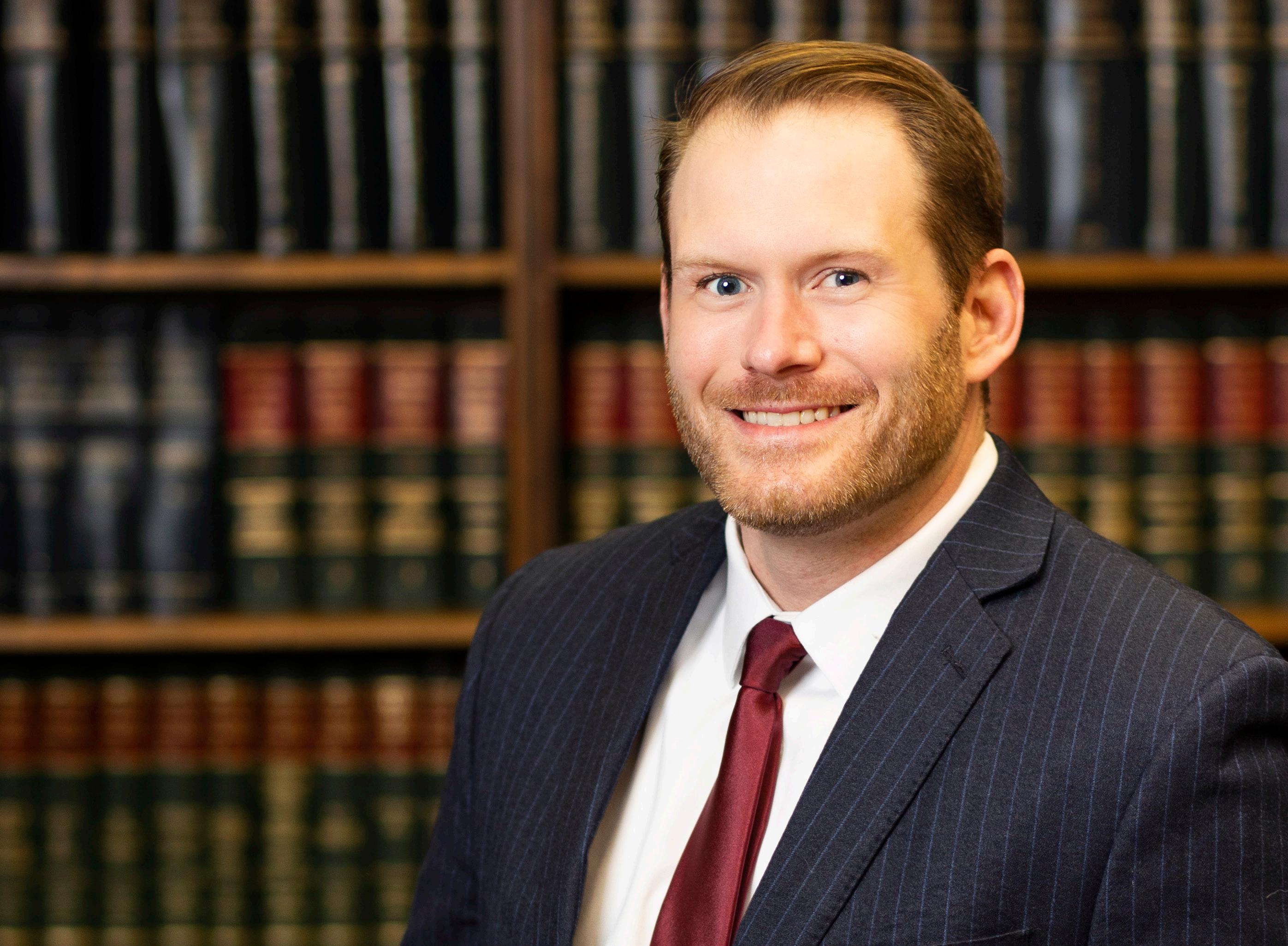
JAMES D. BORNHOFT
What qualities or skills have best prepared you for your current role?
Before founding Bornhoft Law, I served as a prosecutor specializing in human trafficking cases. That experience sharpened my trial skills, strengthened my ability to handle high-stakes litigation and taught me how to build strong cases against powerful opposition. Negotiating with defense attorneys and presenting cases before a jury gave me the skills I use today in my personal injury practice — standing up to insurance companies, fighting for my clients in court and ensuring they receive the justice they deserve.
How would you describe your leadership style?
My leadership style is built on accountability, strategic thinking and client-centered advocacy. I lead from the front, whether in the courtroom, negotiating with insurance companies or guiding my team at Bornhoft Law. Every case is a team effort, and I foster a culture of dedication and excellence to achieve the best possible results.
If you could start your career over, what would you do differently?
I would focus on building my own firm sooner.
Running Bornhoft Law has allowed me to advocate for my clients on my terms, fight for justice without compromise, and create a firm that prioritizes results and client care. That’s something I take great pride in.
Where do you turn for inspiration or motivation?
My wife and daughter are my greatest sources of inspiration. They remind me why I work so hard — so I can build something meaningful and fight for families who are going through difficult times.
What professional goals have you set for 2025?
In 2025, my primary goal is to continue expanding Bornhoft Law by adding more staff and attorneys. Growth allows us to help more clients, take on bigger cases and strengthen our ability to fight for those who need it most.

DR. ROBERT MALTBY, PHARMACIST/OWNER
What kind of competition do you face in this field?
One of our biggest issues with competition is how pharmacy benefit managers force patients to use their own retail or mail-order pharmacies. This is why we, along with so many other pharmacies, support House Bill 1150 — see rxreformnow.org for more details. It is critical that we provide more patient-valued services to help differentiate us from the competition, such as oral contraceptive prescribing, HIV PrEP, point-of-care testing and more. These are some of the things that the big-box stores may not be able to do and allows us to take care of the patients in our community. We also offer travel vaccine clinics where we come to your place of business to administer vaccines to your staff or customers.
What is something everyone gets wrong about your industry?
The common joke among other pharmacy staff is that retail pharmacies are treated worse than the fastfood industry. Some patients walk in and expect their medication to be ready in five minutes when sometimes
that just isn’t possible. There is a lot that goes into filling a prescription, such as data processing, filling the medication, assessing the prescription, checking for accuracy and selling the prescription.
What kind of legacy do you hope this organization will leave behind?
The legacy began in 1980 by Dr. Ray and Janice Turnage. They took care of every patient as if they were family. I strive to continue this legacy and to grow the business to where it was when Dr. Turnage was managing the pharmacy.
What drew you to this career?
I was going to college to learn computer programming and business management, and I worked as a pharmacy technician during this time. The more I worked as a technician, the more I developed a passion for helping patients. Getting to know my patients on a first-name basis was the cornerstone to me changing majors and becoming a pharmacist.

How did your business start?
In 2018, I transitioned from academics to private practice to pursue my interest in providing all aspects of plastic surgery. Wright Plastic Surgery offers aesthetic and reconstructive surgery for patient care, along with a variety of nonsurgical options.
What is the key to your success?
“Your Beauty, Our Expertise” is our motto. We know our patients have many choices, and helping them to make an informed decision about their care is what matters most to us. I am known for my extensive training in aesthetics and reconstructive surgery. Our well-trained staff provide comfort, as well as care, throughout a patient’s journey. I and my team have genuine compassion and interest in listening to our patients’ aesthetic goals.
What is the most important thing you do for Arkansans?
I am committed to bringing the latest advancements in medical technology to surgical expertise to our state. By combining advanced surgical techniques with a patient-first approach, I empower Arkansans to look and feel their best,
improving their overall quality of life. Beyond surgery, Wright Plastic Surgery prioritizes education and safety, ensuring Arkansans have access to accurate information about plastic surgery and aesthetic treatments. I am committed to ethical practice, guiding patients toward procedures that align with their unique goals while maintaining realistic expectations.
What sets you apart from your competitors?
Creating an experience for our patients while providing exceptional care and customer service. We pride ourselves on being with our patient from the initial phone call to their last appointment and through nonsurgical options, as well.
What are your organization’s goals for the next few years?
I am committed to growth and continued excellence in the coming years by enhancing patient-centered care. We recently opened a new accredited surgical suite, the Plastic Surgery Suites of Arkansas. This premier surgical facility focuses on plastic surgery with safety and comfort as top priorities for our patients.

JERRY MCINTYRE, PI, FROM LEFT; CHRISTIN BOLTON, DETECTIVE; ETHAN BOLTON, DETECTIVE; AND KYLE OGDEN, PI
How does your company distinguish itself?
The private investigation field is highly competitive, but the Private Eyes stands out with decades of experience, a reputation for discretion and a deep commitment to ethical investigative practices.
What has been your organization’s proudest moment? We handle many sensitive and complicated cases. We’ve been proud to help clients uncover the truth in child custody cases and find closure in locating missing loved ones across the United States.
What trends are you watching in your industry right now?
Advancements in digital forensics and surveillance technology are reshaping the industry. The Private Eyes stays ahead by studying cellular data extraction and digital and satellite tracking devices, as well as drone video.
What kind of employee culture do you try to cultivate?
We foster a culture of professionalism, trust and dedication, ensuring that every case is handled with care and confidentiality. Transparency with clients is a must.
What is something everyone gets wrong about your industry?
Many people think PIs operate like they do in Hollywood TV shows, but real investigations require patience, legal knowledge and thorough research, rather than car chases and dramatic confrontations.
What do you want to accomplish in 2025?
We aim to expand by adding in-house counsel and additional professional private investigators to better serve our clients.
The Private Eyes • 5420 Kavanaugh Blvd, No. 7674, Little Rock 501-615-8200 • arprivateeyes.com

How does your company distinguish itself?
Real estate in central Arkansas is highly competitive, with national brands, independent brokerages and online platforms all vying for clients. What sets Berkshire Hathaway HomeServices Arkansas Realty apart is our commitment to professionalism, integrity and client success. As part of a globally recognized brand, we offer trust and excellence while providing personalized, expert service. Our team excels in pricing homes correctly, negotiating contracts and utilizing top-tier marketing strategies — including professional photography, staging and targeted online exposure. More than just selling homes, we build relationships and help clients grow equity and wealth through real estate.
What has been your organization’s proudest moment or accomplishment so far?
In just over a year, Berkshire Hathaway HomeServices Arkansas Realty has grown into a thriving brokerage with 25 agents and over 350 years of combined experience. Our greatest accomplishment is the trust we’ve earned from our clients and community. We’ve successfully helped buyers and sellers navigate the market across residential, land and commercial real estate.
What do you want to accomplish in 2025?
In 2025, we aim to grow our team, expand market share and help more clients achieve their real estate goals. We strive to become our client’s “forever agents” by making BHHS Arkansas Realty the most trusted name in central Arkansas real estate.
What trends are you watching in your industry right now?
A key trend we’re watching is the ongoing housing inventory shortage. Many sellers are hesitant to list due to low inventory, while some buyers are waiting for rates to drop. However, history shows that waiting often results in higher home prices rather than savings. Even at today’s interest rates, rates are still favorable. We educate our clients on market trends and offer creative financing options. By staying ahead of market shifts and leveraging our expertise, we ensure our clients make informed decisions and maximize their investment.
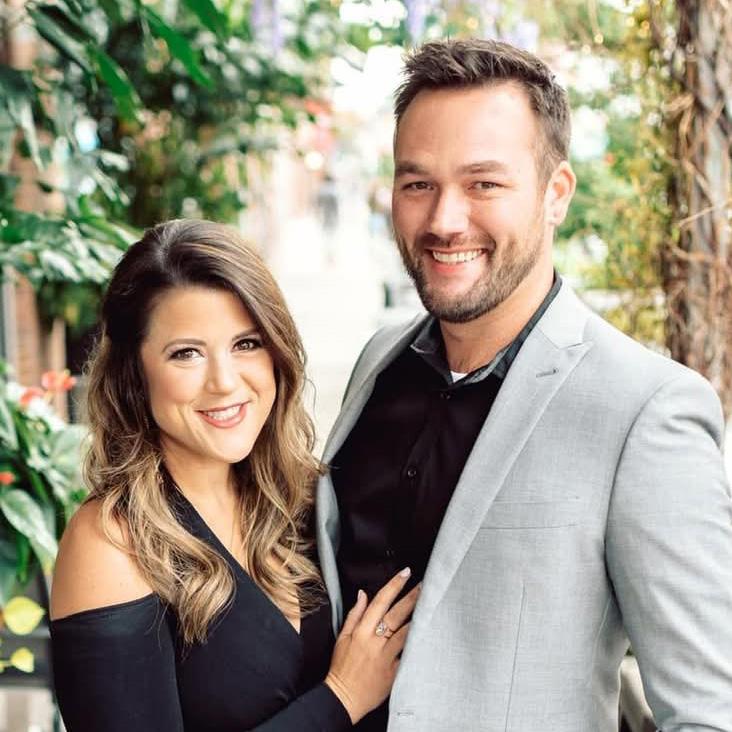

CENTRAL ARKANSAS SOLAR SOLUTIONS; NORTHWEST ARKANSAS SOLAR SOLUTIONS
JEFF HATFIELD, OWNER, PICTURED WITH WIFE KATIE PENNINGTON HATFIELD
What drew you to this career?
I stumbled into solar and roofing in 2020 out of necessity after leaving the alcohol industry, where I was in marketing and sales for an international wine and spirits distributor based out of Houston. My brother-in-law was an electrician for Sunpro Solar and thought I’d be a good fit for the sales division, so I put in an application, and here I am five years later.
How would you describe your leadership style?
Laid back. I let people be themselves. Time has shown me that if you just amplify what people are naturally good at, they’ll become confident and find their own rhythm that complements them. I don’t want my people to be anything they’re not — just be you, find a way to take the information needed to do our jobs, and make it yours.
What has been your organization’s proudest moment so far?
Our proudest moments come from making a difference, and our proudest moment thus far would come from helping Mrs. Gwendolyn Griffin of North Little Rock. She’s an elderly widowed woman who just couldn’t catch a break. She suffered severe damage to her home during severe weather a couple years back, and she had multiple roofing companies come through, promise her the world and fail to deliver. Her roof was left in disrepair and covered in tarps that had eventually disintegrated to nothing, exposing the raw decking, which led to severe water damage throughout the exposed areas. It took a while going back and forth with her insurance provider and gathering documentation from the home builder, but we were able to get her the money through insurance on the storm claims and get her home fully repaired and get her solar system removed, stored and reinstalled after a brand new roof was put on. This was a labor of love for us. We believe when you’re given the opportunity and tools to do the right thing, you do the right thing.

JUSTIN LAREAU, VICE PRESIDENT, ANALYTICS & IT
What drew you to this career?
I was exposed to the construction industry at a very young age. My dad, Jim Lareau, provided surety bonds — performance and payment guarantees to support construction contracts — to the construction industry for over 40 years before retiring. It was always a very intriguing business to me, like most young boys.
How would you describe your leadership style?
Personable and professional. I ensure that my teams feel that they can openly communicate with me regarding their personal and professional lives and ensure that my direct reports have a weekly opportunity to do so through oneon-one meetings. I’ve also always been a fan of the saying, “There should be no surprises in an annual employee review if the manager did their job well.” I try to really live by that concept to ensure that I’m communicating with my peers and teams. Communication is such a critical component of a successful business, in my opinion.
What professional goals have you set for 2025?
I believe 2025 is going to be a transformational year in terms of technology and innovation. Lexicon has developed a great data architecture to support the use of AI applications, and we are well positioned to reap some major benefits. Imagine the days when a project manager had to review a few hundred or thousand pages of a specifications book to find certain answers. GenAI is transforming the construction industry with the ability to utilize a co-pilot to deliver answers within seconds.
What are you most proud of when it comes to the work you do?
When you are out in the field and see and hear about the impact our technology has had on everyday workers, it is such an awesome feeling. A great example would include a material-tracking software that we utilize to geolocate steel on big construction sites, saving a ton of time for our field personnel.

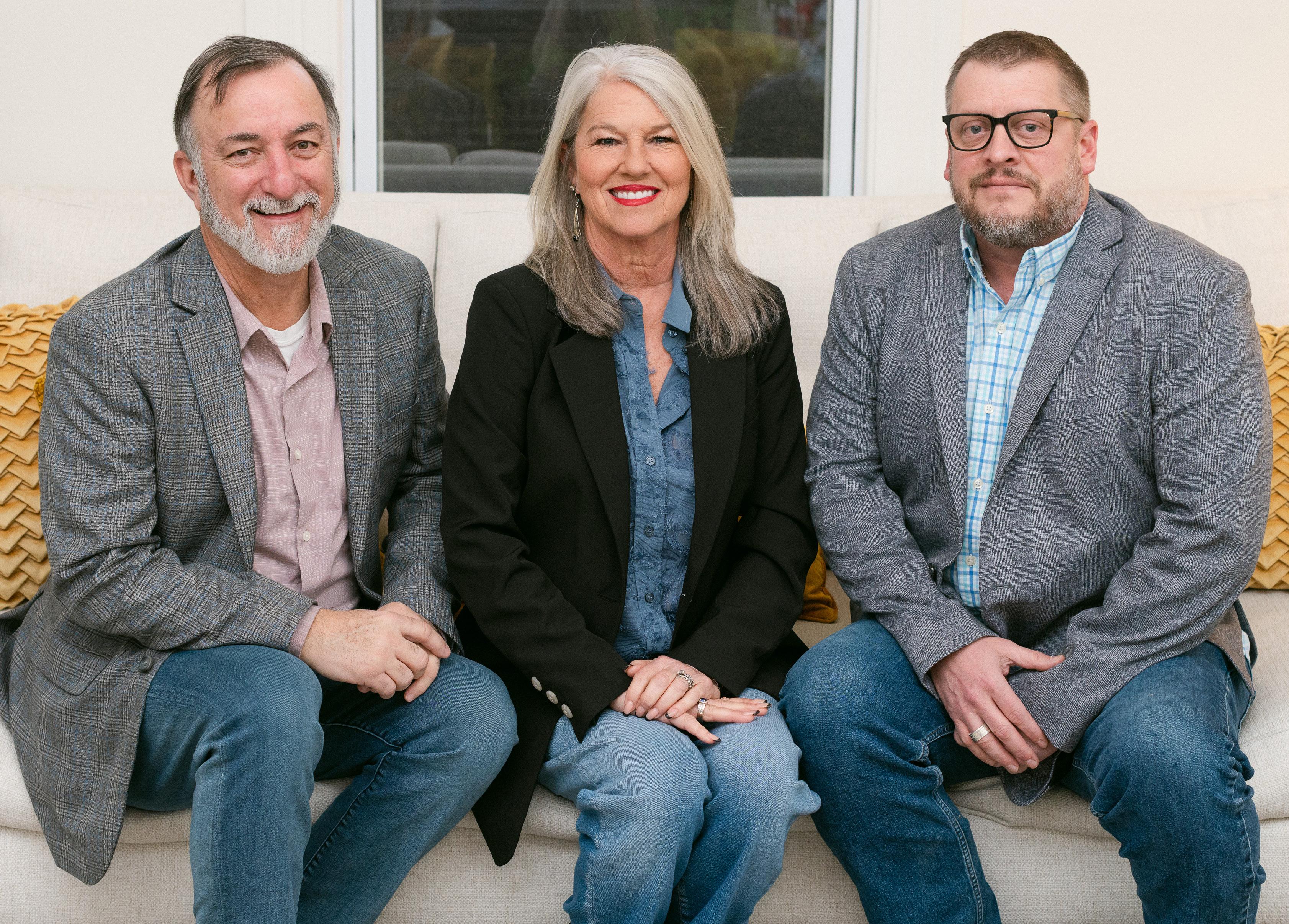
BRIAN PERRY, FROM LEFT, SUSAN PERRY AND BRIAN DWIGGINS, OWNERS
What trends are you watching in your industry right now?
The major trend in our industry is the growing threat of fraud. We’ve positioned ourselves ahead of the curve on that front. We have a dedicated team focused on identifying and preventing fraudulent activity, along with a unique platform designed to verify the legitimacy of buyers and sellers. Beyond protecting our own transactions, we’re committed to educating our industry partners on cybersecurity threats, ensuring they have the knowledge and tools to safeguard their clients and businesses.
What qualities are most important for professionals in your field?
Flexibility, patience and organization are essential qualities for success in the title industry. With no two days — or two contracts — ever the same, title professionals must be adaptable and ready to navigate any situation that arises. Patience is key, guiding clients through what can often be a complex and stressful process that
requires a steady hand and clear communication. Strong organizational skills are crucial to keeping every detail in order, ensuring smooth and efficient closings for all parties involved.
What kind of employee culture do you try to cultivate?
Our company culture is best summed up by our motto, “We are the PRO TEAM.” With a team of around 200, we foster a collaborative environment where everyone, regardless of location, feels connected and supported. We emphasize teamwork, communication and a shared commitment to excellence, ensuring that every employee plays a vital role in our collective success.
How is your company or team involved in the community?
We are proud to be active in all of the communities we serve with the local chambers, nonprofit organizations and industry organizations. Our teams from all over participate with events, volunteering and helping anywhere we can.

DR. JAHON ZEHTABAN
Led by Dr. Jahon Zehtaban, Smile Arkansas provides state-of-the-art, comprehensive dentistry services to patients around Little Rock and beyond. In addition to general dental care, the practice specializes in cosmetic and restorative procedures designed to give patients their ideal healthy and beautiful smiles. Given the increasing interest in cosmetic dentistry, patients appreciate the combination of convenience and expertise Smile Arkansas offers as they can receive dental and orthodontic care all under one roof.
Veneers have become an even more popular service thanks to the advent of no-prep veneers. Unlike their traditional counterparts, no-prep veneers offer the aesthetic results a patient seeks in as little as two appointments and preserve the surface of one’s natural teeth. After an initial consultation, 3D scans of the upper and lower teeth are taken. At the next visit, the Smile Arkansas team meticulously places the thin, lifelike veneers for a transformed smile in minutes. Traditional veneers
are a wonderful option for those ineligible for noprep veneers. Smile Arkansas places all veneers with unmatched service and quality.
A Little Rock native, Zehtaban returned to practice in his hometown in 2017. “Dr. Z,” as he is known, has studied with the Facial Beauty Institute, the American Academy of Dental Sleep Medicine and the American Academy of Cosmetic Dentistry, in addition to training in advanced cosmetics, temporomandibular disorder therapy, controlled-arch orthodontics, growth guidance and sleep dentistry.
Like the rest of the Smile Arkansas team, Zehtaban understands the huge impact oral health and appearance can make for patients both physically and mentally. The practice prioritizes patient-centered care and strives to keep up with the latest developments in dental technology and techniques, allowing Smile Arkansas to provide world-class dental and orthodontic services for the whole family visit after visit.

How does your company distinguish itself?
The financial advisory industry is highly competitive, with both national firms and independent advisors vying for clients’ trust. Small Wealth Management distinguishes itself through a legacy of trust and personalized attention. Our firm has retained the “small-firm feel” that allows us to offer individualized, strategic financial guidance. We don’t just manage wealth — we guide our clients through life’s financial decisions with agility, precision and strategic insight, much like the knight in chess, which inspired our new brand identity.
What qualities are most important for professionals in your field?
Integrity, adaptability and strategic thinking are crucial in wealth management but so is approachability. We believe wealth management shouldn’t feel exclusive or intimidating. It’s about helping people from all backgrounds make informed financial decisions with confidence. The ability to break down complex financial concepts, provide clear and practical guidance, and build lasting relationships is just as important as technical expertise.
What do you want to see the business accomplish in 2025?
We want to further solidify our strategic role as a trusted, agile financial partner for individuals and families. This means continuing to grow while maintaining the small-firm feel that sets us apart.
What has been your organization’s proudest moment so far?
Over the past 25 years, our proudest moments haven’t come from a single milestone. They happen every day.
Each time we help a client make a confident financial decision, navigate a major life transition or build a strategy that secures their future, we consider it a win.
The transition to Small Wealth Management is simply the latest step in our ongoing evolution, reinforcing our commitment to delivering trusted, strategic guidance with the same level of dedication that has defined our firm for decades. The fact that clients continue to place their trust in us generation after generation is the greatest measure of our success and a tremendous source of pride for us.

What has been your organization’s proudest accomplishment so far?
Our organization’s proudest accomplishment has been the steady growth we’ve experienced while establishing ourselves as a trusted brand in the wellness and aesthetic field. Our focus on creating personalized experiences has allowed us to form meaningful, long-lasting relationships with our patients, who continue to return and recommend our services. This trust and connection are what truly define our success, and seeing the positive impact we’ve had on our patients’ lives has been the most rewarding part of our journey.
What is something everyone gets wrong about your industry or business?
Many people assume it’s all about looks, overlooking the deeper connections to overall health and well-being. In reality, the industry is focused on enhancing both physical and mental health, often integrating practices
that promote self-care, self-esteem and a sense of balance. Wellness and aesthetic treatments can boost confidence, improve emotional health and support a holistic approach to a person’s overall quality of life, far beyond just aesthetics.
How is your company involved in the community?
Our team is actively involved through various outreach programs and partnerships with local organizations. Additionally, we collaborate with local charities to support causes related to mental health, women’s wellness and underprivileged communities. We also encourage our employees to volunteer and participate in community service initiatives, fostering a sense of connection and giving back. By being present and supportive in our local area, we strive to make a meaningful difference beyond just our services.
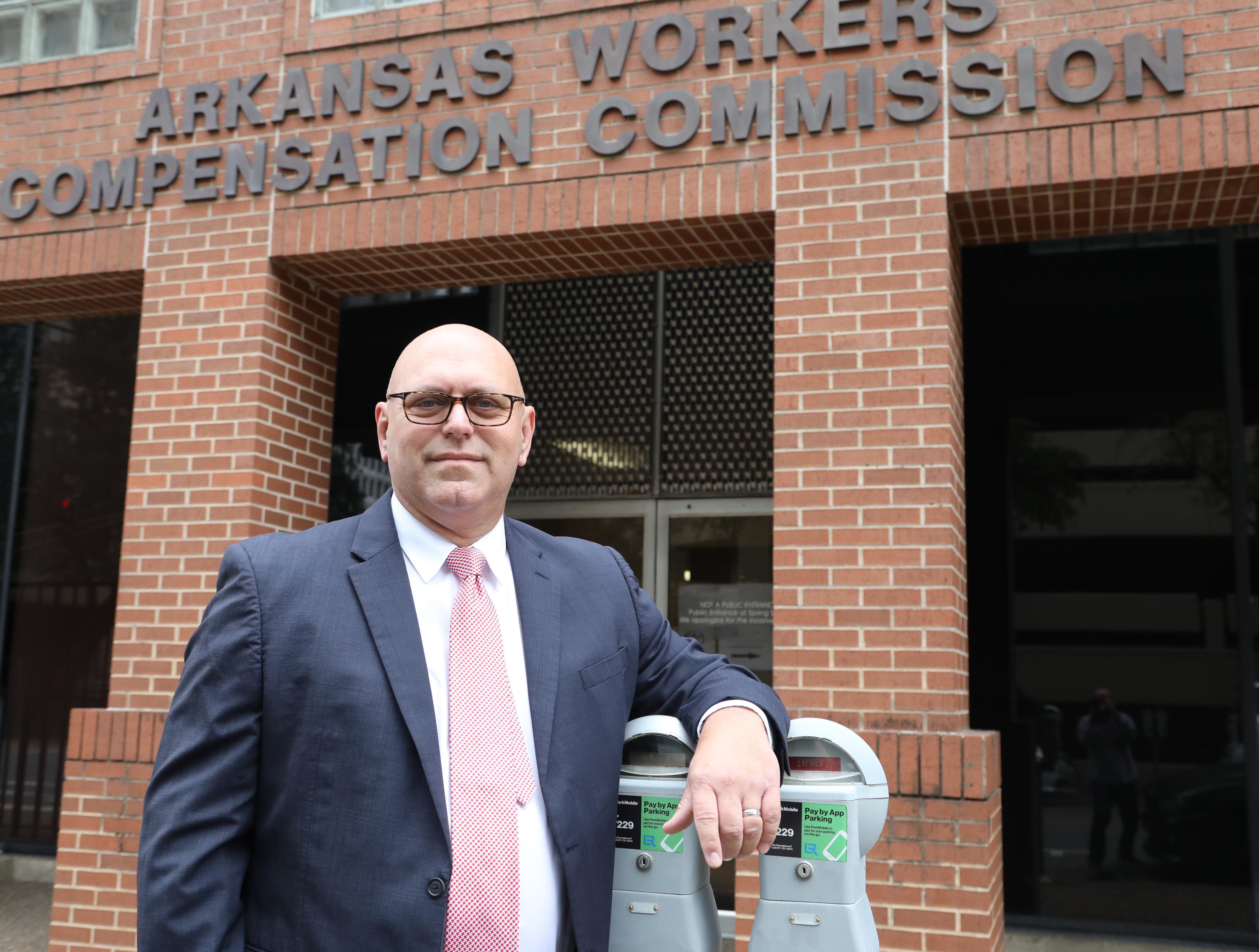
ANDY L. CALDWELL
Andy L. Caldwell has been practicing law since 1999. After entering the field of workers’ compensation, Caldwell saw that many individuals were not getting the benefits to which they were entitled, and he set out to change that. Ever since, Caldwell Law Firm in Little Rock has been fighting for the benefits of injured workers, helping them return to work and provide for their families.
Workers’ compensation can be a confusing process, one made even more difficult when dealing with an injury and uncertain income.
The Caldwell Law Firm team works to make the challenging time more manageable by providing clear communication and expert advice.
A detail-oriented problem solver, Caldwell has become a leader in workers’ compensation law. He has lectured to Fortune 500 companies, insurance carriers and members of the bar on topics such as the Family and Medical Leave Act, the Americans with Disabilities Act and legal ethics.
“When injured workers are wrongfully denied workers’ compensation benefits, they cannot work and they cannot get the necessary medical treatment for their injuries,”Caldwell said. “They are in a real bind and often times have to seek some sort of public assistance. It is my mission to prevent insurance companies from redirecting their liability to the taxpayers of this state.”

make national security state’s top export
By Doug Crise
Lee Watson sees a different Arkansas than most.
The lifelong entrepreneur and founder/CEO of Little Rock’s Forge Institute deals heavily in cybersecurity, technological advancement and career training in various security fields. What he sees over the horizon is a boom in military technology right here in Arkansas, and his company is putting up both money and time to see that it happens.
“The important thing to me is that we unlock this sector of the state’s economy,” said Watson, a Heber Springs native who graduated from the University of Central Arkansas in Conway with a degree in business administration. “I think creating an opportunity to really help innovate and empower the modern warfighter is a really important mission and something our state can be proud of.”
Watson is not content to just talk about it. Forge applied to the Arkansas Economic Development Commission for an accelerator grant, which
provides funding of up to $250,000 for technological innovation and mentorship for technology-based companies. The result is the Phoenix Xcelerator, a program designed to equip defense technology developers with the skills to see their projects come to fruition.
“The state touts aerospace and defense as its No. 1 export, but no dedicated programming for entrepreneurs had existed in the defense sector,” Watson said.
Watson is not wrong. According to the Observatory of Economic Complexity, Arkansas exported munitions and projectile weapons to the tune of $515 million in 2023. That was only bested by $846 million in the export of aircraft parts, which, in itself, includes the manufacture of military aircraft.
There is opportunity and a lot of success to be had in military technology, but the path to entry is a long and narrow one. Many people, when they think of defense technology, think of large corporations with heavy government contracts. That is not necessarily the case, but being a startup in the defense sector is not an easy task. Somebody developing a piece of technology may be a brilliant engineer but is hamstrung by the entrepreneurial aspect of getting their ideas off the ground.
“There’s so many components across the board there,” Watson said. “In 12 weeks, we can actually work on all of them with startups and make sure the pieces are where they need to be.” Forge is deploying a small squad of military experts, entrepreneurs and technical analysts to make that happen. One of them is Walter Burgess, a former chairman of the Arkansas Science and Technology Board and co-CEO of photonics and laser developer Power Technology in Alexander. Burgess will serve as “entrepreneur in residence” for the Phoenix Xcelerator. He said the requirements for engineering, marketing and military knowledge puts would-be startups in a unique situation.
“The state touts aerospace and defense as its No. 1 export, but no dedicated programming for entrepreneurs had existed in the defense sector.”
Meanwhile, individuals with a great marketing plan can get tripped up by the constantlychanging technical demands of the industry, and even if somebody can master all those factors, the details and bureaucracy involved with producing an idea for national defense can take the wind out of anybody’s sails.
— Lee Watson
“They may have a good prototype. They may have a great idea they need to create into a prototype,” Watson said. “Either way, one of the things we focus on is helping align their innovation to the needs of the warfighter. If you’re building a solution, you get very emotionally attached to that solution, but unless you’re validating that to your customer base, you have this shiny object that no one cares about.”
The Phoenix Xcelerator hopes to change that, and Watson bets the final result will lead to more investment in Arkansas. After a rigorous evaluation and selection process, those admitted to the Xcelerator will go through a 12-week program, launched last month, that includes mentoring, coaching and networking on everything required to go from startup to real-time provider of defense technology, cybersecurity, artificial intelligence, surveillance and more.
“We’re really trying to find those entrepreneurs with good ideas that appeal to defense companies,” Burgess said. “Aerospace and defense is our state’s No. 1 export. It’s an incredibly difficult market to break into. What the Phoenix Xcelerator does is break down barriers.”
While the focus is on Arkansas, Burgess believes there are bigger implications at play. Simply put, the difficulty of getting defense manufacturers to sign off on an innovation means fewer developers get a foot in the door. That, in turn, means defense companies have fewer and fewer options to choose from. It is Economics 101.
“We’re really trying to solve a core problem,” Burgess said. “We used to have 50 contractors with the federal government. Now we have five. All this results in reduced competition, higher prices and less innovation.”
Burgess added that about 40 to 60 percent of all defense contracts involve only one bidder.
“It’s definitely not the outcome we want,” Burgess said.
Forge hopes to change all that by preparing Arkansas defense startups to get a piece of that pie. The 12-week program will look to touch every part of the process, from how to create a business model and go-to marketing strategy to instruction on how to write funding proposals.
In addition, the Phoenix Xcelerator will cast a wide umbrella when it comes to technology. While there is still a place in the modern military for projectile weapons and “stuff that blows up,” national defense in 2025 also means photonics (light), drone and counter-drone technology, and bleeding-edge surveillance, and reconnaissance equipment. There is also room for “dual-use” technologies — products that serve both military and nonmilitary demands.
“A technology that has a commercial application may also have a military application,” Watson said. “If a small business
startup or entrepreneur has something they think would benefit the Department of Defense or the national security apparatus, we’d love to hear from you.”
Perhaps most importantly, there will be plenty of time spent on artificial intelligence. At the end of the day, national defense is just like any other present-day business in trying to figure just how to best harness AI.
“AI is really interesting,” Watson said. “I don’t think people really appreciate how much impact AI is going to have on the world. It’s not just using ChatGPT. That’s a cool tool to use to write a better email, but really, it’s the automation, where the AI can act and decide things just like a human could. They’re already projecting a multitrillion-dollar industry with AI, so let’s get a piece of that.”
The full scope is more than what one or two people can handle, which is why Forge is bringing in a haul of experts to hit every aspect. That includes Mark Cheng of the CIA’s senior intelligence service, and Dawn Meyerriecks, former CIA deputy director for science and technology.
When it comes to any piece of defense technology, it had better work, and it had better work in conditions that even the brightest civilian innovator may not consider. That is why even though there will be plenty of teaching on the entrepreneurial side, there will also be a heavy emphasis on bringing proposed products up to military code.
“It’s not easy,” Burgess said. “We’re designing equipment that can work at 73 C, and you can’t have an error.”
Innovation does not happen in a vacuum, which is why the program will also facilitate networking with contractors. With the pace of technology being what it is, major contractors are looking more toward acquiring outside innovation rather than going through the laborious process of getting in-house initiatives off the ground.
“We’ll be looking to connect them with prime contractors,” Watson said, using Boeing as an example. “The big companies are always looking for innovative vendors and suppliers to add to their ecosystem. We’re seeing more innovation in the Department of Defense on the procurement side, making it easier for smaller, nontraditional suppliers to have a sort of testing relationship.”
If all goes well — and it should — the future results will dwarf Arkansas’ already high numbers for defense and security innovation. The barriers for the small entrepreneur are crumbling, and the Natural State is poised to be home to some of the biggest advances in keeping the country safe.
“It’s going to be a pretty intense and aggressive program,” Watson said. “When they come out of this, they’re not only going to be equipped with entrepreneurial administrative knowledge; they’re going to be equipped with ready-made connections through the program.”
In March, the Forge Institute announced the participants of its inaugural Phoenix Xcelerator program, sponsored in part by the Arkansas Economic Development Commission and the Walton Family Foundation. Power Technology is the corporate partner and will provide trapped intellectual property for development and other assistance, while SPIE, the international society for optics and photonics, will provide subject matter expertise. The Arkansas Aerospace & Defense Alliance will feature select companies at the 2025 Mid-America Aerospace and Defense Summit.
After an extensive review of applicants from across the nation, the following early-stage innovators were chosen:
• Mod Tech Labs, Austin, Texas: Delivering cutting-edge artificial intelligence and automation tools designed to streamline content creation, optimize production pipelines and enhance 3D workflows.
• TaterTek, Des Arc: Innovative propulsion system that will revolutionize mobility, transportation, logistics and defense by enabling a single hydroterrain vehicle to travel on land, afloat and underwater to reach locations that were previously prohibitive.
• Orion Edge Group, Lakewood, Colorado: Enabling warfighters to disrupt and deny the communications and navigation networks of adversary robotics on the battlefield with wearable, individual electromagnetic warfare solutions.
• FireWatchAI, Fayetteville: Bringing advancements of AI and additive material manufacturing into defense applications to increase the survivability of modern warfighters.
• Gentry Professional Services, Little Rock: Engineers solutions to enhance customer capabilities and provide a sustainable competitive advantage.
• NextGen Lights, Fayetteville: Creating a light powered by lasers for long-range night visibility for naval ships.
• Foresight Engineering, Rogers: Developing advanced imaging solutions for small-arms rifle scopes and hunting scopes.
• Soteria Battery Innovation Group, Greenville, South Carolina: Addressing thermal runaway at the root cause — the internal short circuit that releases the electrical energy.
• FOG Systems, Fayetteville: Developing a portable and offline AI model to assist with guidance for land navigation in foreign territories.
The old adage that says what goes around comes around is true when it comes to vinyl, which has been spinning back into style in recent years.
While trend cycles are not a new concept, one that has defined all expectations was the huge increase in record sales starting in about 2006. That year, there was a noticeable uptick in sales and the vinyl revival has not stopped since.
Vinyl album sales in the U.S. grew for the 17th consecutive year in 2023. More than 43 million albums (EPs containing 15 to 30 minutes of material and traditional LPs) were sold in the country last year, according to a Statista study.
The record bubble does not seem likely to pop any time soon — another piece of evidence of this is the popularity of Record Store Day.
Record Store Day has been working to spread the word
By Alex Hardgrave
about the “unique culture surrounding nearly 1,400 independently owned record stores in the U.S. and thousands of similar stores internationally” since 2007, the RSD website states. The first day recognizing record stores took place April 19, 2008, and a small list of titles were released to the participating stores. This year, Record Store Day is scheduled for April 12, and the exclusive record-release list has grown to include artists of all genres big and small.

Three independent Arkansas record stores are reaping the vinyl revival benefits, especially on Record Store Day: Block Street Records in Fayetteville, Control Records in Little Rock and Full Moon Records in Conway.
Block Street Records was founded by Wade Ogle in 2014, after he decided to move away from the bar business. He used to own a bar and did the booking for bands that performed there.
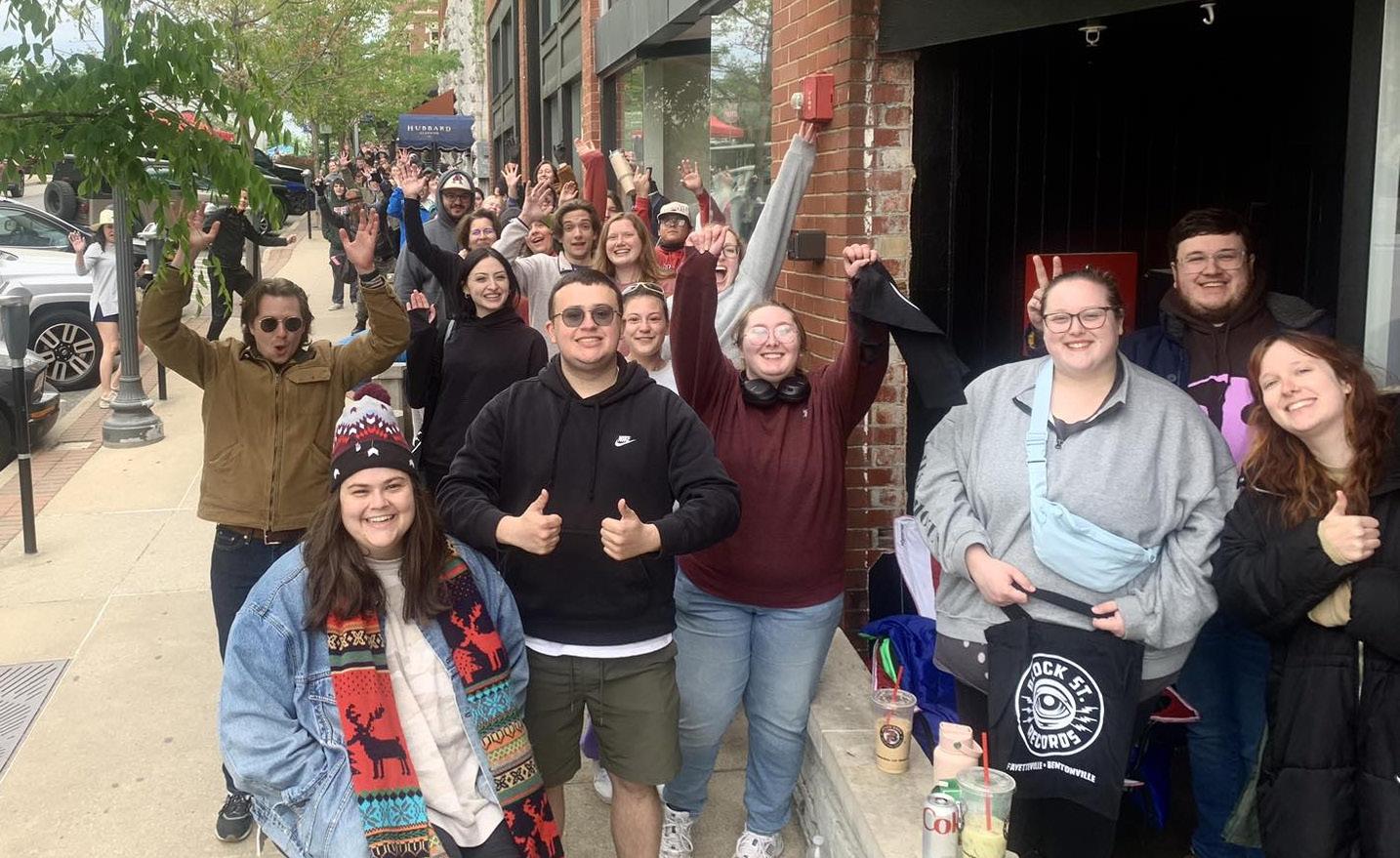
He decided to stay connected to the music business by opening a record store.
“I kind of just pivoted from one part of the music world to another,” he said.
Wes Howerton, owner of Control Records, thought he was done with the music world after moving back to Little Rock from Seattle, where he worked managing bands.
“I thought I was done in the music industry but ended up not being done, so I opened Control,” he said.
Justin Dunn, owner of Full Moon Records in Conway, collected records for 10 years prior to opening his store.
He was first gifted a Johnny Cash record when he was young, and when he rediscovered it in his adulthood, he decided to invest in a record player. From there, he bought about 2,000 records from a neighbor.
“Eventually, I just had so much,” he said. “I got tired of working for other people, so I decided to work for everybody, and I opened up a record store in October 2021.”
Ogle said he hesitated to call himself a record collector but has always had albums.
“I’m not a collector in the sense of I don’t have thousands and thousands of personal records that are privately mine,” he said.
Ogle said he would have opened the store either way, even if record purchases were not on the rise at the time, but he definitely benefited from the timing.
“Me opening the store, it was very serendipitous,” he said.
Since the store’s opening, Block Street has participated each year in Record Store Day.
He said the day brings a massive line and even people camping out. Last year, people camped out for 48 hours, he said.
All that is in the hopes of snagging a Record Store Day exclusive release or any other favorites the store may carry. Even though there are limited quantities of certain records released that day, there is no pushing or shoving in the store.
“It’s a lot of like-minded people, and they’re all having fun,” he said.
While it’s the busiest day of the year for Block Street and the biggest day in terms of volume sold, Ogle said it is also a big investment to get the exclusive records in store.
“It’s a big number at the end of the day, but you have to take into consideration that it’s a big number on the front end,” he said.
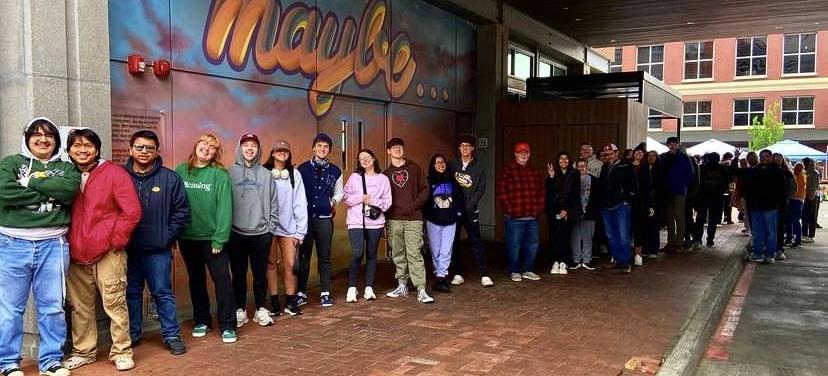
Howerton would go to Record Store Day before he opened his store.
“It was always a really amazing day for the record collecting community to come together,” he said.
He said he enjoys the day at Control, which is the busiest of the year, because it brings people of different ages who love different genres all together at the same time, standing in line and meeting one another.
“No matter what kind of music you’re into, people are standing in line to buy something they love,” he said. “It creates an even stronger community at Control.”
On most days, Ogle sees people of all ages, but he said Record Store Day tends to skew younger since there are long lines.
He chalked up the vinyl boom to a few things. He said records are still the “superior format” because of the sound and the artwork. He also said there is a ritual to it that people like. There is also a collectability to the records.
“I have kind of thought it would plateau and start to descend, but I’ve thought that for a few years, and it just hasn’t, so I don’t know anymore,” he said.
Even if record sales decline, Ogle said he thinks there will always be enough of an audience to keep his shop going.
Dunn said the analytics from his point-of-sale system shows that he gets new people in the store all the time, so he thinks things will stay positive for record sales.
He thinks the popularity comes from nostalgia and being able to hold the physical record in one’s hands versus just streaming favorite songs.
Howerton said he thinks there has been a boom in vinyl sales because of the active listening.
“I think they like to slow themselves down for the length of a record,” he said. “When we interact with our world more directly, it really slows us down.”
Howerton also said that he does not know when vinyl popularity may dip but that he will continue encouraging a community around Control.
“That will always ensure that there are people who want to come,” he said.
However, he thinks it will not slow down.
“I think the faster society runs, the more that this idea of slowing down and enjoying art will sustain,” he said.
HEADER
By Dwain Hebda
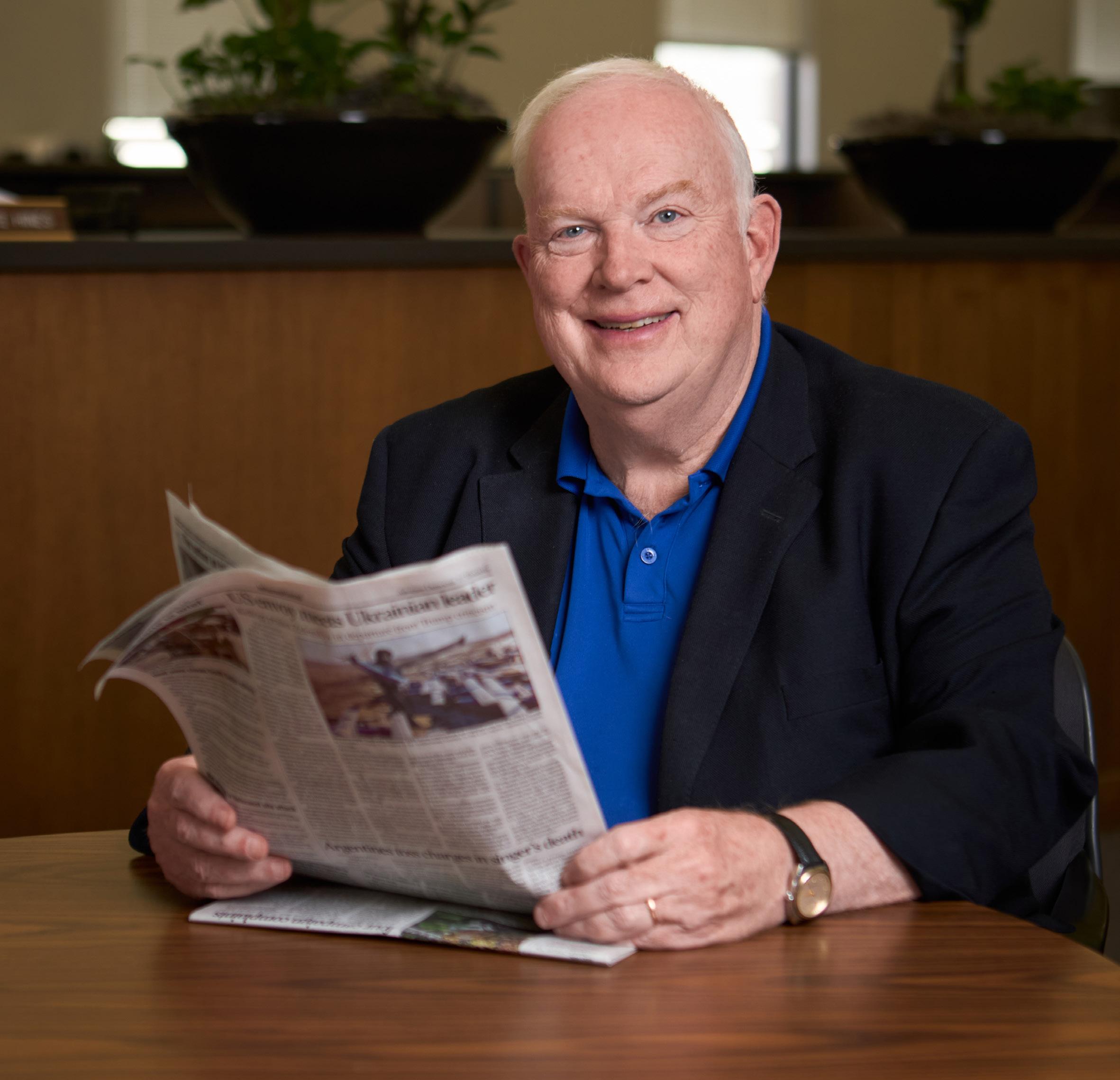
Rex Nelson has lived a remarkable life in the broadcast booth, on deadline, in the statehouse and on the road to the next great plate of fried chicken in Arkansas
There are few things that stump Rex Nelson for words, especially when the topic is anything and everything Arkansas. Nelson, esteemed senior editor and columnist at the Arkansas Democrat-Gazette, is renowned for his encyclopedic knowledge of the Natural State, be it football mascots, roadside attractions or, especially, where to eat.
Nelson differs from the garden-variety state savant for the meticulous detail he can apply to any question about Arkansas. While most can provide a top three in their respective category, Nelson’s vast knowledge and comprehensive attention span can answer that question scattered, smothered or covered.
Need the best barbecue? Nelson has a ready list of the classic joints, the new smokers and the flavors of the moment, often accompanied by stories of the people behind the pork.
Want to know the best slice of pie between Jonesboro and Arkadelphia, his hometown? Nelson knows so many of them so well, one wonders if he did not snatch some off a windowsill or two in his day.
Looking for the best plate lunch in the Natural State? Nelson does not fall for such a trick question, knowing there are too many to count. Instead, he asks where one is headed and then lists the best spots along the route, coordinated by time of day and speed and direction of travel.
some of the greats of Arkansas journalism.
“I’ve got to tell you, since I was a young kid, I have been a newspaper junkie as long as I can remember,” he said. “A lot of this came from reading great storytellers who put stories in print. I can remember as a young child running out into my driveway in my pajamas to get the Arkansas Gazette. We got the Gazette every morning, got the local paper every afternoon. I just devoured it, whether it was Orville Henry writing about the Razorbacks, Jim Bailey writing about the Arkansas Intercollegiate Conference or Ernie Dumas writing about the legislature.
“I have always had the ability to turn everything else off and totally focus on the task at hand. To this day, when I write a column, I almost always do it in one setting. I don’t like to put it off. I don’t like to save a draft and have it hanging over my head. I never look at an email during the two or three hours I’m working on the actual writing of a column. I put my phone away. If I have that focus, then I feel like I can do a better job. In fact, it’s kind of enjoyable because I don’t think of any problems I have at home or wherever. My mind’s just cleared. To do a good job, you’ve got to be totally dialed in and focused. I think that’s probably been the key.”
It is the same with the subject of football — again, something so emotionally and regionally charged, Nelson knows better than to single out a specific program, aside from his beloved Arkadelphia alma mater, the Ouachita Baptist University Tigers. Of all others, he possesses a great story: the legacy of the state’s power high school program, a glory season for a plucky upstart small college and, for the also-rans, some piece of fascinating trivia.
In fact, about the only thing that gobsmacks Nelson into relative silence is when someone slips in between the history of the Buffalo River, the origins of the Fouke Monster legend and the best milkshake in the Delta that he himself is among the state’s treasures.
“That’s too kind,” he said. “You know, the [Democrat-Gazette] has been great. They’ve never told me what to write. I made the decision it’s going be all Arkansas, so that means I have to be among the most knowledgeable people on Arkansas. I digest it all because if it’s Arkansas, I need to know it.”
Nelson began life in the all-American confines of a small town where, from his earliest memory, he fell in love with the lore of his beloved state told in the lyrical manner of
“At a time when we really didn’t have a lot to be proud of in this state in the ’60s, we did have a Pulitzer Prize-winning statewide newspaper, very literally, in the Arkansas Gazette. One of the things that kind of drives me now is to keep a tradition going of a great statewide newspaper because it’s the thing that really kind of hooked me on Arkansas, if you will.”
What the paper did not ignite in the young Rex, his father, a sporting goods salesman, did. The elder Nelson was a gifted storyteller — and his clientele of coaches as much or more so — which filled the workday of traveling and sales calls with local lore, especially during one particularly formative year in his son’s life.
“My father really instilled in me the love of rural Arkansas traveling around,” Nelson said. “Dad sold to high schools all over the state, and my birthday is Sept. 2, and Dad decided he didn’t want me to be the youngest one in the first grade. He wanted me to be the oldest. His joke dealing with coaches all the time, he used to tell people, ‘We redshirted him in kindergarten and gave him another year.’”
At that Nelson gave out a trademark belly laugh but, when the mirth subsided, took on a quieter tone.
“Actually — and I’ve written about this before, even though it’s very personal — when I was 4, I had a 9-yearold brother killed in an accident on Leap Day, Feb. 29, 1964. Looking back, I think it was probably therapy for my dad to have his youngest son on the road with him for an entire school year when I was held out and didn’t start first grade until the next year.
“I’ve got to tell you, I look back on that as one of the most wonderful years of my life because we’d stay in Holiday Inns when he’d often go out for two or three straight nights. If it was spring, we’d stop, and he’d let me wade in creeks. I accompanied him that entire school year and,
therein, grew a great love of traveling rural Arkansas.”
By age 7, Nelson knew he wanted to be a reporter, and he has the first-grade art project to prove it.
“My mother found this and had it framed,” he said. “Everybody else was, ‘I want to be a pro football player.’ ‘I want to be an astronaut,’ whatever. Mine was, ‘I want to be a reporter.’ I drew this stick man sitting at a desk, and he’s got a microphone in front of him and, behind him in the window, ABC News, again, probably because it was easier than CBS or NBC. I knew in the first grade — I swear to God, that’s how weird a kid I was.”
“To simplify, passion first. You’ve got to have a real passion for doing it, and I think that goes for anything that you do. I truly think unless lightning strikes, I’m probably in my last job, and I’m just trying to keep getting better at it. Passion first and then curiosity. I think the best writers are endlessly curious about every subject under the moon. That’s why I can never catch up on my reading because I go down rabbit holes, you know? I’ll read something about the country of Chad or whatever, and then I’ll look up Chad on Wikipedia, and then I start connecting to articles about it. The next thing you know, I’ve spent four hours reading about Chad and haven’t finished the paper. I’m curious about everything, and I think that’s something all good writers have in common.”
Nelson began to make good on that forecast in high school, but for Arkansas, it all might have been for naught had he placed one notch higher in a scholarship competition to Vanderbilt University in Tennessee. His second-place showing got him an invitation to attend the school, but without the scholarship dollars that went to the winner. Nelson, ever the pragmatist, decided to stick closer to home.
“I clearly remember asking Dean So-and-So from Vanderbilt how much money first runner-up got, and it was zero,” he said. “My parents, bless their hearts, said if you have your heart set on Vanderbilt, we’ll get you there, but I had a full academic ride at Ouachita.”
Arkadelphia high school game on Friday night and then, over the weekend, would call a Ouachita game, and then because we didn’t have Saturday or Sunday issues — we were like a lot of small-town dailies, Monday through Friday afternoon only — I’d spend all day Sunday pulling together my high school story, my college story, and the other high schools and colleges we would cover.”
“The people who don’t really know me will say, ‘Oh, B.S.,’ to this, but the people who really know me know I’m honest when I say I have reached this wonderful point in a life where I’ve been so lucky. I’ve sat in the press gallery right above the president for multiple State of the Union addresses. I’ve been in the Oval Office for three different presidents. I’ve covered multiple Kentucky Derbies. I’ve covered the Super Bowl. I’ve had all of these events, and I’ve reached this wonderful place in life where I’d much rather be in my car driving to go speak to the Harrison Rotary Club than getting on the airplane to go cover the Republican National Convention or the Democratic National Convention — been there, done that, and it was great, but you couldn’t pay me enough to fight those crowds and the security and all. It’s kind of a good point in life just to be traveling Arkansas. That’s what I enjoy now and what I really love being a part of.”
Nelson’s other motivation for staying home was the opportunity to get real-world experience at the same time he earned his degree. He worked at two radio stations in town and was sports editor for the local paper, the Daily Siftings Herald. Recalling his schedule in those days stretches his own imagination as to how he pulled it off.
“Typical small-town thing,” he said. “I would call an
“Then, [Ouachita graduate] Cliff Harris was in his last two years with Dallas, and I covered every home game in the press box. I had it down to a science — if Dallas had a home game, I’d have a full tank of gas, and from the Pine Street exit on Interstate 30 in Arkadelphia, I could be in my parking space right up against Texas Stadium in four hours straight up if I didn’t stop. I’d drive down, cover the game, come back, and then, lucky I was young and stupid, I’d put together all the Friday and Saturday stuff together during football season. I’d work all night to get my Monday pages ready for the paper then go straight to class Monday morning.”
The effort paid off as Nelson walked off his college graduation stage right into the sports department at the Arkansas Democrat, covering high school sports and the Arkansas Intercollegiate Conference, comprised of what are today called Division II schools. The longer he stayed, the more landed on his desk due to comings and goings, in-
cluding Oaklawn horse racing in Hot Springs and tennis coverage.
After a brief return to Arkadelphia in newspaper and radio, he was back in Little Rock, where he was dispatched to Washington, D.C., for the first of two spells in the Arkansas Democrat’s Washington office. The first time he was there, he met the love of his life, future wife Melissa. The second stint, later, he got the honor of covering Arkansas’ first homegrown president, Bill Clinton.
“They created this position called political editor, and they wanted me to come supervise all of the coverage of the Clinton campaign,” he said. “I thought, ‘Man, this is Arkansas history. I can’t not do it,’ so I supervised all the campaign coverage. You know, when people ask me what’s the most significant story I ever wrote, it has to be my byline on the lead story on the ‘Clinton Wins’ edition the day after the election. You realize it was one of those papers everybody would save all over Arkansas.”
From there, Nelson joined Gov. Mike Huckabee’s team following Gov. Jim Guy Tucker’s resignation, handling communications duties. He would also spend time in President George W. Bush’s administration before finally getting out of politics for good. After a brief foray into corporate communications, he came back to the Arkansas Democrat-Gazette for the fourth and final time eight years ago.
Along the way, he has found other outlets for his writing about the legends and lore of Arkansas through Rex Nelson’s Southern Fried blog and podcast. He was also one of the earliest lieutenants of David Bazzel in creating the Little Rock Touchdown Club and initiated the Arkansas Food Hall of Fame. He just entered his fifth decade as the voice of Ouachita Baptist football and is enshrined in the Arkansas Sportscasters and Sportswriters Hall of Fame. Incredibly, he is not yet enshrined in the Arkansas Sports Hall of Fame, but then, he is not planning on going anywhere either, so there is still time. Even if that ultimately eludes him, as unconscionable as that would be, Nelson receives validation of a much more immediate variety in the way his columns — usually
“I think a statewide newspaper helps unite us as a state. With east Arkansas really having suffered now for several decades economically, south Arkansas suffering, north Arkansas taking off, central Arkansas doing very well, you’ve got this gap. I wrote a column once after I got to thinking about what can really hold us together as a state. I came up with three things: One was a really great statewide newspaper. Another was a governor who really cared about every area of the state and really focused on the whole state, and third was Razorback sports. We are a small state, and I think it’s good that I can pick up a paper and see obituaries from Texarkana or Bentonville or Osceola because I think that helps hold us together. Otherwise, we split off into several different territories without much in common.”
positive dispatches from around the Natural State with the occasional biting criticism of what he sees as detrimental to Arkansas — are received and consumed by his audience.
“I’m lucky in the sense that — and I mean this — I’ve just never considered myself personally that interesting,” he said.
“When I traveled with my dad and I saw him work and I think back now to what made him successful, he always used what’s now the Arkansas Activities Association, I think it was the Arkansas Athletics Association at the time. He kept an AAA directory in the car. In that, for every school, he kept coaches’ wives’ names, their kids’ names, whether they’re crappie fishermen or deer hunters, you know? He kept notes. When we’d stop at school, he’d refresh himself with those notes. Then he could come in and say, ‘Hey, how’s so-and-so?’ you know? His success as a salesman was he didn’t go in and simply say, ‘What’s your order?’ It was making the connection and storytelling.”
“I don’t like some columnists who write a lot of columns about themselves. I don’t think readers care, you know, about me fixing the washing machine, which is what you see that passes for columns these days. At my age, I would much rather write about Arkansas. It is a very unique place, and there’s just so many untold stories out there.
“People say, ‘Well, how do you come up three columns a week?’ I say, ‘It’s really not enough if you look at my list of potential columns.’ There’s stuff I’ve already researched, and I just can’t get to it. Arkansas is an interesting and can be a frustrating place, but I want to tell those stories.”
Sen. Tom Cotton talks reelection bid, conservative mandate

TBy Dwain Hebda
here was a time during U.S. Sen. Tom Cotton’s political career when it might have felt good to stand down. Cotton’s time in Washington has paralleled the most divisive in decades, only a brief period of which did Republicans seem to have a foothold to advance a conservative agenda.
That all changed, and decisively so, with last November’s national election, during which voters resoundingly called for change by ushering in the second Trump Administration, as well as Republican majorities in both houses of Congress.
The first 90 days of Donald Trump’s steamroller second presidential term have hit like a political earthquake — sudden, terrain altering — as a rudderless left seeks a leader and a brand. No era since that of Ronald Reagan has felt more emboldening to the right, and so it was probably no surprise when Cotton announced in February his intention to run for reelection in 2026. After all, things are just getting good.
Arkansas Money & Politics reached the junior senator, chair of the Republican Conference, for a talk about his desire to stay in the fray, the mood in Washington and keeping the juggernaut rolling.
AMP: Let’s start with your most recent announcement to seek reelection. What issues and factors influenced that decision?
Cotton: You know, I’m pleased with all we’ve accomplished over the last 10 years, especially during the first Trump term and, now, the first few weeks of the second Trump term, but there’s obviously a lot of work left to do, a lot of damage to repair, from the Biden administration. I want to continue the job, working with President Trump and a Republican majority in Congress, to get prices stable again, to get jobs increasing, to secure our border, to protect our citizens from crime in our streets or from threats abroad. I’m extremely grateful that the people of Arkansas have entrusted me with this work for a couple of terms, and I’m humbly asking for their support so I can continue to work on their behalf.
AMP: You serve now and would continue to serve upon reelection in a time of great change in Washington. What’s the tone there now, and how are lawmakers, even those on the right, reacting to not just the changes being made but the pace at which it is being made?
Cotton: Well, you’re right that it’s a time of great change and fast change, and I think most Arkansans are pleased with the pace of change. They know that Washington needs change. That’s how we got to the point where we’ve got a debt that’s more than $35 trillion, where we’re now spending more on interest on our debt than we are on our military. [Change is] what President Trump promised to deliver, that’s what we campaigned on as Republicans in Congress, and that’s exactly what we’re doing.
Now obviously, the nation’s problems, like that debt, were not built up overnight, and we’re not going to solve them all the first day or the first week or the first month or the first year of the second Trump term, but we’re going to work together collaboratively with Republicans and Congress and the president to try to tackle the big challenges, like our wide open border, like inflationary prices and growing threats to our national security.
AMP: Given the razor-thin majority Republicans hold in both houses of Congress, cohesion is going to be critical moving forward. What is your sense of the unity of the Republican Party at this point in time?
Cotton: I think Republicans are very unified behind the agenda on which President Trump and all Republican members of Congress campaigned last year. Obviously, we have differences of opinion, and we represent different states. I’d say it’s more a difference, sometimes, of priorities or urgency.
In Arkansas, for instance, we want to make sure that we get a good Farm Bill passed under [Sen.] John Boozman’s leadership, where that might not be quite as important to some other states. We want to keep taxes low on working families, where in more affluent congressional districts, that might not be as high a priority. Republicans are unified under the broad agenda on which we all campaigned of stable prices, prices rising, wages, a secure border, safe streets and a strong military.
AMP: In one of the president’s first big wins, Republicans got their continuing resolution that kept the government open, but critics said failure to pass a budget was just political business as usual. What is your assessment of the major stumbling blocks toward passing a budget, something we have not seen in some time?
Cotton: Well, one major stumbling block is Democratic obstructionism. Just look at why we got to this point right now. The Senate Appropriations Committee passed all of the annual spending bills last year out of committee. Almost all of them were unanimous. They were all overwhelmingly bipartisan. Chuck Schumer, the then-majority leader in the U.S. Senate, didn’t bring a single one up for a vote, didn’t even give it time in the Senate chamber for debate and a vote. That’s because he wants to see this kind of last-minute fire drill in which he thinks he can get the most leverage for wasteful Democratic priorities.
President Trump and I wish that we weren’t where we are now, which is a short-term spending bill that will take us to the end of the fiscal year in September, but as he said recently, this is the best thing to do under the circumstances so we can focus on what really matters — one, getting onto next year’s spending bills and getting on to the major budget legislation, which is going to help secure our borders, unleash American energy production, rebuild our military, and cut taxes for Arkansas families and businesses. That’s the real work that we were elected to focus on; we’ve just got to clean up Chuck Schumer’s mess from last year right now.
AMP: Regarding the president’s address to the joint houses of Congress last month, what jumped out at you, either in general or in specific?
Cotton: Well, I thought the president’s speech was a tour de force of what he’s accomplished and what we’ve accomplished in the Congress in just the first month and a half of the president’s term and, as importantly, what we hope to accomplish in the months and years ahead. I have to say though, sitting there in the House chamber with the Democrats and watching their reaction was just astonishing. It’s one thing if they don’t want to clap, for instance, for how the administration has reduced illegal border crossings almost to nothing after they were as high as 300,000 a month during the Biden term.
It’s another thing if the Democrats don’t want to clap for extending the Trump tax cuts from 2017 or when they sit like sour pusses as the president acknowledges a 13-year-old boy who beat cancer and wants to be a policeman or the teenage boy whose dad passed away who just got his dream fulfilled of going to West Point. I wonder just how detached they are or how badly they suffer from Trump derangement syndrome. I’ve never seen anything like it.
You know, I’ve been there for Barack Obama. I’ve been there for Joe Biden. I didn’t clap nearly as much
for those speeches as I clapped for Donald Trump’s speeches, but when they acknowledged a great American story represented by one of their guests in the galleries, I and my fellow Republicans stood and cheered that person because it’s cheering for what’s best in America, so I was truly astonished by just how glum the Democrats were during that speech.
AMP: That leads to a question that is, perhaps, on the minds of many people: How can anything hope to get done when you are up against an opponent that would walk away from something, even if it is good for the country, simply because they do not like the person introducing it?
Cotton: You have to realize in the Senate — in any legislature, really — there all are no permanent allies and adversaries. On the Armed Services Committee and the Intelligence Committee, which I now chair, I’ve worked with Democrats frequently when it’s in the best interests of our state. The person who may be my entrenched foe today is my indispensable friend on the next piece of legislation tomorrow, so I never make these things personal.
Obviously, I tend to agree with Republicans more than Democrats, and I work for Republican majorities, but whether we’re the majority or minority, I’m willing to work with any senator if I think it’s going to help the state of Arkansas and help our nation. Unfortunately, it does seem like a lot of Democrat senators have personalized their differences with President Trump and are simply digging in their heels and opposing anything he’s done.
At the same time, I think many of them realize that the election last November was a fairly strong repudiation of the far left in their party, and they’ve acknowledged to me, some privately but a few publicly, as well, that they need to take a more moderate position on certain matters. They need to find ways to work with me and my fellow Republicans and President Trump. I still hold out some hope that while we might not be able to get 47 Democrats to agree with us on much, we might be able to get 10 or a dozen or 15, which is necessary to overcome a filibuster in the Senate to advance critical priorities for the nation.
AMP: Another element of President Trump’s first 100 days, of course, is the work of the Department of Government Efficiency to root out waste, fraud and abuse. What is your assessment of how that has unfolded, and do you have any concerns about instances where moving too fast has thrown the baby out with the bathwater?
Cotton: Well, the president campaigned on tackling waste and inefficiency throughout the government — fraud, too, but I heard recently from Elon Musk, and his point is that it’s usually waste and inefficiency as opposed to outright fraud. You know, why are there more credit cards issued to federal workers than there are federal workers, for instance? [DOGE has] identified many such examples.
Then when you consider the foreign aid budget that has been exposed in the last few weeks, you know, using federal tax dollars for transgendered comic books and operas overseas or Sesame Street in Iraq, most Americans don’t think their tax dollars should be going to that, so I support President Trump to streamline government services, to make it more efficient for the Arkansans who benefit from government services and to keep costs under control.
I do understand, and Elon Musk has acknowledged publicly, that he’s not going to bat 1.000 and that the things that he recommends to cabinet secretaries and the president may turn out to be ill advised. When that happens, we need to make it right fast. That’s why for any Arkansan, I stand ready with our local representatives across the state to help you or help your community. That’s what Elon Musk has acknowledged, as well; in fact, when he met with Republican senators recently, he handed out his personal cell phone number and said if we see anything that we think the president would not like and that we know is not good for our state that we can contact him, and they can make it right fast.
I think it’s very important that we keep the focus on eliminating the waste and the abuse and the inefficiency in government agencies so we can be sure that we’re delivering government services to Arkansans at an efficient and reasonable method and cost
AMP: Let’s talk about some priority issues you would address if voters sent you back to Washington for another term. Among the initiatives you are working on personally is the Farm and Food Cybersecurity Act. What is that all about?
Cotton: It’s addressing cyber threats to our agricultural industry and our broader food economy. I think some people in Washington who’ve never been to a farm just imagine a farm is nothing but dirt and cows and maybe some crops when, in reality, all of us in Arkansas know that agriculture is on the cutting edge of technology, like so many other industries today. Malicious cyber threats can happen at every point of our food supply chain, whether it’s on the farm itself at grain co-ops, at food processors, and we have to take these threats seriously.
The Farm and Food Cybersecurity Act would ensure that our food supply is brought under the umbrella of critical infrastructure and the way our government addresses cyber threats.
AMP: A second priority initiative, which is of great interest here in Arkansas, is lithium deposit development. Depending on who you talk to, this is going to be the next oil boom or it is an environmental threat, but what everybody can agree on is this must be developed in a sensible manner.
Cotton: We want to make sure that to the greatest extent possible, the federal government is working with landowners, rights-holders and other interested parties in south Arkansas trying to produce that lithium. It is a critical mineral for almost all parts of a modern digital economy, from your phone in your pocket to appliances, to vehicles, to tractors, to manufacturing equipment, and so on and so forth. We want to make sure that, whether it’s the U.S. Geological Survey or Environmental Protection Agency or other federal agencies, that we’re doing everything we can to help Arkansans and help the businesses that are investing so much money in south Arkansas to produce more lithium here in the United States right here in Arkansas.

By Dwain Hebda
Tim Griffin was brought up to believe in people, even when the circumstances of their lives did not allow them to believe in themselves. It is a tenet rooted in his own religious beliefs that fosters a desire to help bring out the best in his fellow humans, especially children and youth.
“From an early age, I understood the importance of investing in young people by giving my time, energy and resources,” Griffin said. “This belief was shaped, in large part, by my upbringing as the son of a minister and a teacher. My father was a minister who prioritized meaningful youth mission work, traveling to Mexico, Canada and across the United States. My mother, an early childhood specialist, devoted her life to education and childhood development.
“They believed in improving the next generation by investing in young people today. Growing up, I watched them teach young people — not just in education but in faith and character, as well. I developed a deep awareness of the need to share faith with young people and ensure they had strong role models in education and values.”
Griffin’s parlaying of those core values into a lifetime of serving others through military service and public office is now being formally recognized by Junior Achievement of Arkansas. The group, which
works to prepare young people for the real world by providing knowledge of money, work and business, will honor Griffin at the annual Hall of Fame Business Luncheon slated for 11:30 a.m. May 6 at DoubleTree by Hilton in Little Rock.
The attorney general will receive the Legacy Award, denoting induction into JA of Arkansas’ Hall of Fame, in recognition of his service to the youth of Arkansas.
“Tim Griffin embodies everything that’s good about Arkansas and everything that Junior Achievement stands for,” said Heather Baker, president and publisher of the event’s major sponsor, AY Media Group, who will serve as the luncheon’s emcee, and is a member of JA’s state board of directors. “His commitment to making Arkansas safer — be it through his military service or his role in government — is foundational to the well-being and success of our state’s young people.
“The most important factor for a young person in reaching his or her potential is the ability to live and grow and develop in safe communities without fear of violence or predators or harmful behaviors. Nothing else even comes close.

Heather Baker

Many of the struggles that adults face can be traced back to childhood, where they lacked guidance, love and encouragement.
—Tim Griffin, Arkansas attorney general
Griffin and his wife, Elizabeth, have been active in helping youth reach their full potential.
Tim has devoted his life to protecting children and families from an increasingly dangerous world, and I am very happy to see him honored with this award.”
Born in Charlotte, North Carolina, Griffin and his family moved to Magnolia when he was in sixth grade. Following graduation from Magnolia High School, he headed for Conway and Hendrix College, where he majored in economics. He spent a year abroad at the University of Oxford in England before returning to the states and law school at Tulane University in New Orleans. There, the whisper to live a life devoted to helping others began to gain volume.
“One of my earliest experiences working to help young people was volunteering in a tutoring program at Tulane Law School,” he said. “I worked with an inner-city child who lacked guidance at home, offering him the academic support and encouragement he needed.”
In 1996, duty called, and Griffin put his law training to work for Uncle Sam, serving in the U.S. Army Reserve Judge Advocate General’s Corps, an ongoing commitment. In 2005, he was deployed to Iraq with the 101st Airborne Division, ultimately achieving the rank of lieutenant colonel. In 2018, he received his master’s degree in strategic studies from the United States Army War College.
Griffin served in the George W. Bush presidential administration in Washington, D.C. In addition, Griffin held strategic positions with the Republican National Committee from 2002 to 2005 and was U.S. attorney for the Eastern District of Arkansas from 2006 to 2007.
Elected office beckoned, and in 2010, the Republican Griffin was elected to Congress, filling the 2nd District seat vacated by Democrat longtimer Vic Snyder for two terms. Griffin’s skill in lawmaking landed him several high-profile committee and party roles, positioning him as a rising conservative star. However, in 2014, he brought the family back home to Arkansas, where he ran for and won the office of lieutenant governor for two terms. In 2022, he was elected the state’s 57th attorney general.
Griffin’s career has taken him to the corridors of power and remote outposts of the world, yet he never forgot his roots or the work to be done in his adoptive home
state, first and foremost in service to young people.
“It is well documented that adult problems such as homelessness and incarceration significantly impact young people,” he said. “Many of the struggles that adults face can be traced back to childhood, where they lacked guidance, love and encouragement. My wife and I taught 5-year-olds in Sunday school for two years because we believe in the importance of teaching children at an early age.
“Recognizing this cycle, I became involved with organizations like Our House [in Little Rock], where I served on the board, and, later, Pathway to Freedom, which focuses on rehabilitation and mentorship. I also became a big brother at Brady Elementary [in Little Rock], mentoring a student who did not have a healthy relationship with his father. I helped him with his reading in the library and played basketball during recess. Subsequently, I joined the board of Big Brothers Big Sisters.”
The Legacy Award/Hall of Fame Award was established in 2008 to recognize the visionary leaders who founded Junior Achievement of Arkansas in 1987. Since that time, the honor has been awarded to individuals who have displayed exceptional leadership in supporting academic excellence in Arkansas. A sample of past recipients includes former Clinton White House Chief of Staff Mack McLarty; Dallas Cowboys owner Jerry Jones; then-Attorney General Leslie Rutledge; former Gov. Mike Beebe, and former professional athletes Sidney Moncrief and Keith Jackson, to name a few.
work. It’s extremely important to us.”
Last year, Relyance and JA entered into a collaboration with Watson Chapel School District aimed at providing comprehensive educational programs to students from kindergarten through young adulthood. The initiative, carried out by Relyance Bank-provided volunteers, will reach approximately 6,000 students and address topics such as financial literacy, workforce readiness and entrepreneurship.
“Junior Achievement of Arkansas is proud to honor Relyance Bank for their community partnership with Junior Achievement and Watson Chapel School District,” said Tonya Villines, JA president and CEO. “These bank volunteers play a pivotal role in advancing our mission by teaching financial literacy and work readiness lessons to elementary students. Their leadership extends to serving on our JA Board of Directors and participating in several event fundraisers.
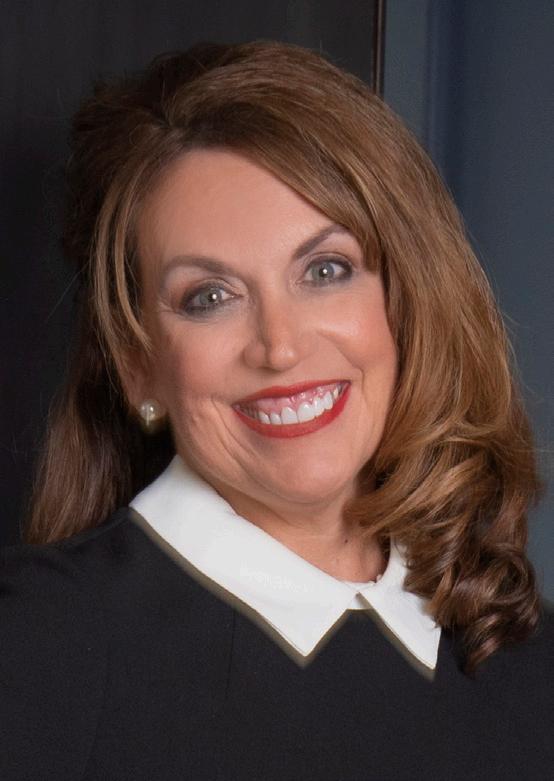
Also being awarded at the luncheon will be the Nelson Summit Award, named after Junior Achievement’s founder and Hall of Famer Sheffield Nelson, which goes annually to a company that has shown a deep commitment to educating Arkansas’ youth. This year’s honored company is Relyance Bank, which joins the likes of Walmart, Acxiom, Windstream and Simmons Bank on the roster of recognized companies.
“We are extremely excited to receive this great honor,” said DeAnna Korte, assistant vice president of marketing and communications. “Relyance has a history of partnering with nonprofits in the community, whether it’s through financial support or volunteerism. JA’s mission of preparing students for their futures through financial literacy is so important, and it aligns with our mission of dedicating the time and talent of our staff and our bank into the communities where we live and
“We couldn’t do it without this amazing team of volunteers from Relyance Bank. By sharing their experiences, they become role models for our future workforce.”
For nearly four decades, Junior Achievement of Arkansas has worked to bring financial and economic concepts into schools, teaching the basics of employment, financial literacy, workforce coaching and entrepreneurship.
Volunteers are equipped with classroom materials, which they deliver to students in kindergarten through high school throughout the state.
Griffin said he was humbled to have been recognized by the organization, adding that it has been his ambition to play a role in improving the Natural State for children and youth.
“As Arkansas attorney general, I have been able to put money from the attorney general’s office settlement funds toward causes that have a positive impact on young people,” he said. “Organizations such as Junior Achievement, child advocacy centers and Women & Children First [in Little Rock] are just a few of the many groups that impact children now and for future generations.
“For me, this mission is not just a reflection of past efforts — it remains deeply personal. As the father of a 17-year-old, a 15-year-old and a 7-year-old, I see the real-time impact of investing time, love and education in a child’s life. It’s not just about helping other kids; it’s about shaping a future where all children have the support and encouragement they need to thrive.”
By

Nate Monceaux did not know the University of Arkansas at Pine Bluff existed one year ago.
“I was actually at a NAIA program, [Loyola University] in New Orleans,” said Monceaux, a junior right-handed pitcher on the UAPB baseball team. “I had no clue about this place.”
That makes Monceaux, a “yes sir, no sir” kind of guy majoring in biochemistry prepharmacy, an ideal fit on the Golden Lions roster.
“I was like, ‘Where?’” said first year head coach Logan Stout, recounting the first phone call he received from Chris Robinson, UAPB’s vice chancellor for intercollegiate athletics.
There is not a story in all of college baseball quite like what is happening at UAPB, where a cast of newcomers have converged on the downtrodden program with plans to spark what almost surely would be the biggest turnaround in Division I. There is a feeling of experimentation mixed with confidence for the Golden Lions, and it starts with Stout, who is in a company of one when it comes to his background.
“I’ve been diversified my whole life,” Stout said in what could be the understatement of the year.
It could be said that Stout got sidetracked. Growing up in a hardscrabble section of Dallas, baseball was Stout’s obsession starting at a young age, and he parlayed that obsession into an allAmerican season at Division III University of Dallas. His postgraduate plans included pitching in the independent leagues and building a career in college baseball with a coaching job at Dallas Baptist University, where the baseball program competes in D-1.
“It was never in the cards for me to step away from college coaching,” Stout said.
Stout was learning something about himself though. He was equal parts charismatic and chatty, a Type-A people person and a natural leader. He started a business on the side to make ends meet and discovered he was a born entrepreneur. More businesses followed. He capitalized on the deregulation of oil and gas in the early 2000s and headed up a nutritional company called IDLife. He also started doing speaking engagements on the side until he looked up one day and was booked for more than 200 appearances a year. He authored two books, became a confidant of leadership author John C. Maxwell and even appeared on the television show Shark Tank.
And yet…
“All the stuff just kind of happened so fast,” Stout said. “I kind of woke up one day, and I was like, ‘Holy cow, it’s been two decades,’ and I love college baseball.

“This is going to sound twisted and weird, but I looked at my wife, and she looked at me, and I said, ‘This is it.’”
— Logan Stout, UAPB
It’s my favorite thing.”
Stout had managed to keep his hand in the game by founding and coaching the Dallas Patriots, a travel-ball team. Texas is rich in baseball prospects, and it was not too long before Stout built a network of college coaches who mined his teams for potential players. His circle of friends grew to include names such as Vanderbilt coach Tim Corbin and Tennessee coach Tony Vitello, and Stout even started fielding calls from athletic directors wanting to pick his brain on their next baseball hires.
Still, with a background that was more business than baseball, Stout knew the doors to college coaching would not necessarily fly open. He would need to start small and build up, just as he had done with so many businesses. That is when Torii Hunter entered the picture.
Hunter, a Pine Bluff native and former Major League All-Star, had partnered with Stout on some investments and knew he was itching to coach. Given that UAPB’s baseball stadium bore his name and was made possible by his donations, Hunter wielded some influence over the Golden Lions’ next coaching hire and encouraged Stout to throw his hat into the ring.

interest in the program’s success.
Stout was prepared to start at the bottom, and that is what he got. Former coach Carlos James had coached at UAPB with some success for 14 years but left following an interview with the Pine Bluff Commercial in which he called out the university for its dearth of commitment to the baseball program, citing the lack of scholarship money and operating funds.
Stout did not care. When Robinson called
about the UAPB job, he was sold — and he was prepared to help fund the program himself.
“I want to take a program that is in desperate need of some love, in desperate need of some funding, desperate need for a turnaround,” Stout said, “just like in business.”
He got his wish. James’ criticism of the program may not have sat well, but he was not incorrect. Stout was handed the keys to a program with only four scholarships and an operating budget of $30,000. The players had been wearing the same uniforms for years, and the field, once a source of civic pride, was in a major state of disrepair.
“This is going to sound twisted and weird, but I looked at my wife, and she looked at me, and I said, ‘This is it,’” Stout said. “The field, you couldn’t even see it. There were weeds. I mean, the whole place was a train wreck. The entire place was an absolute train wreck.”
So was the roster. Stout was hired in July, late for the hiring cycle, and his early days were spent holed up in a room, banging out phone calls to players who were still looking for a place to play.
“I got a call from Coach Stout, and he talked to me for about an hour,” Monceaux said. “Just to hear that over the phone, someone believing in me that much, it was really refreshing.”
Stout did his research before making phone calls, and he knew what he was up against. Type “Pine Bluff, Arkansas” into a Google search, and be prepared for item after item documenting the city’s economic and crime woes. Stout admitted it all threw him for a loop until he actually arrived in town.
“If a kid googles Pine Bluff, Arkansas, it’s not going to be pretty,” Stout said. “Pine Bluff is such a bluecollar, down-to-earth, nonmarketing city. They’re just like, ‘Listen, come meet us. You’ll fall in love with us,’ and they’re right. I actually bring it up in recruiting. I say, ‘Listen, I made the mistake of googling Pine Bluff myself.’ I said to Torii, ‘Dude, no way,’ and he starts laughing and says, ‘Yeah, it’s not what you think. My family still lives there. My best friends still live there.’”
Stout’s recruiting pitch centers on the people his players will meet both on campus and around town.
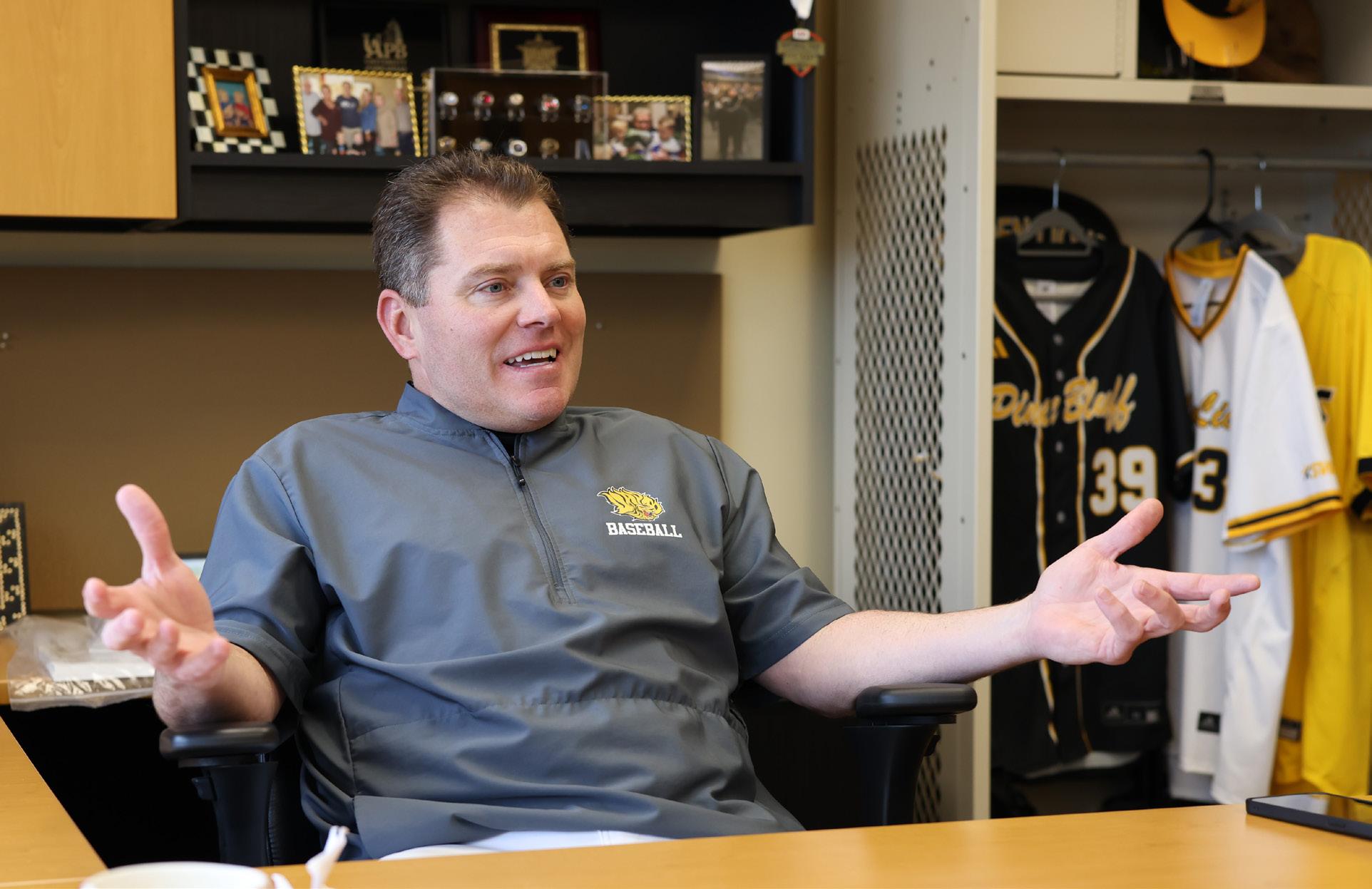
To hear the players tell it, it is working.
“When I came on my visit here, all the people, I love them,” Monceaux said. “They were all so nice, and I really like the campus.”
As for the field, improvements are popping up at a breakneck pace. New bullpens have been installed along the first base line, and construction has begun on a new hitting facility, as well as a “party deck” adjacent to the stands. The weeds are gone, everything has received a fresh coat of paint, and the players are decked out in crisp new uniforms and caps.
Stout is aware of how all that may look from the outside, what with a well-heeled entrepreneur coming in and sprucing up the program. Yet he said his deep pockets never factored into the hiring process and that he never promised a cent to UAPB.
“I don’t think it was a factor,” Stout said, citing his work with the Patriots, as well as his time as a professional scout. “In the baseball world, a lot of people don’t know I’m one of the winningest coaches in amateur baseball. If you look at a resume, I’ll put mine up against anyone’s. I didn’t commit to giving one payment to this program. Now we have. Obviously, with a $30,000 operating budget, this stuff doesn’t happen on its own.”
Yet most of the improvements have come about from Stout’s own fundraising efforts. He wasted little time in connecting with community stakeholders such
Stout, who counts Vanderbilt’s Tim Corbin and Tennessee’s Tony Vitello among his close coaching contacts, said he is committed to the Pine Bluff community.
as Sissy’s Log Cabin and Saracen Casino Resort, and his positive message regarding the city has struck a chord with area businesses and UAPB alums.
“If you’re looking for beautiful people with hearts the size of Arkansas, you’ll find them here,” Stout said.
Talk to Stout’s players, and one finds all the money and facelifts are beside the point. Among the few who remain on the roster from a year ago, there is a feeling of camaraderie and empowerment that was missing in the past.
“He wants us here,” said Jaylon Nauden, a senior infielder out of Olympia Fields, Illinois, “and he says, ‘I love you.’ I was like, ‘That’s crazy. You never even met me, but you say you love me?’ but I can really feel it. He shows that he loves every single one of us.”
To consider Stout as just an entrepreneur looking for his next challenge is beside the point. He is back to being what he was meant to be all along — a college baseball coach. The fact that he had to arrive at the unlikeliest of places to make that happen just deepens the affection he has for the players who have trusted him and the town that has embraced him.
It is a love affair that goes both ways.
“We want to live here,” Stout said. “If I’m very honest with you, I want to live here. I mean, for us, it’s not just the baseball team. We want to try to make an impact in the community.”


By Alex Hardgrave
One may have seen them. People on courts smaller than a tennis court, playing a game with small paddles and a plastic neon ball. They are playing a sport called pickleball, and even though it has a silly name, it has become a seriously big deal.
Pickleball is a paddle sport that combines elements of tennis, badminton and table tennis. Originally invented in 1965, the sport was first played with pingpong paddles, a badminton net and wiffle balls.
In the past few years the sport has exploded — as of 2023, there are 48.3 million pickleball players in the U.S, the Association of Pickleball Players states.
It is not just the number of players who have grown. Pickleball gear is also now a monster industry, and one of the biggest players on the court is Vulcan Sporting Goods
Co., a company based in Hot Springs.
“There are only a handful of top brands,” said founder and CEO Vince Signorelli. “Arkansas has its own brand, and that’s pretty cool.”
Even though Signorelli was an East Coaster originally, he began to look to relocate somewhere warmer, and Hot Springs checked all his boxes.
The headquarters can be found at Mid-America Industrial Park in Hot Springs.
“We’ve put down very strong, deep roots,” he said.
Signorelli saw an untapped market for pickleball equipment when he first learned about the sport. He said he is proud Vulcan got in on the ground level of the boom. Since then, the market has become saturated with pickleball equipment companies. In 2024, USA Pickleball registered 476 new manufacturers and brands.
“We were very fortunate to be one of the founding brands,” he said.
Around 2018, Vulcan launched the largest pickleball equipment line at the time, and in 2023, the company launched the Vulcan VPRO Flight Outdoor Pickleball. Since 2024, that ball has been the official ball of the Professional Pickleball Association and Major League Pickleball.
“It puts us in a very special place,” Signorelli said.
Creating the ideal pickleball ball was not as simple as it seemed. While it may look similar to a wiffle ball with its holes, Signorelli said a pickleball is a “far cry” from one.
A team of designers worked to create a ball that had the right amount of bounce and consistent flight. The neon color also makes it easy to see when being hit, improving the game experience for players and spectators alike.
“There are just a lot of details that make this a super high-quality ball,” he said.
Each one is made of polymers that are formed into molds. After the sphere is made, 40 holes are precision-drilled into the ball.

Whether it is a hobby to keep an active lifestyle or one is trying to go pro, “it’s a game for life.”
— Vince Signorelli, Vulcan Sporting Goods


Signorelli first encountered pickleball around 2015 or 2016 while at a YMCA.
“It didn’t take long as an entrepreneur to figure out that this was an interesting new sport and an exciting one and, potentially, an opportunity for our company,” he said.
In 2018, the company built Vulcan Pickleball Park, a public court at the headquarters. At the time, there were not a lot of dedicated pickleball courts being built.
“Everyone thought we were crazy,” he said. “Of course, now courts are everywhere.”
Indeed, pickleball has grown dramatically. Now more than 68,000 pickleball courts exist in the U.S., according to the Pickleheads database. The sport has been the fastest growing in the U.S. for the past four years, participation increasing by a staggering 223.5 percent over the past three years, according to the Sports and Fitness Industry Association.

Indeed, pickleball has grown dramatically. Now more than 68,000 pickleball courts exist in the U.S., according to the Pickleheads database.
“Certainly, things have changed since,” Signorelli said.
One key reason for the sport’s success is its social nature, Signorelli said. Pickleball fosters an environment in which people are happy to help each other learn and improve. It is also easy to pick up and improve quickly compared to more complex sports.
He said the other factor was good timing. The sport was just coming into vogue in 2020, when people were looking for more outdoor activities.
“I’ve never seen anything like it,” he said. “It just continues to grow.”
Initially, the sport was popular with older generations, but Signorelli has witnessed a dramatic shift. He said when Vulcan first got into the business, the median age of players was probably 55. Now the average pickleball player is 35, according to the Association of Pickleball Players.
“It’s gotten huge at the college level,” he said. “There are a huge amount of high school players. It’s getting adopted by young people, and they’re really making it their game.”
While pickleball is a fun hobby for some people, there is also a whole world of professional players. The pro tournaments are “quite a spectacle,” as Signorelli described them.
Vulcan partnered at the inception of the PPA tour when it launched, and the tour sponsors some of the pro players.
The tournaments can have a couple thousand participants, both pro and amateur, and 8,000 to 10,000 spectators filling up stands while games run on about 30 courts, although the numbers vary based on the tournament. Many sports channels have even started to broadcast the games. Whether it is a hobby to keep an active lifestyle or one is trying to go pro, “it’s a game for life,” Signorelli said.





By Alex Hardgrave
Dry January, sober curious, California sober — every day, there seems to be a new phrase to describe the same phenomenon. People are drinking less alcohol.
An NCSolutions poll found nearly half of Americans, 49 percent, are trying to drink less alcohol in 2025. That is a 44 percent increase from 2023.
There are myriad reasons more people are drinking less or no alcohol these days. It reflects an overall physical and mental health prioritization or even a way to save money.
According to the poll, 62 percent of people are drinking less to improve their physical health, while 55 percent are planning to drink less in 2025 to save money, and 1 in 5 Americans feel drinking alcohol is a habit they can no longer afford, according to the poll.
Gen Z is spearheading the trend at 65 percent saying they are trying to drink less in 2025.
To cut back or stop drinking, many are turning to nonalcoholic beverages, and Arkansas liquor stores and alcohol producers are responding to the trend.
Zero is a nonalcoholic sake that Origami Sake in Hot Springs released recently. It is the only NA sake sold in the U.S. right now.
Ben Bell, vice president at Origami Sake, said Matt Bell, president and CEO, came to the team and asked if it could create one, and the team had to experiment with it to get it just right.
“We’d never really done that, so we had to think through how to do it,” Ben Bell said. “We really had to be creative.”

In the end, Origami did not want to make an alcoholic sake and dealcoholize it, which is how most NA wines and liquors are made and can affect the flavor profile of the sake. Instead, the Origami team decided not to add yeast, so the sake never became alcoholic in the first place.
Since taking Zero to market, Bell said the response has been very positive.
“As we expected, people are looking for ‘nonalcs’ in a way that sort of lines up with the numbers in the market,” he said.
Bell has been in the beverage industry more than 15 years and said companies never used to think about NA beverages, but there has been unprecedented growth.
Origami is lucky because while sales of beer, wine and liquor have been down overall, sake sales have been up. That, coupled with NA options selling better, has caused the market to be great for Zero.
Bell said it is good to have NA beverage options like Zero both for people who used to drink and do not anymore or drink less and for people who have never drank, which is a growing number of younger people.
“I think that’s a positive trend,” he said.


Bell has been in the beverage industry more than 15 years and said companies never used to think about NA beverages, but there has been unprecedented growth.
Being able to have something in one’s hands in a social setting has eliminated a lot of pressure one may feel during a social situation when not drinking, Bell said. He has also noticed a trend of people turning to cannabis products instead of alcohol.
One growing sector is infused drinks, including those with THC, Delta-9 THC, CBD or adaptogens.
Twenty-six percent of respondents to the NCSolutions poll said they plan to try a THC and CBD-infused drink in 2025, but that number rises to 38 percent when looking at just the Gen Z population and 37 percent when looking at the millennial population.
“It’s similar to the effects of drinking without the damage to your liver and blood sugar,” said Dustin Curtis, vice president of the Goods, a division of Interstate Holdings, owned by Steve Landers Jr. “I think people are finally waking up and realizing, ‘Hey, this is something people have done for a long time.’”
The Goods offers Delta-9 THC gummies for mail order. It has four different “vibes” of gummies, meaning they are formulated for different experiences, including Laugh, Snooze, Chill and Boost in a variety of flavors.
Curtis said there is no longer the stigma that used to surround taking edibles.
“You can have a Laugh or have a Chill and hang out with every-
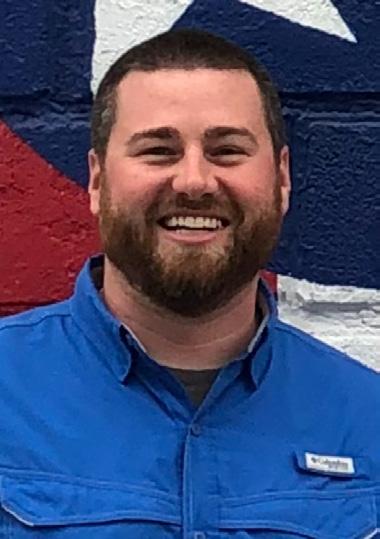

Flyway has experimented with different flavors of NA drinks. (Photo courtesy of Flyway Brewery)
[Foster] added that he himself “needed and wanted” an alcohol alternative, so the inspiration and drive to create and sell the product is personal for him.
one and get up and be a productive adult the next day,” he said.
The Goods is also getting ready to release mocktails infused with Delta-9 because of the demand for such products.
The mocktails will also have no artificial flavors and be low in sugar, an issue some infused drinks and mocktails on the market encounter, Curtis said.
“We’re trying to go real healthy on that side too,” he added. “I think people are thinking about that more.”
Similarly, Arkansas-based brewery Flyway has offered a Delta-9- and CBDinfused drink called Ave since early last year.
At first, the establishment offered Ave in cans that could be bought in the tap room or in four-packs to be taken home. Now Flyway has Ave on tap.
“I feel really strongly about it,” founder Matt Foster said. “I think it’s a wonderful social tonic. It’s a relaxation beverage.”
Foster said Flyway has experimented with various flavors, including lime, lemonade, watermelon and black cherry.
He added that Flyway’s creation of the drink was not a response to lower beer sales. The business has seen an increase in sales every year since opening in 2013.
“Beer isn’t going anywhere,” Foster said.
Still, the company wanted to create Ave to innovate and offer patrons an alternative to alcohol. He added that he himself “needed and wanted” an alcohol alternative, so the inspiration and drive to create and sell the product is personal for him.
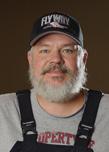

Kaitlynn McKenzie, team manager at Flyway, said lots of people have been turning to Ave to drink less alcohol but also because they are just interested in a new product that is gaining so much traction.
Liquor stores are also responding to the huge push for NA drinks.
Colonial Wines & Spirits in Little Rock offers a myriad of NA beer, wine and cocktails, team member Chris Kotoun said. As the popularity of NA drinks has exploded, Colonial’s offerings have expanded.
“Whether it’s to include their friends that don’t drink or they’re doing it for health-conscious reasons, the quality and quantity of what we get is growing every year,” team member Robert Giles said.
Kotoun said it should be noted that when someone is buying a nonalcoholic beer, wine or spirit, the company is allowed to include .5 percent ABV and still market the drink as nonalcoholic. Unless the packaging says 0.0 percent, one cannot assume the beverage is fully alcohol free.
He said he thinks the NA trend stems, in part, from a correction of people drinking a lot of alcohol during 2020, which was when the industry saw its highest alcohol sales.
Kotoun added that there is an overall acceptance of sobriety that there used to not be, saying that everyone is “wired differently” and has their own mindset about alcohol consumption and that it is good to have options.
Jonathan Looney, owner of O’Looney’s Wine & Liquor in Little Rock, said with the popularity of Dry January and Sober October, he has seen more clients “dabbling in the sober experience and space.”
He said many people come to him for recommendations of NA drinks based on diets, health and the like.
The store has offered NA beer since they opened 25 years ago, but he noted there are more varieties now.

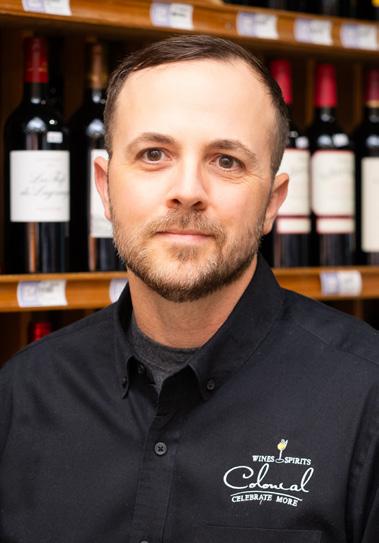
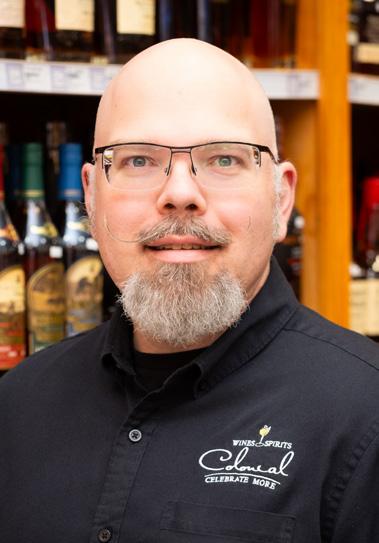

“It’s always been a strong category,” he said. “It’s better represented and better quality than has ever been available before and since.”
However, Looney remains cautious about what he offers.
He said O’Looney’s still only offers one NA wine because he has tried many but has not found many at the standard he wants to offer for various reasons. He does not want to overwhelm customers with too many choices, he said, so he is selective about the options he has in store. He added that he wants everything he provides to be both healthy and have a good story behind it.
“We are standing at the forefront to discern quality for our clients,” O’Looney said.
Mary Zunick, cultural affairs manager at Visit Hot Springs, has, in her free time, started seeking out and posting on social media about available mocktails in the area. Her turn to mocktails began about a year and a half ago, after her husband experienced health problems and the couple decided to cut back on alcohol consumption.
“We enjoy going out for dinner, getting a drink and even having a cocktail at home,” she said. “It is just part of our routine.”
The Zunicks have not completely stopped drinking alcohol, she added, but they switch it up for alternatives often, and she started seeking out mocktails.
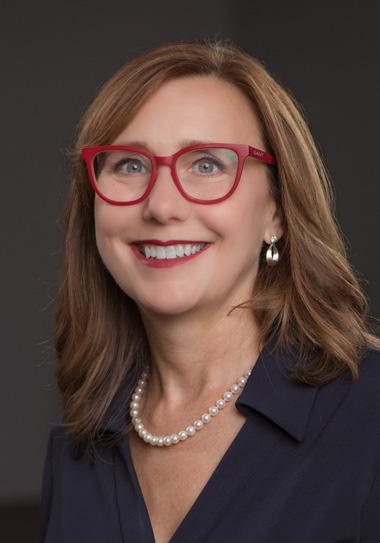
Polling finds that more Americans are trying mocktails and other NA drinks.
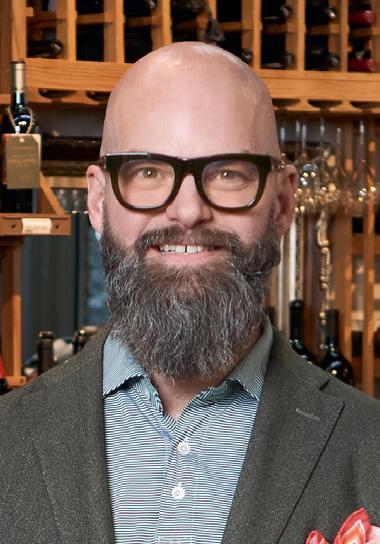
Since asking for mocktails at restaurants, Zunick said she has noticed that many are offering more.
She said it is also great to have mocktails when one is entertaining at home “just to be a good host and have something for everyone. No one wants to feel like they’re a problem or an exception.”
She said one of her favorite places right now for mocktails is Oaklawn in Hot Springs. Another is 501 Prime in Hot Springs, which she said has a good alternative to a paloma.
She said some mocktails, especially canned ones, which she drinks at home, are too sweet. She suggested if one thinks a drink sounds too sweet, ask restaurants to cut back on the simple syrup. For the canned ones, she likes to add lime to “freshen it up.”
“I encourage people just to try them,” she said.
[Zunick] said it is also great to have mocktails when one is entertaining at home “just to be a good host and have something for everyone. No one wants to feel like they’re a problem or an exception.”
It sits just off the main drag in downtown Hot Springs and, therefore, somewhat removed from the hustle and bustle of Central Avenue, but, in many ways, the legendary Vapors nightclub represented the epicenter of the Spa City’s infamous run as Vegas of the South in the mid-20th century.
By the time the club opened in 1960, Hot Springs had long been considered a sanctuary for gangsters from “up north,” an unofficial neutral ground where members of the mob could escape family politics to recharge and make a little — or a lot of — bank on the side. During the 1920s, as Major League Baseball’s spring training took root in Hot Springs, the Spa City became haven for notorious gangsters such as Pretty Boy Floyd, Lucky Luciano and the coup de gras of publicenemies-Nos.-1 himself, Al Capone.
By Mark Carter
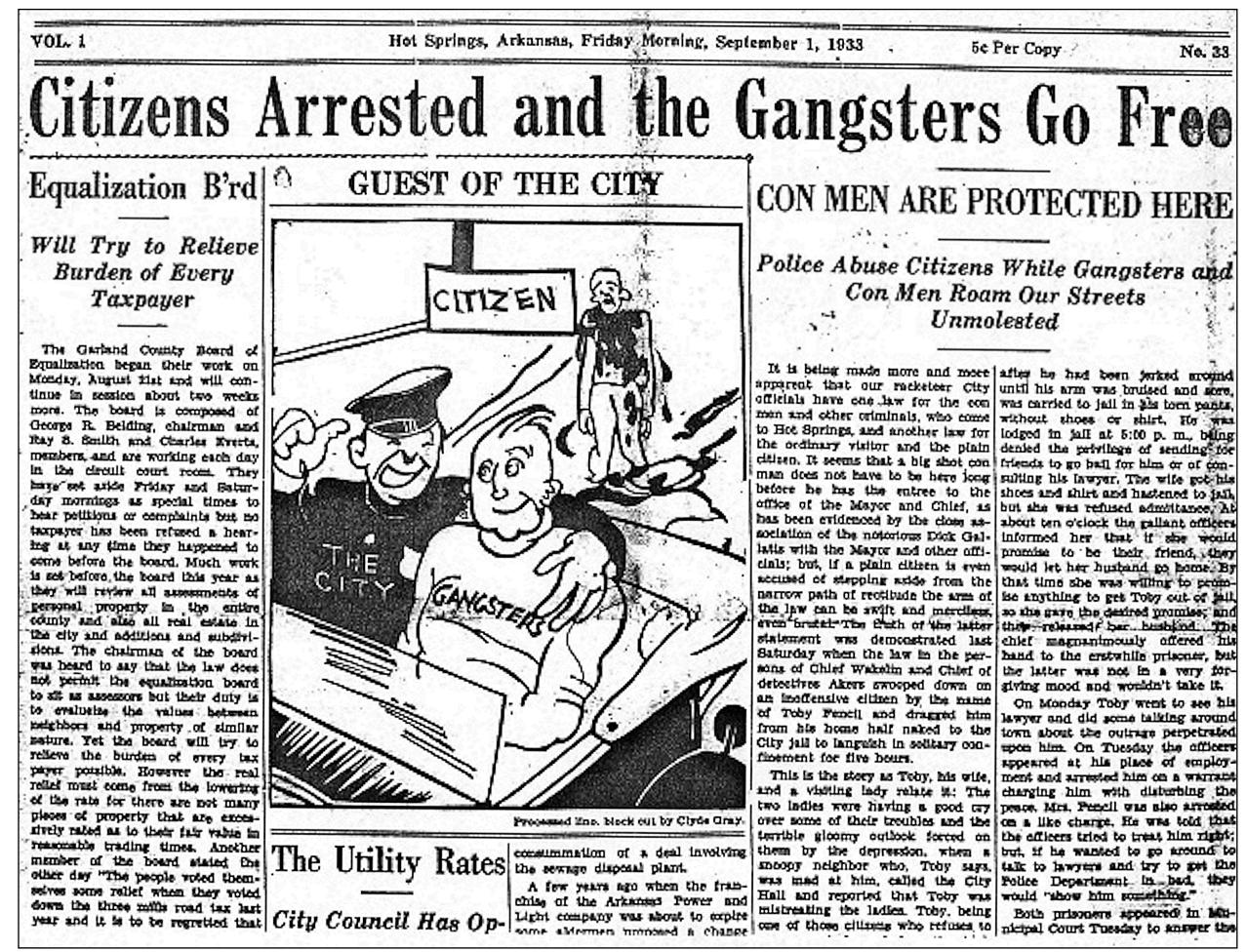
Print ads hawked the Vapors as the best club of its kind in the region, top, and local newspaper headlines often lamented the perceived lawlessness in Spa City with regards to illegal gambling. (Images courtesy of Garland County Historical Society)

The July 22, 1939, issue of Liberty magazine, then the second-most-read publication in the United States behind the Saturday Evening Post, published a story about Hot Springs and its ties to organized crime. The article was titled “Hell in Hot Springs” and billed as “a story of one town’s corruption, taken from the G-Men’s files.”
The Vapors, so named to conjure up images of the mist resulting from the city’s famous hot springs, was opened by one such noteworthy mobster, Owen Vincent “Owney” Madden, owner of the famed Cotton Club in Harlem, with local businessman Dane Harris. As did most clubs in the Spa City, the Vapors operated a casino behind a wall separating the gambling parlor from the lobby. Officially, the Vapors and other clubs in town were simply establishments for eating and drinking — the casinos were not listed in the books.
Law enforcement and local elected officials were mostly complicit in the operation of illegal gambling, prostitution and open bars throughout the city during the first half of the 20th century. After all, the clubs made a lot of people on both sides of the law a lot of money. For its part, the Vapors drew a high-end crowd, and musical acts there included the likes of Dean Martin and Tony Bennett.
The Vapors quickly distinguished itself. The
Encyclopedia of Arkansas states that Bennett first sang his acclaimed hit “(I Left My Heart) In San Francisco” at the Vapors. One night during rehearsal before a show, Bennett sang the song as a trial run for an upcoming show at the Fairmont in San Francisco. A bartender, setting up for the night’s show, told him if the song was recorded, he would buy the first copy.
“The Vapors appeared at the height of the illegal gambling era in Hot Springs and later became one of the most visible symbols of its end,” said Elizabeth Robbins, executive director of the Garland County Historical Society. “The famous, the infamous and the ordinary people who gambled and entertained and worked there helped create a unique time in our city’s past, one whose glamor still fascinates people today.”
By the mid-1960s, elected officials across the country were less willing to look the other way when it came to organized crime. The Spa City’s ascent (or descent, depending upon one’s perspective) into Vegas-like status took a hit with the appointment of Robert F. Kennedy as U.S. attorney general and the election of Winthrop Rockefeller as Arkansas governor.

The Vapors looked the part of Vegas showroom, above and below, while newspaper photographers recorded the aftermath of a 1963 bomb explosion at the club that exposed illegal slot machines and gaming tables. (Photos courtesy of Garland County Historical Society)


The Vapors’ crippling blow, however, occurred the morning of Jan. 4, 1963, when an explosion leveled parts of the building, exposing the casino to the public and injuring 12. A photo of the club’s gaming tables and slots was published on the front page of the old Arkansas Gazette the next day, revealing the state’s biggest unkept secret. The writing, as it were, was not so much on the wall as it was on the front page of the Gazette, the biggest “wall” of them all in Arkansas. Other local clubs continued to operate illegal gambling for a few more years, but the tide had turned.
The Vapors was restored and carried on as a nightclub only, going through various iterations until the property was sold to a church in 1998. The club is back today as the Vapors Live, a nightclub, restaurant and music venue that harkens back to the Spa City’s infamous days as a home away from home for organized crime.

“The famous, the infamous and the ordinary people who gambled and entertained and worked there helped create a unique time in our city’s past, one whose glamor still fascinates people today.”
— Elizabeth Robbins, Garland County Historical Society
By Doug Crise
The Arkansas state legislature’s push to rid the state’s classrooms of cellphones is a wonderful proposal that should have happened 10 years ago at the very least.
Gov. Sarah Huckabee Sanders kicked off the 2025 legislative session by announcing the Bell to Bell, No Cell Act, which would ban smart phones and similar electronic devices, such as smart watches, from Arkansas public schools beginning in the 2025-2026 school year. The rapid response on the statehouse floor made it a question of “when, not if,” and the act was signed into law in late February.
This won’t put Arkansas at the forefront. At least 19 states have already enacted some kind of cellphone ban, the popular option being Yondr pouches, sealable pouches that prevent students from accessing smartphones while on school grounds.
Whatever form Bell to Bell, No Cell eventually takes, it is a rare piece of educational legislation from Sanders that really invites little discussion. This is not the LEARNS Act, which still sparks heated debate more than a year after its introduction. For a change, Arkansans can unite on the same side. There is scant argument to be had here. This needed to happen, and it needed to happen years ago, full stop.
I know a little something about this.
a block schedule. And each student has their cell phone. Ready, set, go.
Schools have existing cell phone rules, of course. Normally it is some variant of, “If the student has a cell phone out, it can be confiscated.” I’ll let you in on a trade secret: Some, but certainly not all, educators have long since given up the fight. I was one of them.
There is plenty of anecdotal evidence to suggest that teens’ dependence on their smartphones has morphed into a full-blown addiction. I can only speak to my own skirmishes with students. I’m not talking about the “bad kids.” I’m talking about studious, affable students, kids who would never run afoul of classroom rules, reacting defensively and sometimes aggressively to something as simple as, “Can I have your phone so you won’t be distracted?”

I spent the past decade as a high school English teacher, primarily in Louisiana. I have also been a coach. Boy, oh boy, have I been a coach. Baseball. Football. Girls basketball. Volleyball. I was even asked to serve as an emergency golf coach but begged off due to barely knowing which end of the club goes where. I’ve coached in state semifinal games, double-overtime games and fierce cross-town rivalries.
Absolutely none of it was as emotionally and mentally exhausting as trying to teach in the smartphone era.
School administrators call it “student engagement.” It is the expectation that, should an administrator enter the classroom, students will be on task, fully focused and speaking only about the subject matter at hand.
Consider that for a moment. Imagine standing before a classroom of 24 to 30 adolescents of varying backgrounds, personalities and learning styles. Teach whatever you want. Let’s say it’s Shakespeare’s Macbeth (one of my favorite books to teach.) You’ve been told by your supervising administrator that during surprise “walk-throughs,” the expectation is 100 percent student engagement. You must hold their attention for 60 minutes, 90 if you’re on
Administrators, content coaches and the myriad “educational consultants” out there can preach student engagement all they want. There is no existing strategy that can match up with a teenager’s smartphone.
What exists as of now — and what makes the Bell To Bell, No Cell Act so important — is an environment where already-overworked educators are pressured to be as entertaining or “engaging” as possible just to contend with the siren song of cell phones. The problem with this is we’re not providing the tools students need to function in the real-world workplace.
During my teaching career, it was made clear to me that if a student is sleeping in my classroom, that’s my problem. Kids on their phones? A clear sign the students are not engaged enough. But that backfires when we send high school graduates into a world that could care less whether they’re “engaged” or not. I often told students complaining of sleepiness or boredom that neither college professors nor workplace supervisors will care a whit about whether they are being entertained. Yet thanks to smartphones, teachers are being pushed to be entertainers.
Don’t get it wrong. Over 10 years, I never knew a single teacher that did not strive to make their lessons as lively and interesting as possible. But driving educators to keep students in rapt attention fails to teach the personal responsibility and self-control they will need in a world that won’t bother with Yondr pouches. If we don’t condition students to function without their smartphones now, we’ll be getting a sort of societal credit card bill in the mail years down the line, and the price will be higher than what anyone can afford.

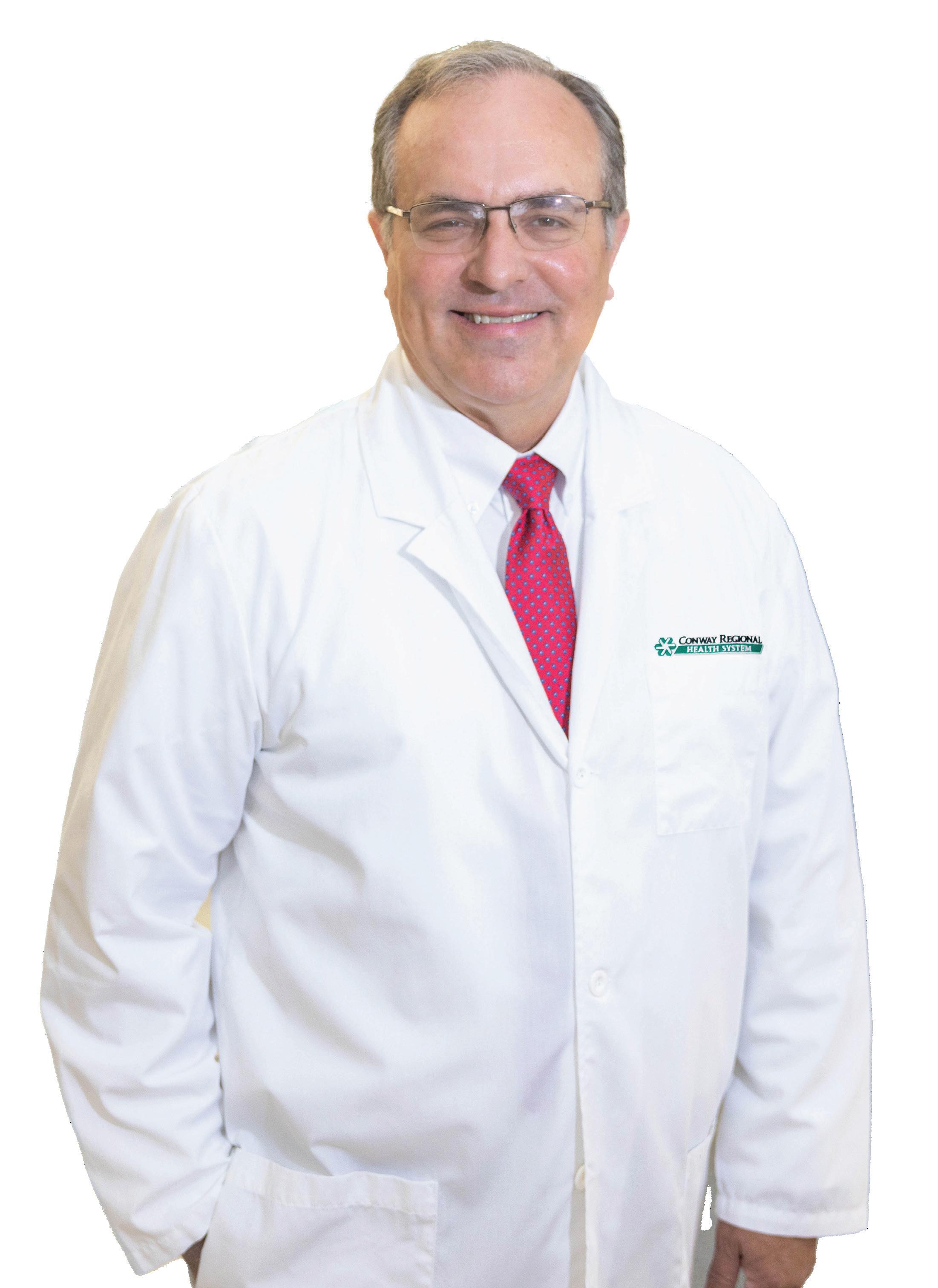
At Conway Regional, our team brings together key service lines, providers, and technologies to create patient experiences that are highly intentional and refreshingly personal. At Conway Regional Ear, Nose, & Throat Clinic, we advocate for our patients to make informed choices about their healthcare. From ear infections, balance disorders, pediatric ENT issues, and allergies, Dr. Scott Ballinger blends access with excellence to provide high quality, compassionate care.

